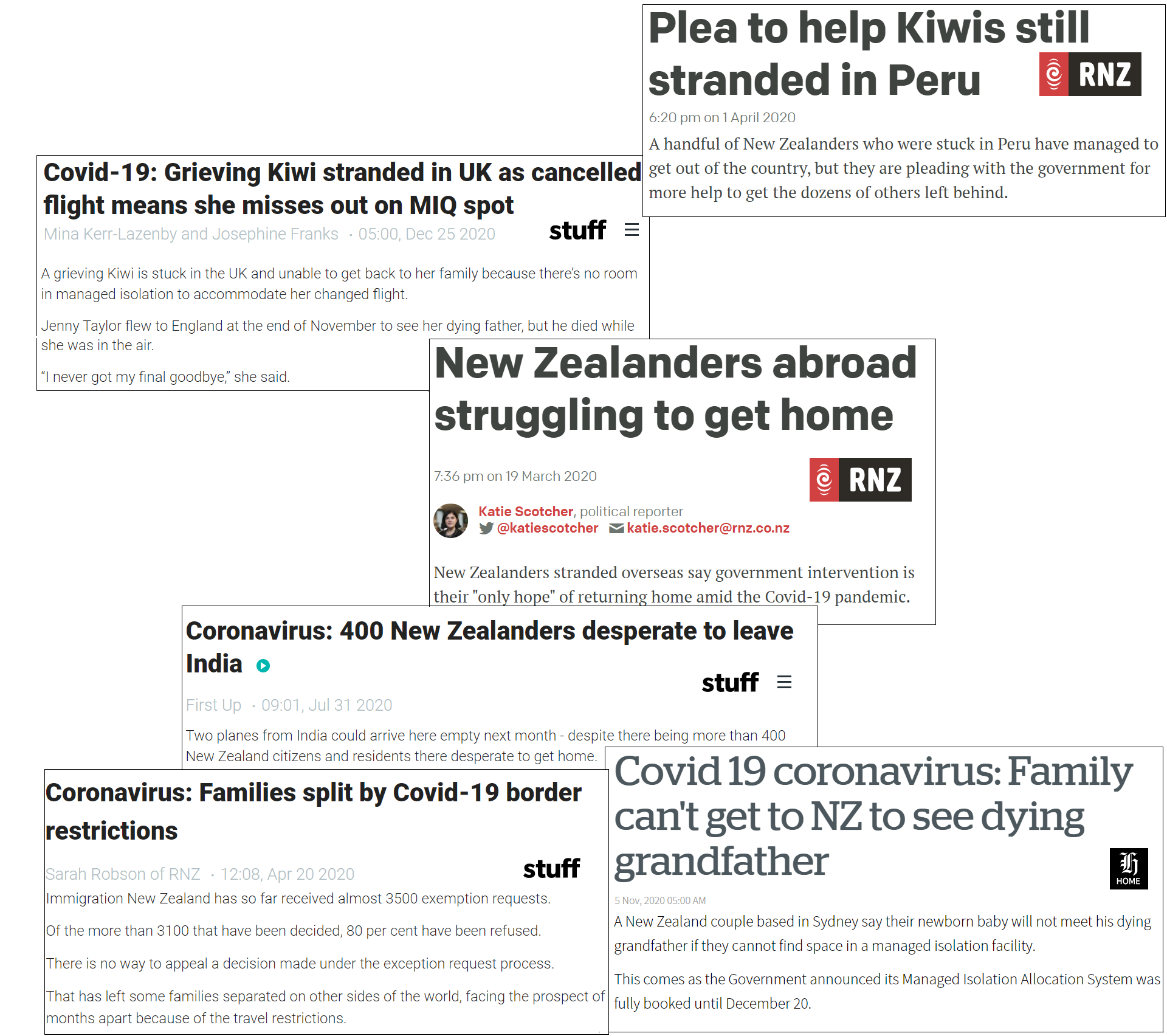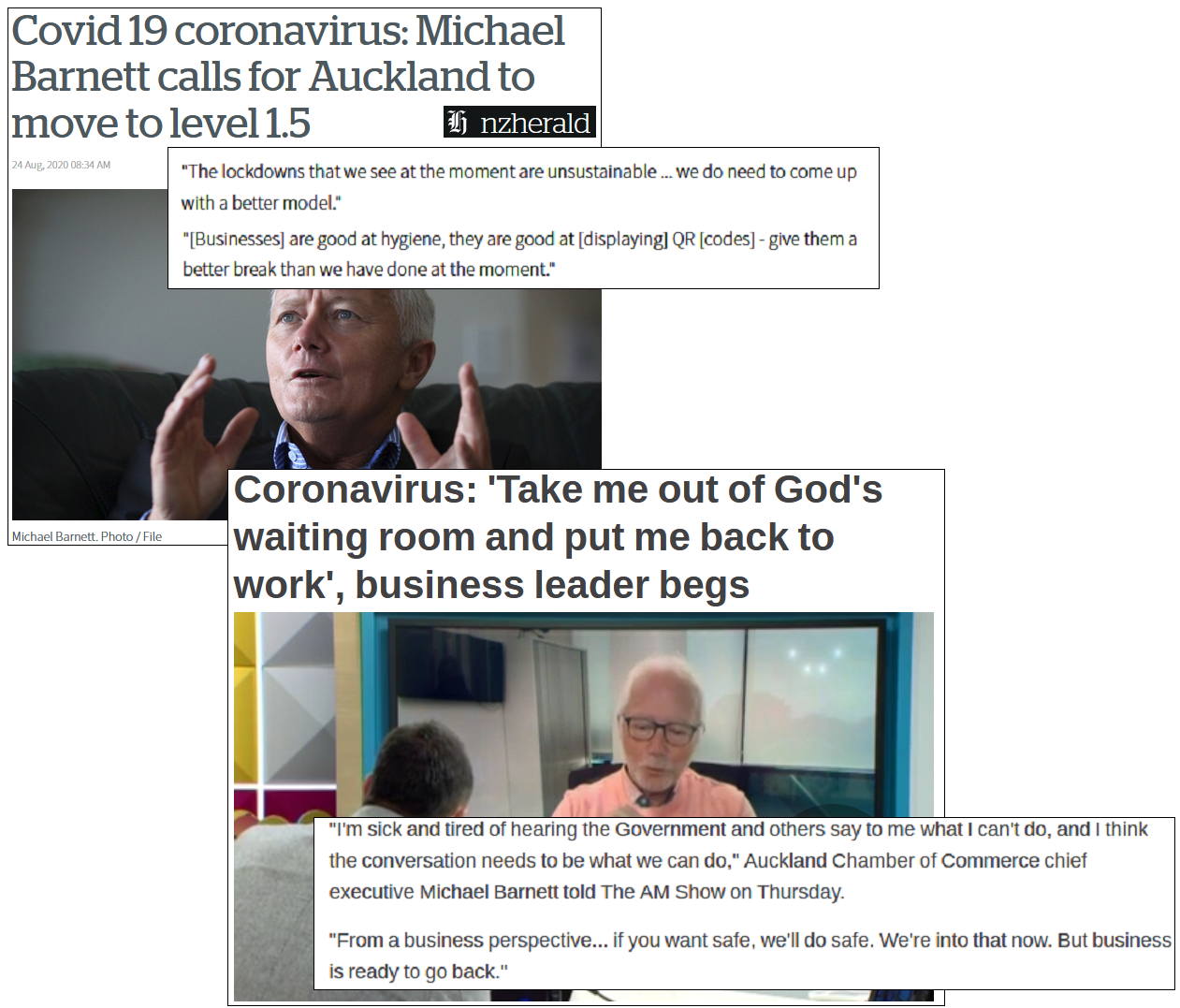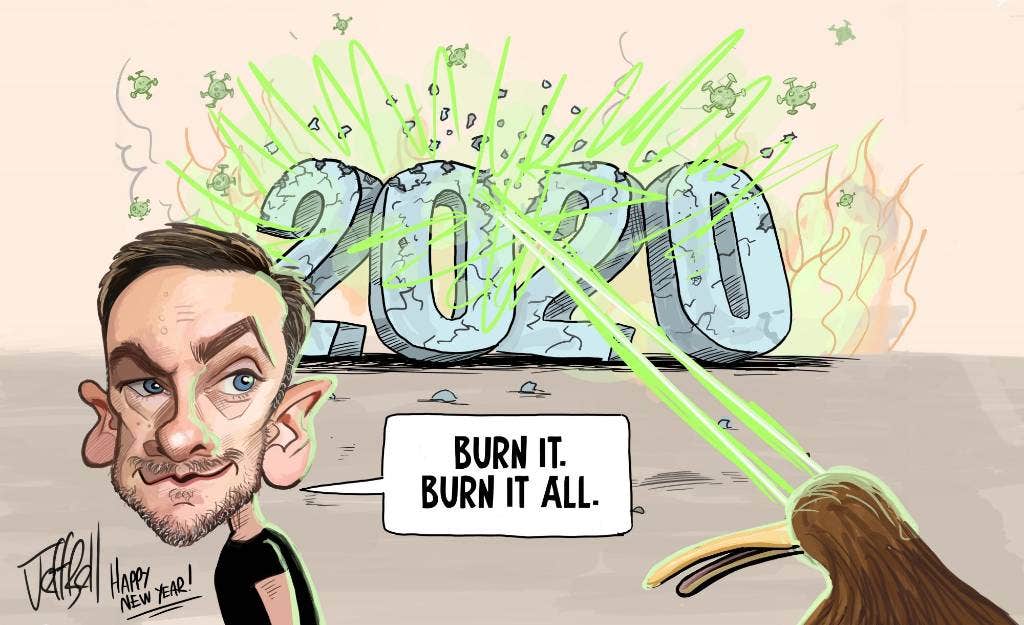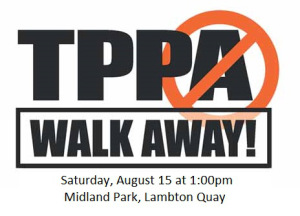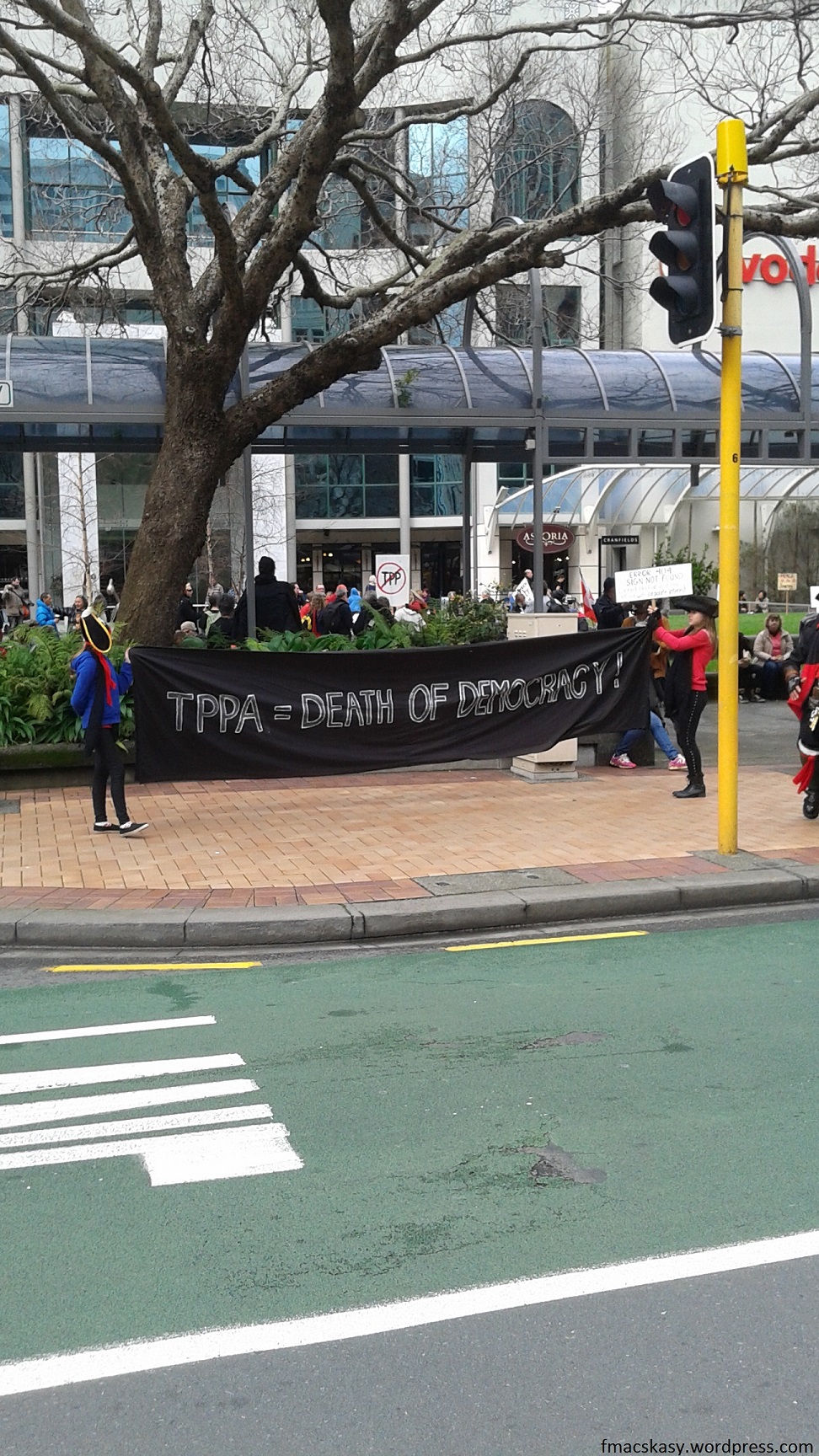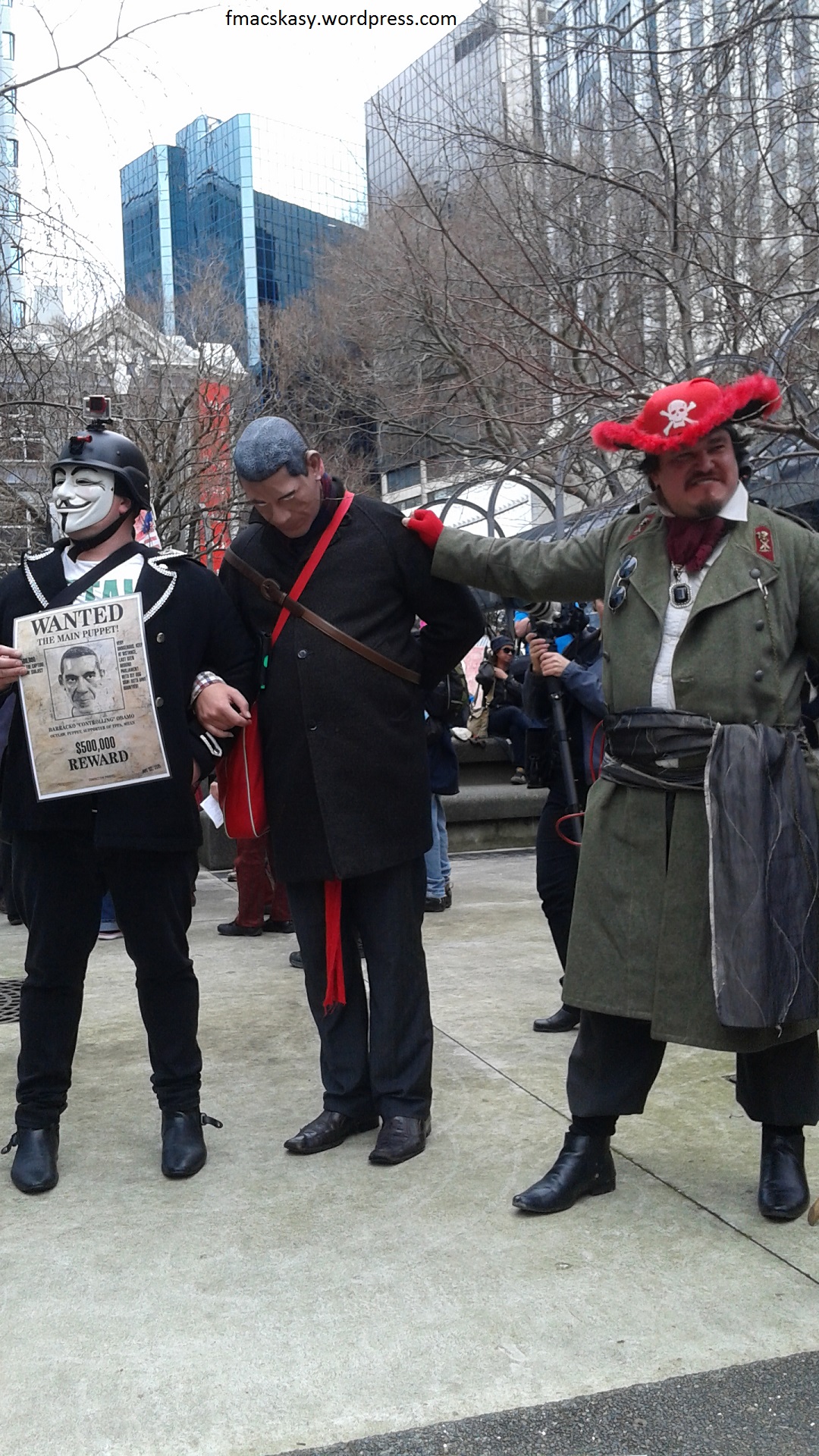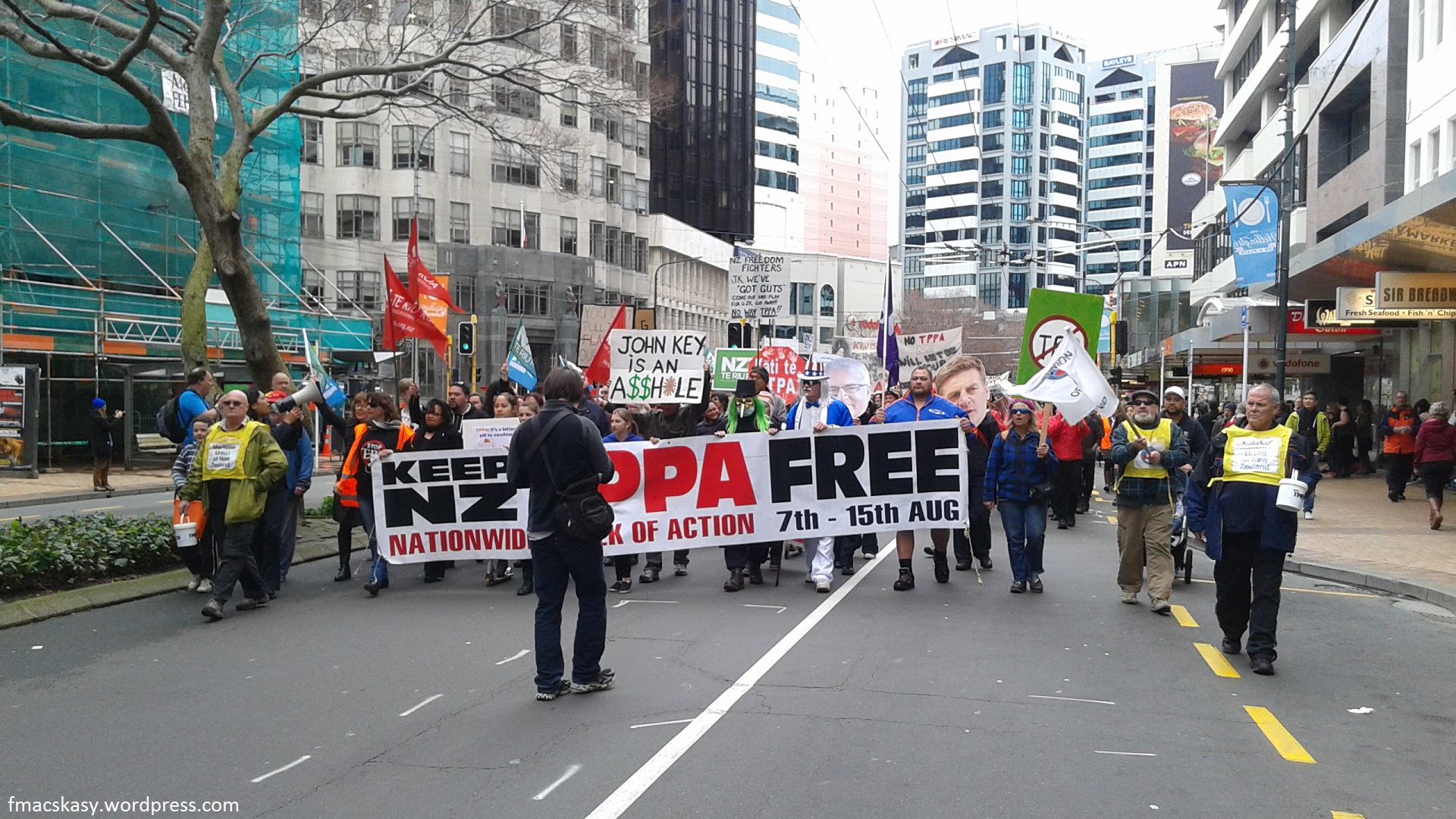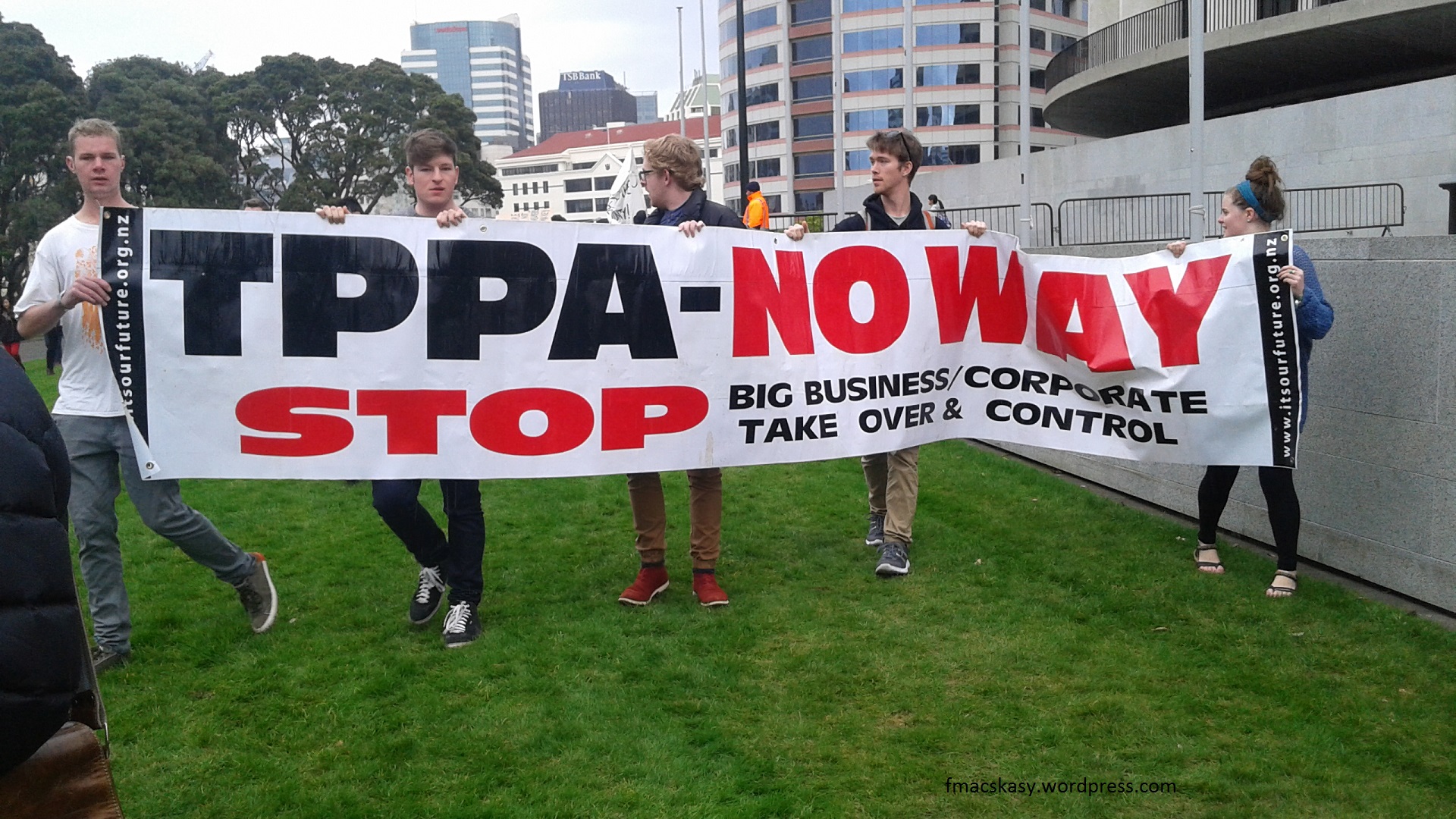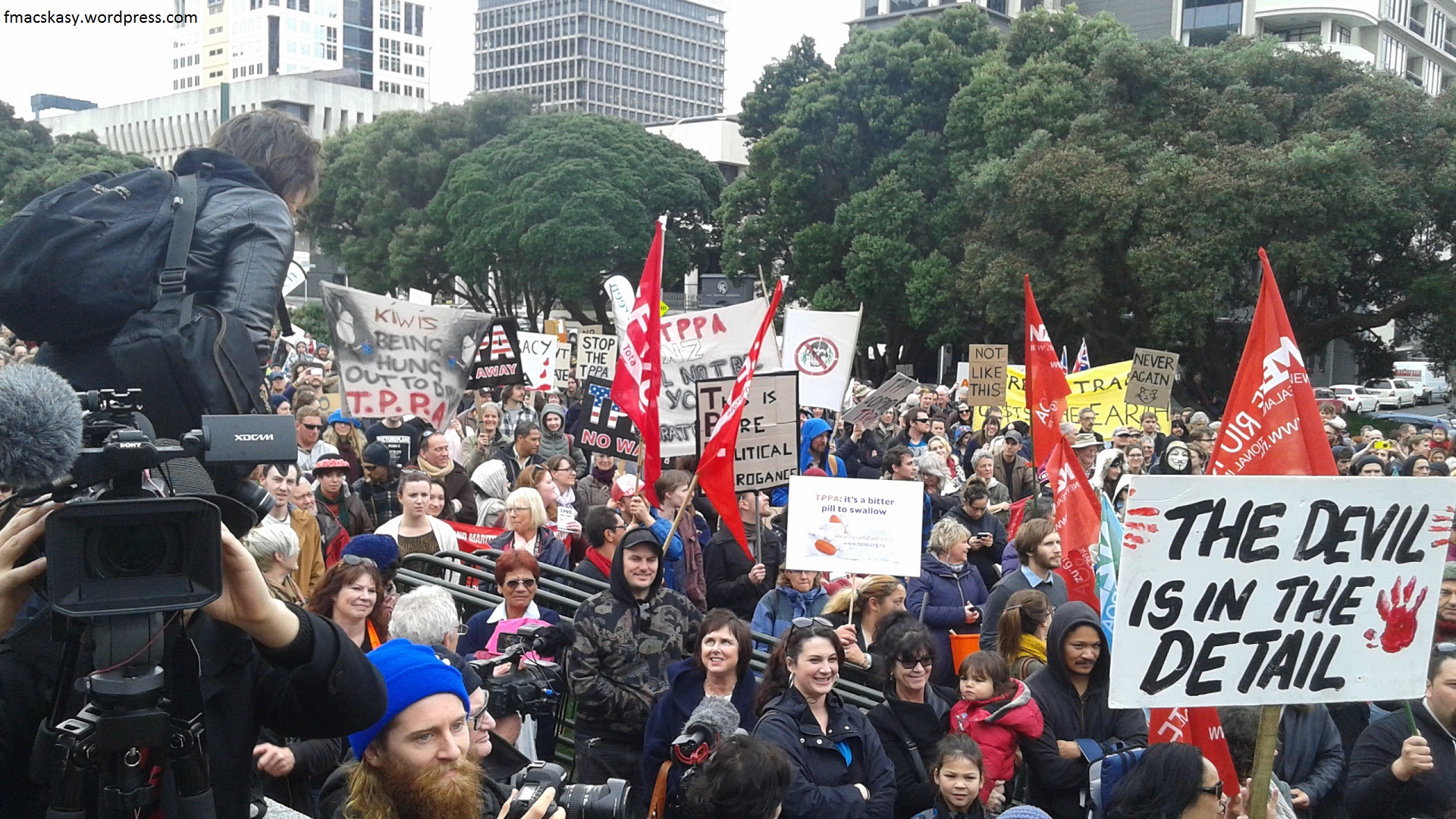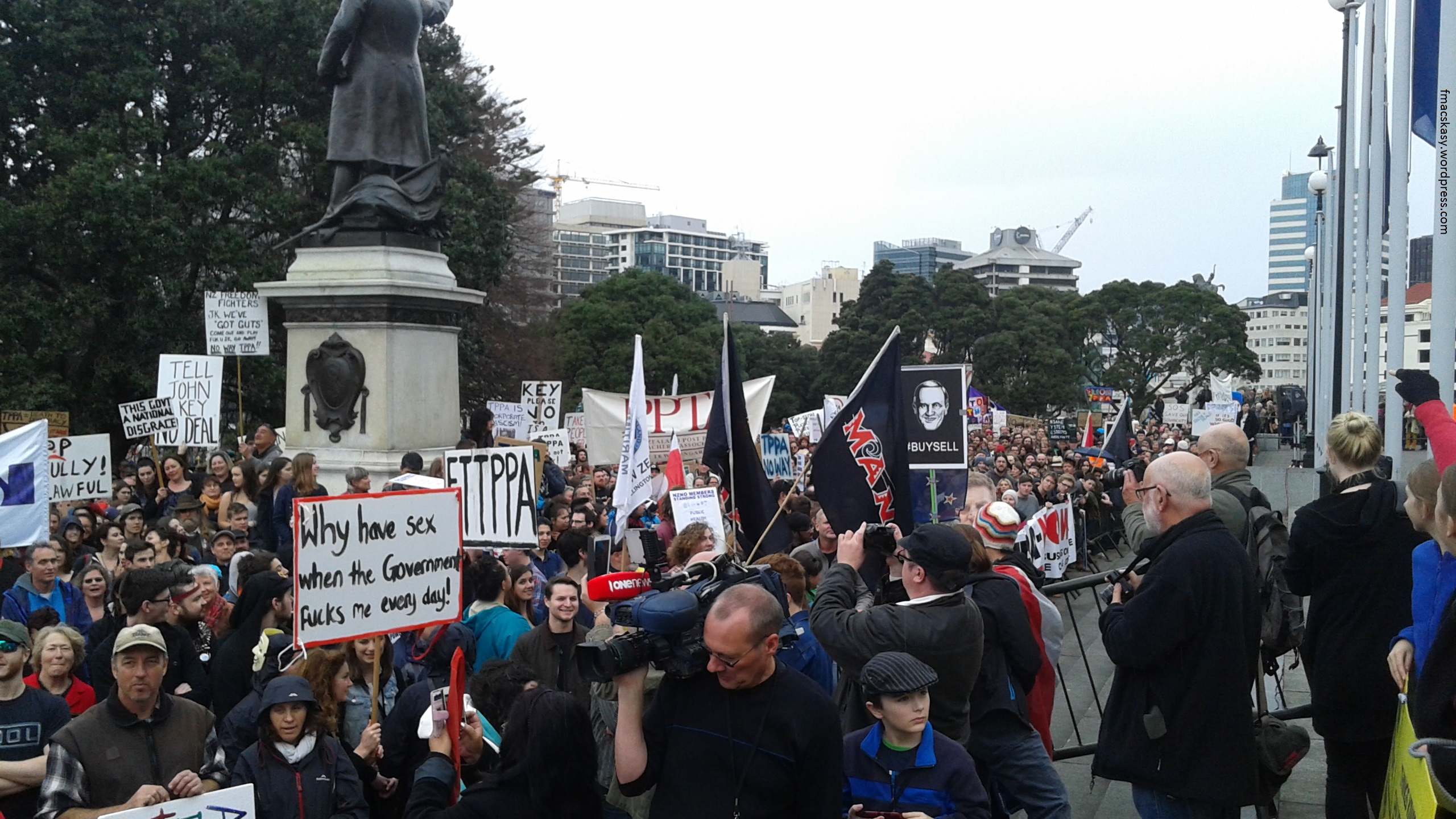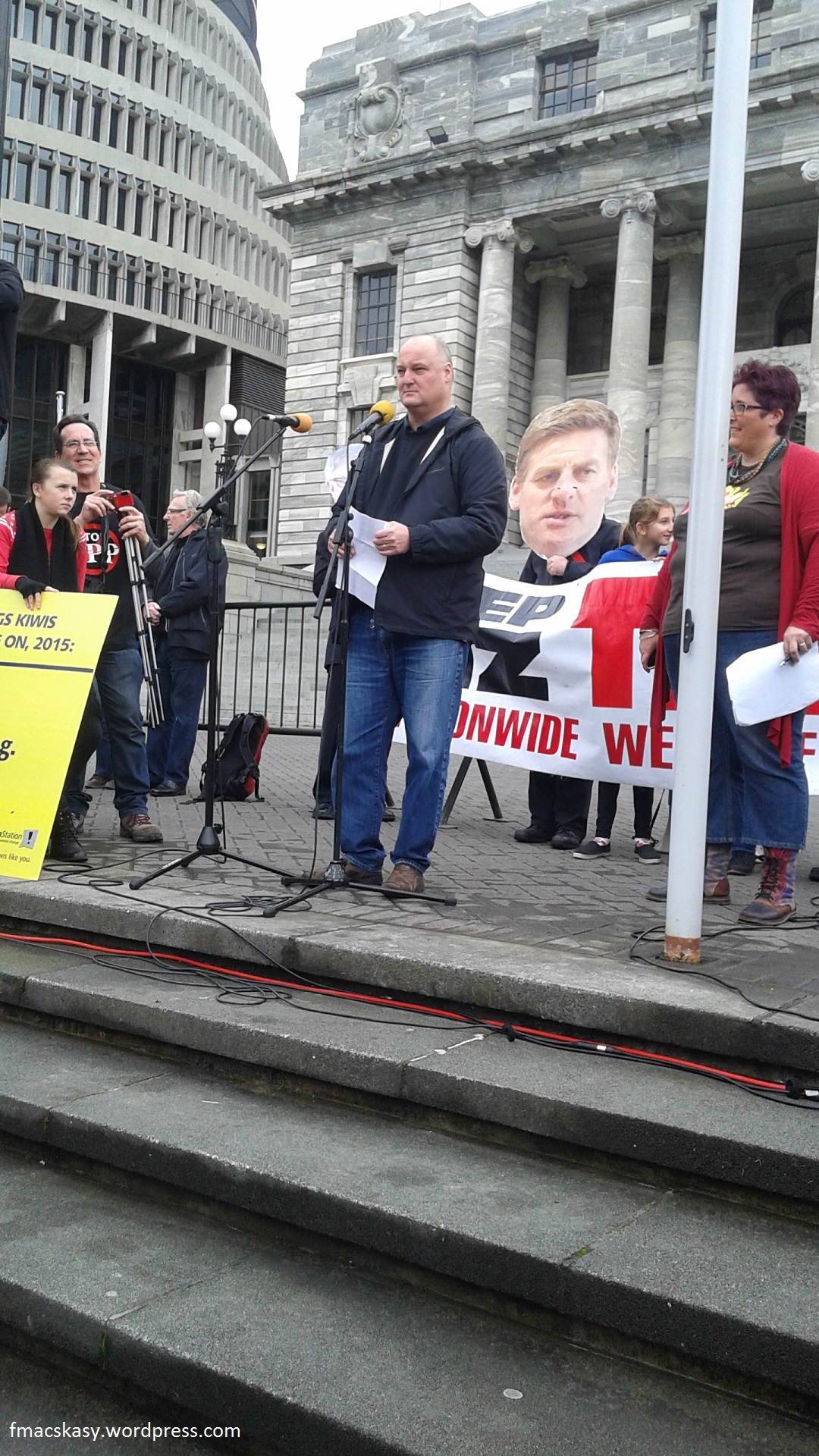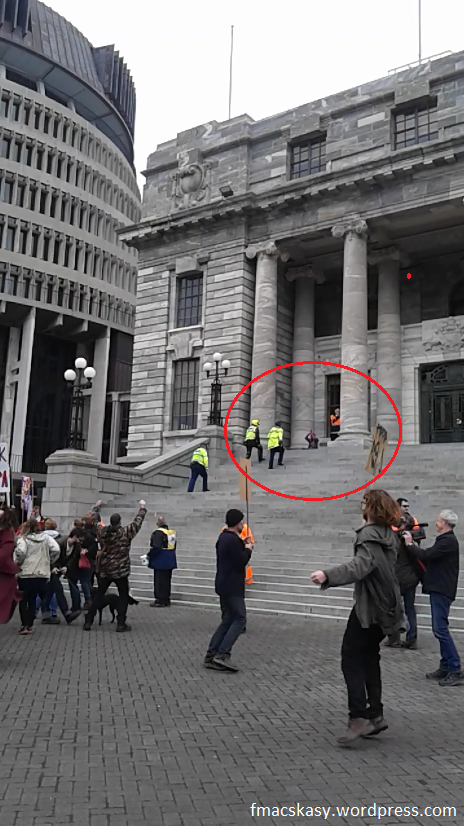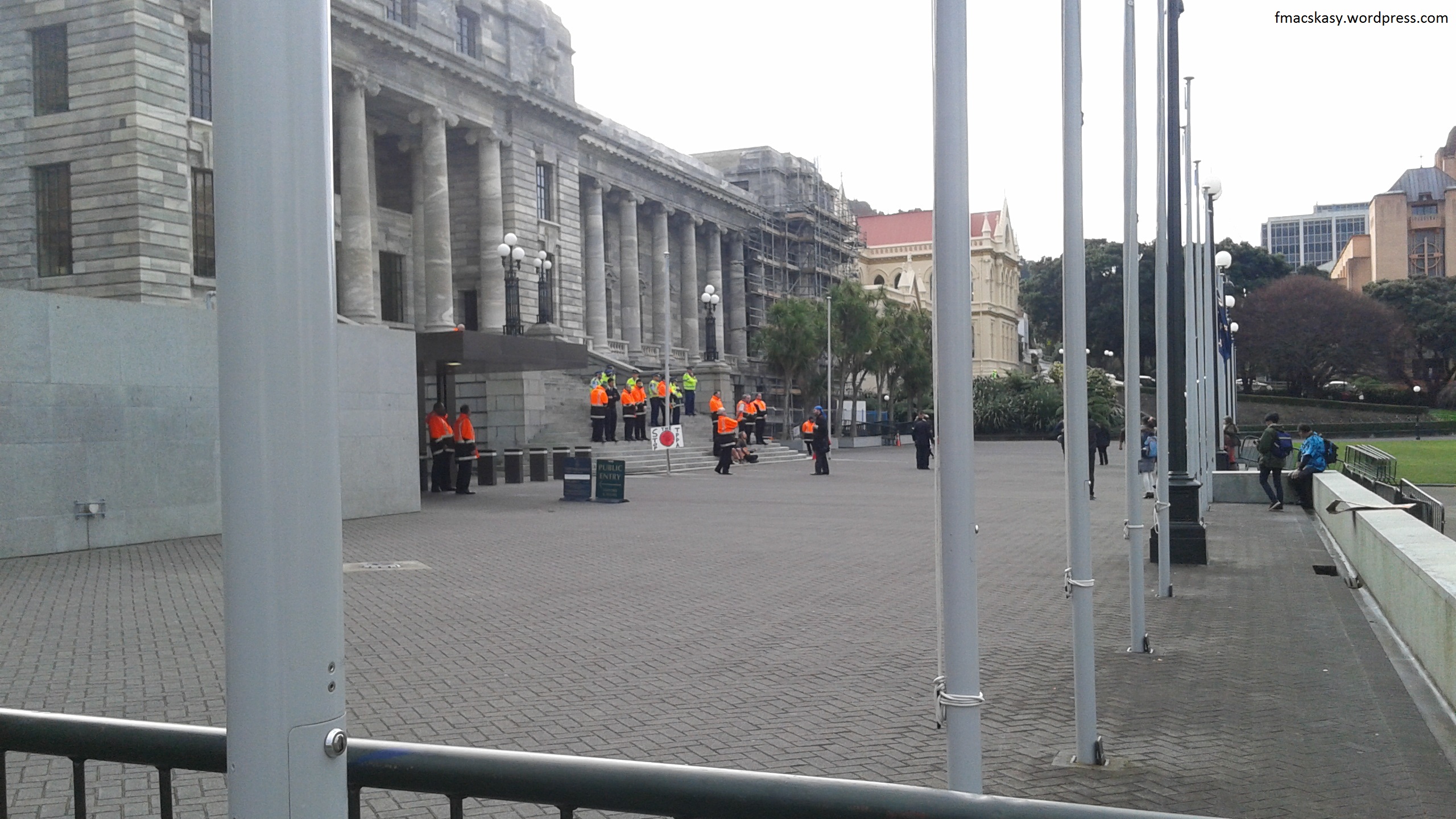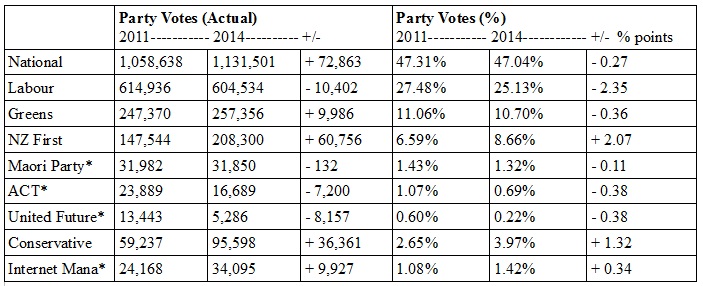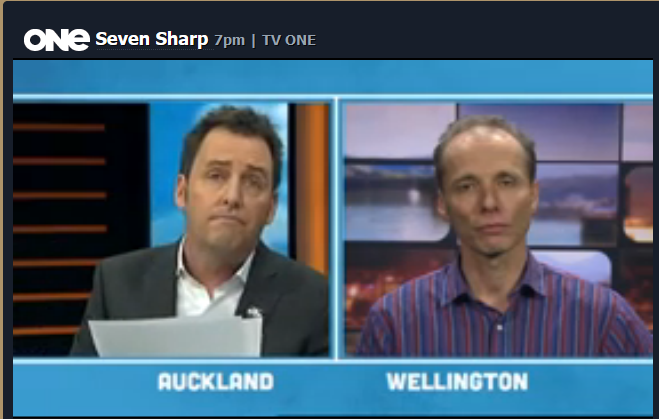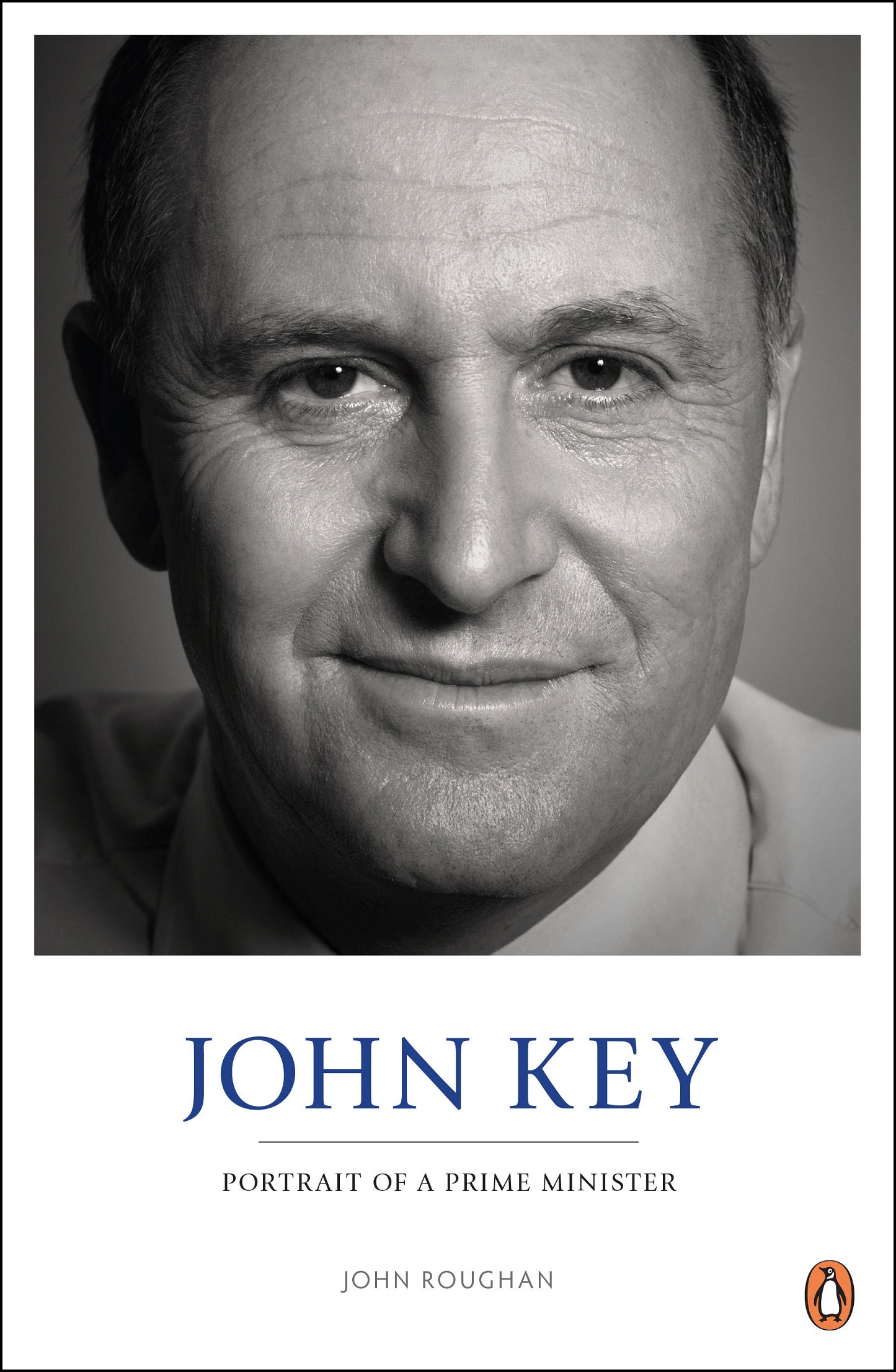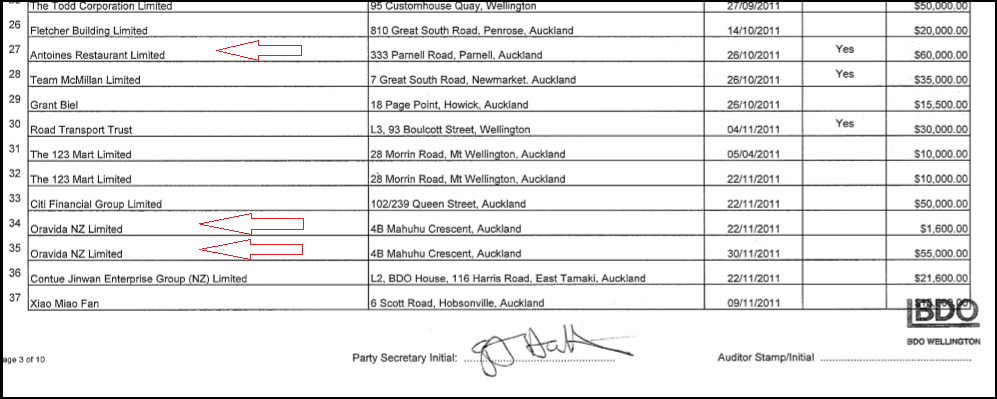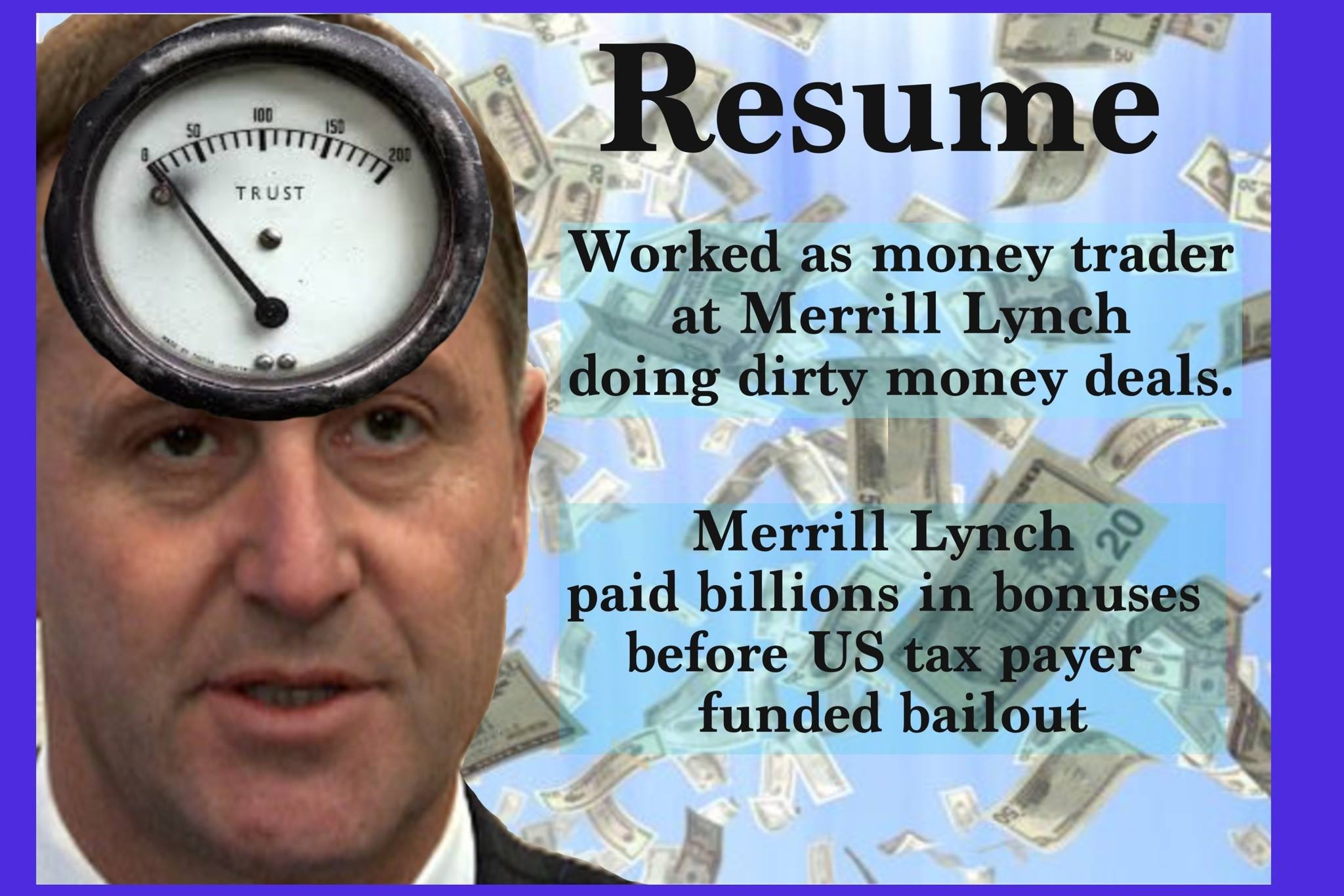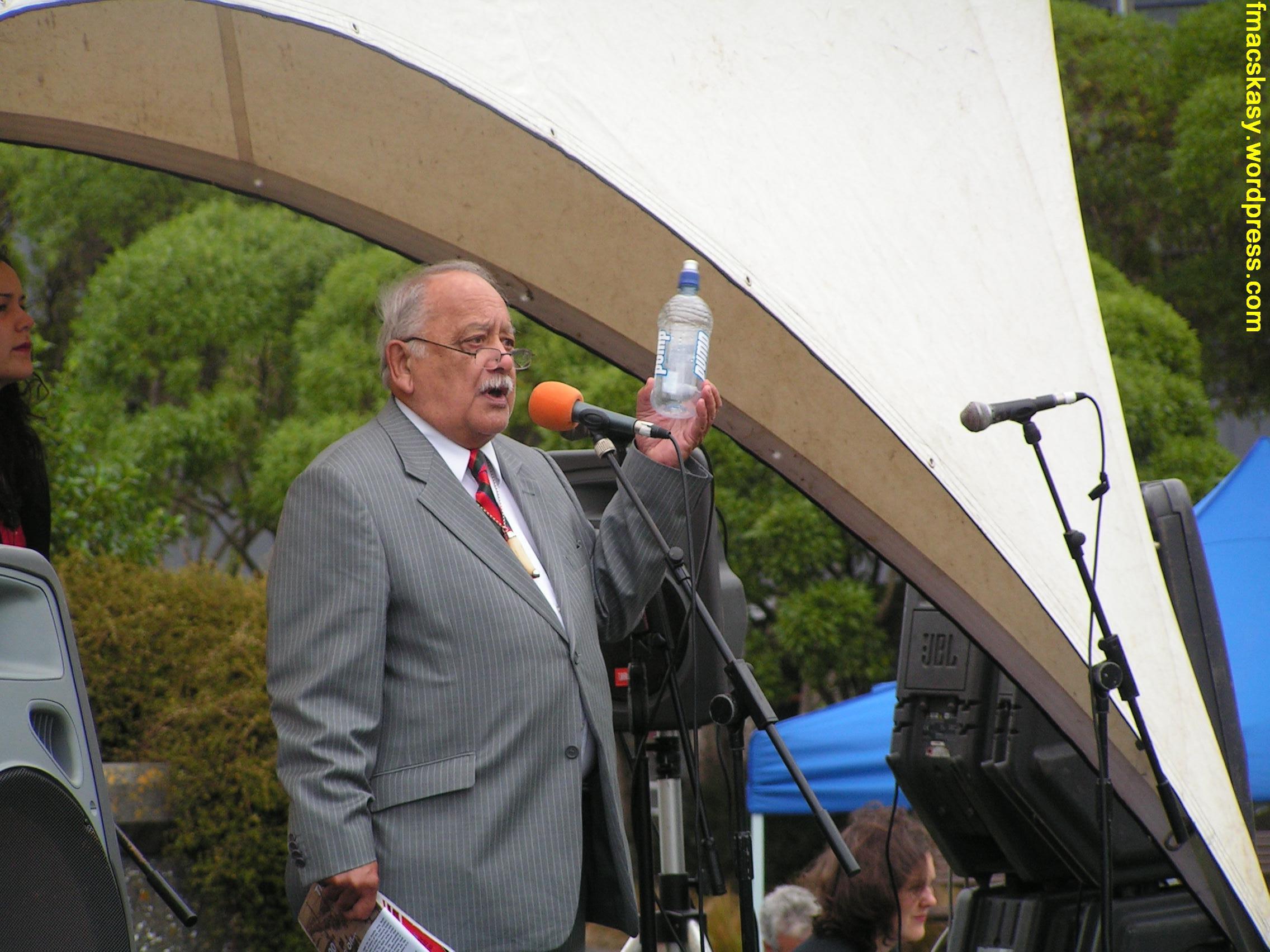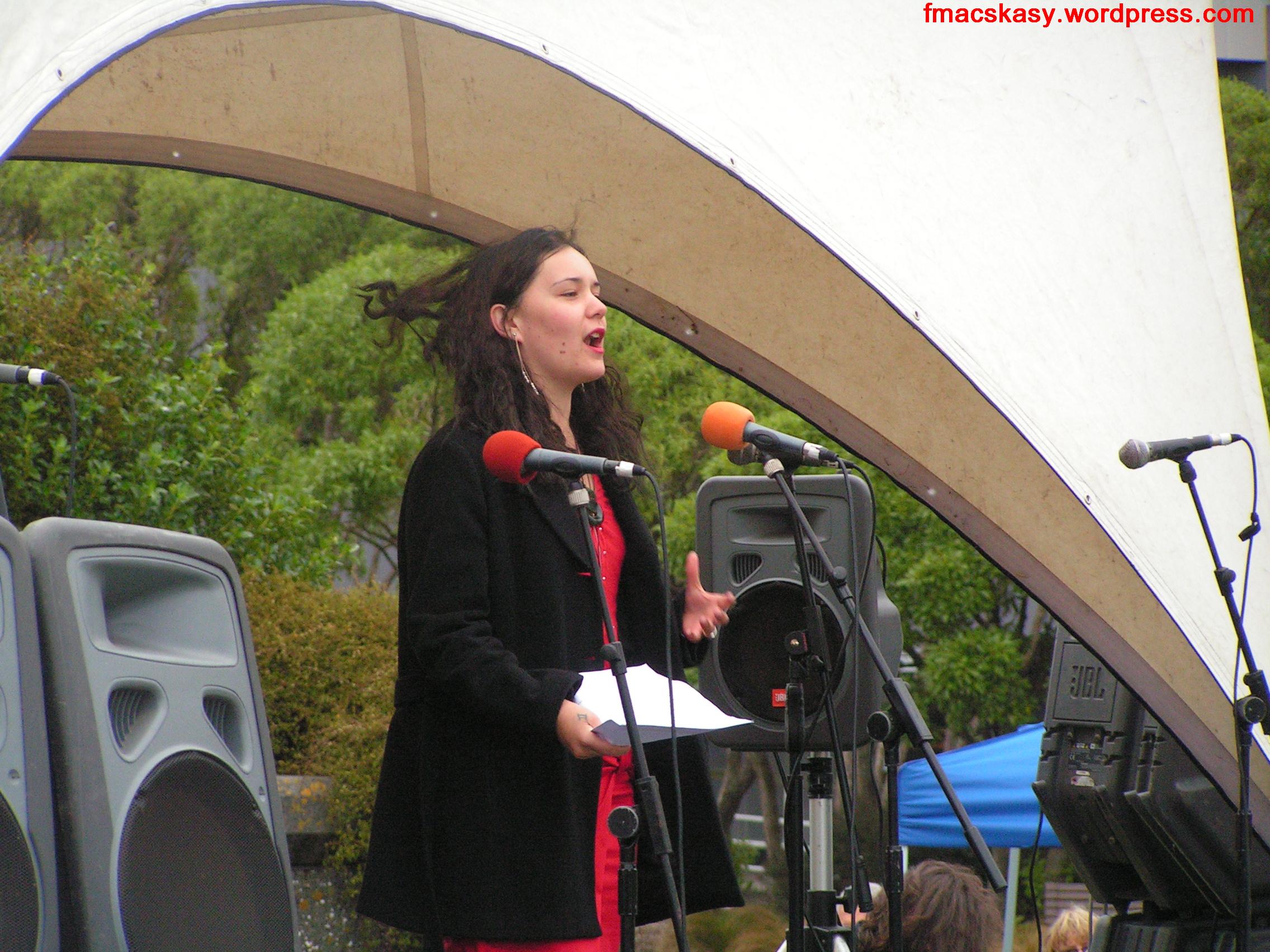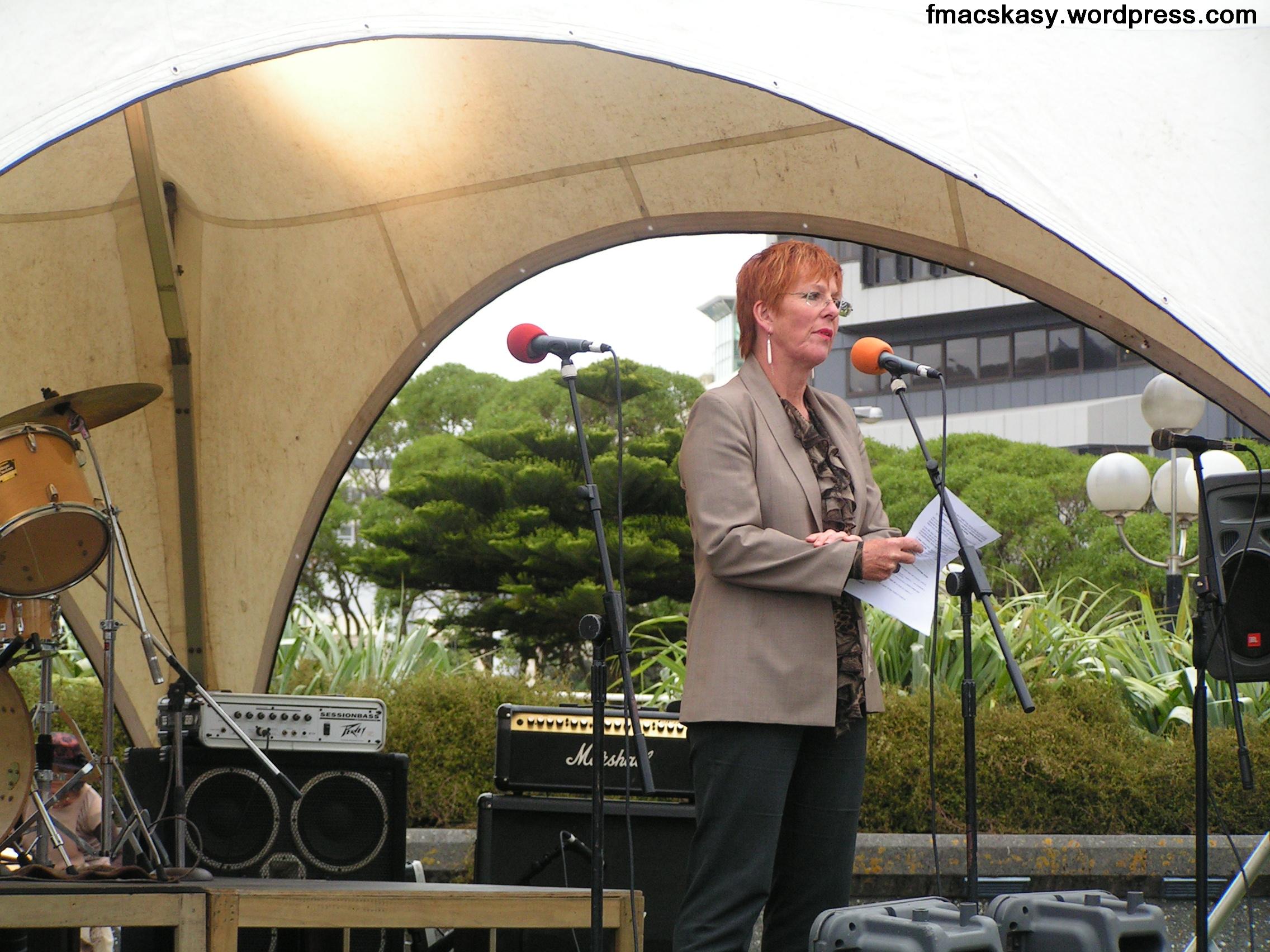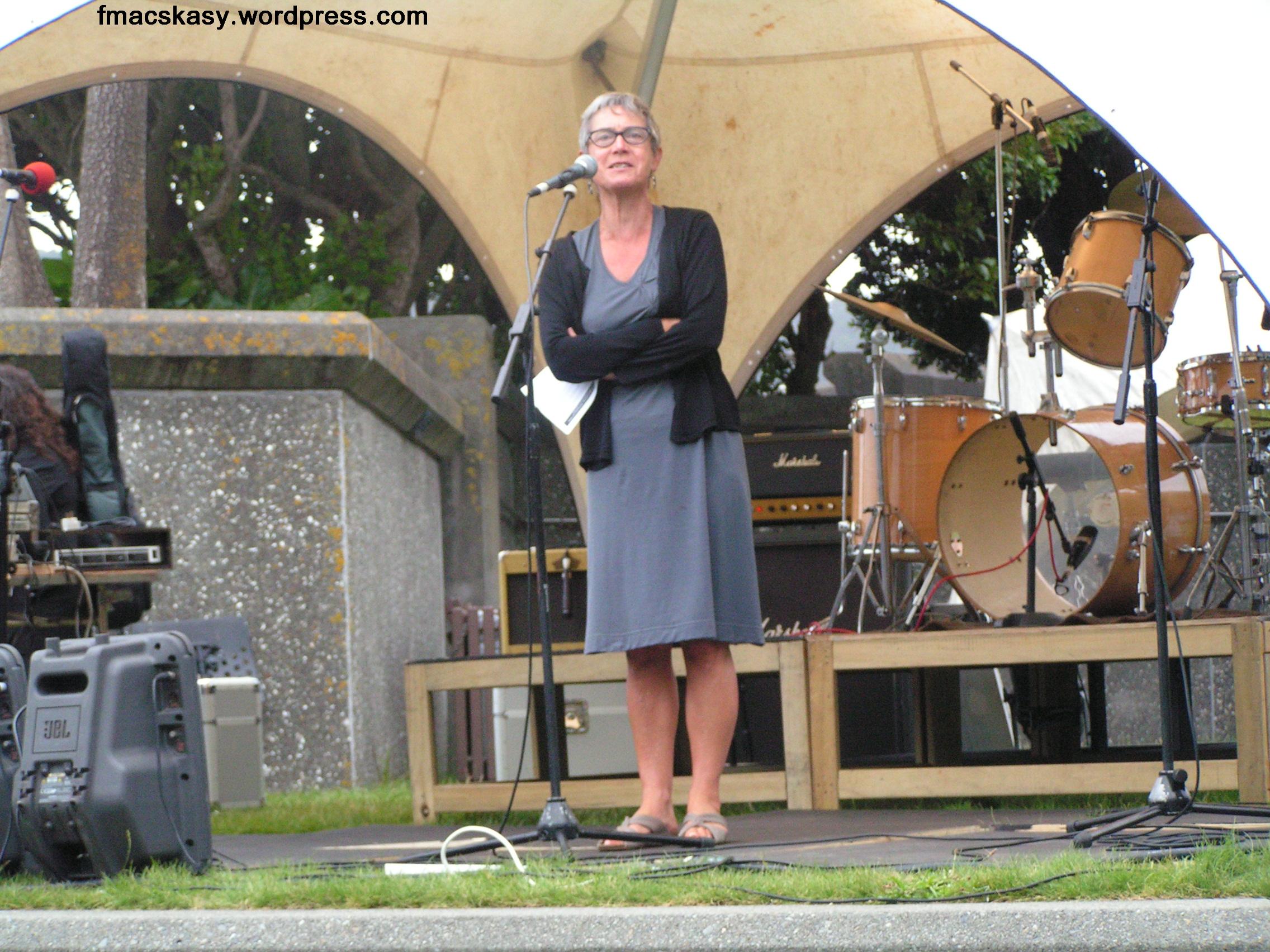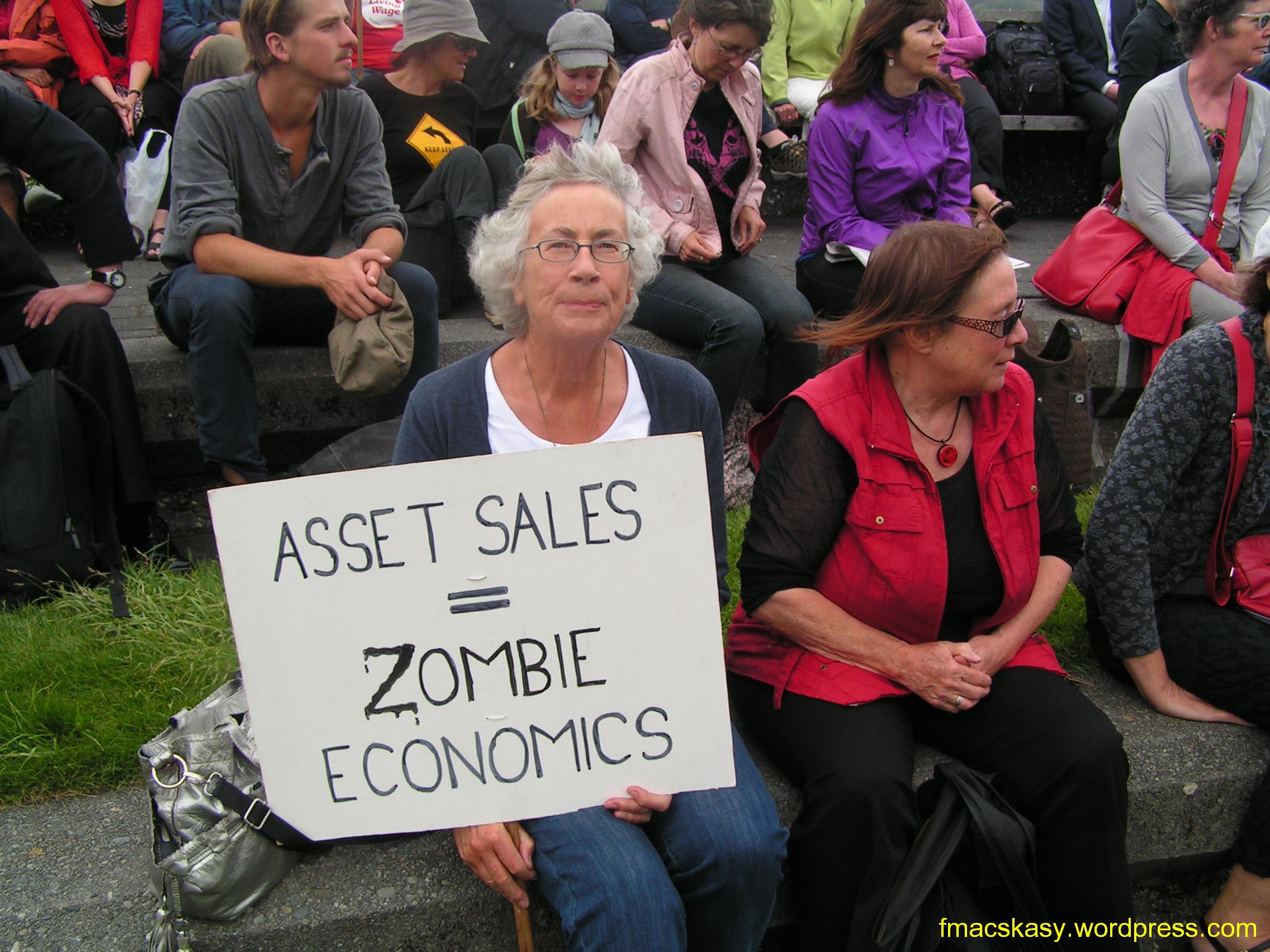Archive
The Virus, the Bubble, and the Trap
.

.
In case people missed it, National’s de- facto 2023 election campaign was launched on 15 March this year.
The campaign – in the form of a petition to open a Trans Tasman bubble without need for MIQ – was uploaded onto National’s twitter account, and twentyfive minutes later onto Caretaker Leader, Judith Collin’s account:
.


.
Pressure mounted from the business community. The usual vocal business, tourism, and hospitality industry lobbyists made their voices heard loud and repetitively to the point of being cliched “broken records”:
.

.
Even state-owned, non-commercial RNZ was prodigious in platforming the clamour from business interests.
Voices calling for caution were few and far between. Apparently, calls for caution were not nearly as news-worthy and exciting as the prospect of re-opening our borders to our nearest neighbour after nearly a year cut off from the rest of the world.
One voice of caution came from Stuff Media’s travel journalist, Brooke Sabin. In October 2020, Mr Sabin posed five critical questions pertaining to any proposed travel bubble. One such question asked:
.
One of the key questions around a travel bubble with Australia is what happens if a community case pops up? For example, if we have flights to Adelaide and a single mystery case popped up there, would flights to and from New Zealand be cancelled? If not, would we adopt Australia’s hotspot definition and stop travel if there were more than three cases for three days in a row? The New Zealand public may find that hard to stomach, but that’s why debate is needed now, before the election, to try and settle on a risk we’re happy with.
Travellers, airlines, insurers and the tourism industry need this certainty. We could see cases pop up once a bubble is underway, and nobody quite knows at what point travel would continue, or if tens of thousands would have travel plans disrupted by widespread cancellations.
.
Events nine months later were to answer his questions, with grim, dramatic effect.
Ironically, Brook Sabin’s article was picked up and republished by a merchant banker, Fifo Capital. The financiers at Fifo obviously recognised the inherent danger posed to the Aotearoa New Zealand’s economy should covid19 – especially the highly infectious Delta Strain – break through our borders. It was a pity other businesses did not share Fifo’s wise caution.
The strident calls to open a Trans Tasman bubble succeeded.
On 6 April this year, PM Ardern announced that “quarantine-free travel between New Zealand and Australia will start on Monday 19 April“.
However, she also issued a clear, stark warning:
.
“Quarantine free travel will not be what it was pre-COVID-19, and those undertaking travel will do so under the guidance of ‘flyer beware’. People will need to plan for the possibility of having travel disrupted if there is an outbreak.”
.
It was a warning that many either did not heed or understand.
University of Auckland epidemiology professor, Rod Jackson, who recently appeared on Newshub Nation (2 October), and who has a reputation for clear, unvarnished, truth stated with crystal clarity:
.
“I’ve seen some things in the newspaper and the media about people complaining they are not being helped by the New Zealand government when they’re stuck in Australia and can’t come back.
I think that they need to suck it up, that anyone who wants to go to Australia needs to be aware that at a moment’s notice they could end up being there for weeks, if not months.”
.
Again, people took no notice.
Eighteen days late, on 23 July, PM Ardern announced the closure of the Trans Tasman bubble. The Delta Strain was spreading through Australia and the risk that a traveller could bring it back to this country – as happened in June this year – could no longer be ignored.
PM Ardern pleaded with New Zealanders:
.
“There is considerable pressure on our managed isolation facilities at the moment and my strong urging to everyone is do not travel to Australia in the next eight weeks.”
.
Returnees were put in two weeks isolation upon return to Aotearoa New Zealand, putting a strain on availability of MIQ rooms. New Zalanders were now not only trapped throughout the world, trying to get home, but thousands were now also trapped throughout Australia.
Returnees demanded access to MIQ rooms. There were insufficient rooms. Calls became strident. The media shamelessly gorged itself on amplified stories of misery, stress, and hardship. There were emotive headlines and interviews. There were clicks to be gained; advertising to sell; and careers to build.
A few in the media bucked the stampede to exploit this human crisis. Writing in his column, Q+A presenter, Jack Tame, pointed out the blindingly obvious:
.
“Remember – this is the way the bubble was designed to function. From the word go, there was risk for anyone who decided to go to Australia. You bought a ticket. You chose to travel. You assumed that risk. I actually think the people who’ve come back from New South Wales and into MIQ should consider themselves very lucky they haven’t had to pay for the privilege when everyone else does.”
.
The truth is that business and political agitation for a trans tasman bubble generated considerable media stories. Once the bubble collapsed and New Zealanders were trapped overseas, there were yet more “human interest” stories to be made. The more tragic the story, the better the headline.
24 hours a day, seven days a week, the media feasted.
Critics of the Labour government; political opportunists; those dissatisfied with travel restrictions; and detractors of the MIQ system were quick to weaponise “human interest”, “heart-string” stories for their own ends. Where reasoned argument fell short against our covid19 and MIQ policies, emotive invective took over. That weaponisation of PM Ardern’s plea to Be Kind was turned back against the government and those who understood the danger which covid19 posed to us collectively.
And then, finally, our luck well and truly ran out.
On 17 August – four months after the Trans Tasman bubble had opened – a community case of the Delta Strain was detected in one person, in Auckland. The PM wasted no time, and the entire country was thrown into Level 4 Alert lockdown at 11.59PM that very night.
Since then, Delta has infected 1,420 people. Two have tragically died (as at 6 October 2021).
The response from National, amplified by the media, has been scathing:
.

.
Every morning, afternoon, and throughout the evening, from Monday to Sunday, National and their fellow-travellers from business and right-wing media excoriated the government for the current outbreak. The relentless headlines – of which only a small sample is presented above – does not even include radio, television interviews and social media propaganda.
Demands for a Trans Tasman bubble was a carefully laid trap from National.
If the bubble was successful, Chris Bishop and National’s current (?) Leader, could loudly proclaim success and claim credit for loosening restrictions and ‘liberating’ New Zealanders from our isolation. It would be a valuable, vote-grabbing ‘coup’ to take to the 2023 general election.
“See? This is what a competent government looks like! This is what a National does! Vote for us!”
If the bubble failed, Chris Bishop and National’s current (?) Leader, could blast the government for incompetence and every other ‘misdemeanour’ imaginable.
“See? This is what an incompetent government looks like! This is what Labour does! Vote for us!”
Truly, it was a win/win, no-lose, cunning gambit.
The Government fell for the trap. Delta got loose. Country forced into lockdown. Delta all but impossible to contain.
Checkmate.
If there is a lesson for Labour, it is this: As Opposition, National can demand whatever it can dream up. But as Opposition, it has zero accountability for consequences when things go horribly wrong.
Never listen to National. They are the the party of responsibility, except when National has no responsibility.
.
.
.
References
National Party: Open the Trans Tasman Bubble Now (archived)
Twitter: National Party – Sign the Trans Tasman bubble petition
Twitter: Judith Collins – Sign the Trans Tasman bubble petition
RNZ: Tourism New Zealand forecasting billion-dollar economy boost if trans-Tasman bubble opens
Stuff media: Crack open the border, mate – Waikato tourist towns’ plea for trans-Tasman bubble
Stuff media: Tourism disappointed over delay in trans-Tasman bubble date
RNZ: Business community wants quick decision on trans-Tasman bubble
Newshub: COVID-19 – Concerns some small tourist towns will be gone before trans-Tasman bubble opens
Stuff media: Government pushed to act on trans-Tasman travel bubble
Stuff media: Covid-19 Five big problems with the proposed trans-Tasman travel bubble
Beehive.govt.nz: Trans-Tasman bubble to start 19 April
Stuff media: Trans-Tasman travel: Prepare to be stuck ‘for weeks’ if you travel under re-opened bubble, expert says
RNZ: NZ government suspends quarantine-free travel with Australia for at least eight weeks
RNZ: Australian traveller who visited Wellington has Delta variant
Stuff media: Covid-19 – A timeline of the Delta outbreak
Ministry of Health: 39 community cases of COVID-19; two border cases; more than 63,000 vaccines doses administered yesterday
Voxy: ‘Short and sharp’ lockdown will be the longest ever – Judith Collins, Chris Bishop
National: Time has run out on Government’s incoherent Covid strategy
National: Government has choices and needs to make them now
National: New Zealand at Covid crossroads
National: What is the Government’s Covid strategy?
National: No mention of Delta strain in Government plans
National: South Island should drop now to alert level 2
National: Labour has dropped the MIQ ball
Stuff media: Covid-19 NZ – Judith Collins says level 4 should be all but ruled out, Government lacks mandate to lock people down
National: Labour recklessly delayed vaccine shipments
RNZ: New level 2 rules a ‘bitter pill to swallow’ for South Island, Collins says
National: Minister won’t say how much more taxpayers will be up for
Additional
The Spinoff: New Zealand urgently needs a serious opposition leader
Al Jazeera: New Zealand grapples with Delta – and Tucker Carlson
Reference sources
MIQ: History and origins of MIQ
Covid19: History of the COVID-19 Alert System
MBIE: Managed isolation and quarantine data
RNZ: Timeline – The year of Covid-19 in New Zealand
Stuff media: Covid-19 – A timeline of the Delta outbreak
Other Blogs
The Knightly Views: Media lessons from a pandemic
The Standard: Smug hermit king
Previous related blogposts
Life in lockdown, Round Two – Day 4 – Caretaker Leader Collins, another rare mis-step
Life in lockdown, Round Two – Day 15 (@L3)
The Microbiologist, the Caretaker Leader, and some Nasty Germs
One thousand dead New Zealanders per year?
The Virus, the Media, and John Key
.
.
.

Acknowledgement: Rod Emmerson (15-21 March 2021)
.
.
Liked what you read? Feel free to share.
Have your own thoughts? Leave a comment. (Trolls need not bother.)
.
= fs =
Trumpwatch: The Art of Deflection
.
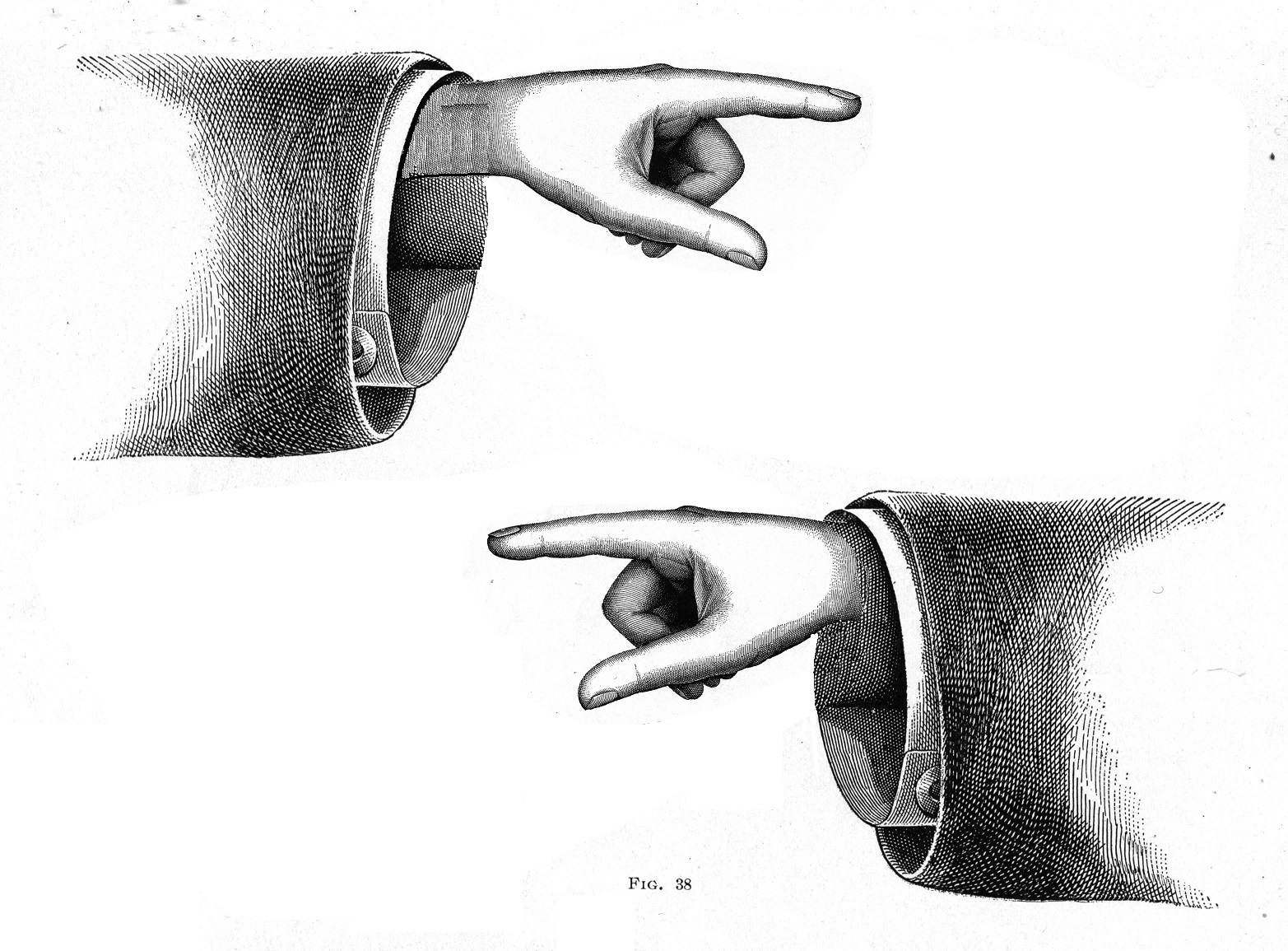
.
The Art of Deflection
The Right make a big thing out of Personal Responsibility. It is core to their philosophy of the primacy of the Individual, as National’s website points out again* and again* and again;
.
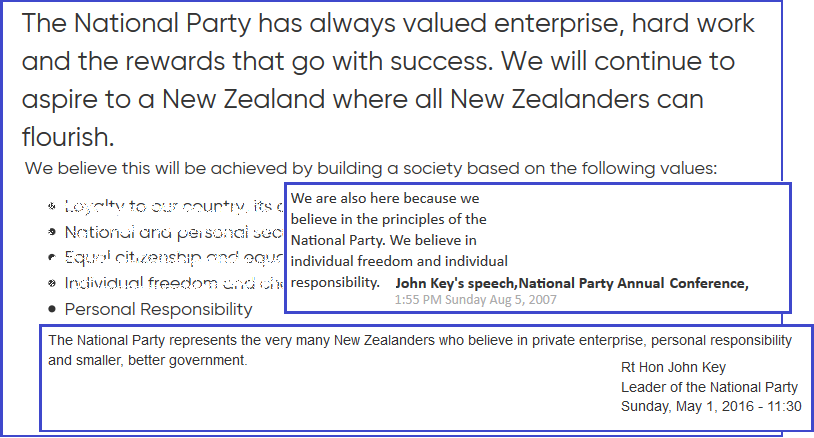
.
With the Cult of Hyper Individualism, “taking Personal Responsibility” is the corollary of the “Small State” and reduced government services. The Right demand Personal Responsibility from everyone. (So when an individual ‘fails’, the fault – and responsibility – must lie with him/her, rather than the State’s tilting the playing field toward the rich and the powerful.)
The leadership of the National Party have demonstrated on numerous occassions how ‘dedicated’ they are to their philosophy of Personal Responsibility;
.

.
When faced with a failing policy and worsening social and economic indicators, National automatically defaults to three standard deflections;
#1 Blame the previous Labour government
#2 Blame ‘welfare abuse’/Release a ‘welfare abuse’ story in the media
#3 Blame Global Financial Crisis or similar overseas event
If the problem is Auckland housing-related, there is a fourth default-deflection the Nats can rely on;
#4 Blame Auckland Council/RMA/both.)
.
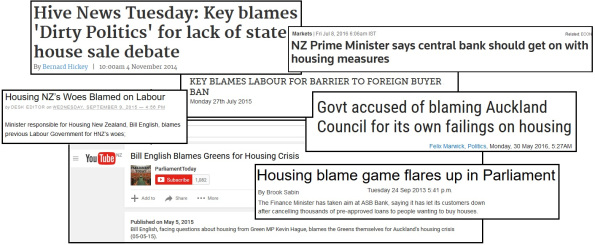
.
Works a treat!
Doing it right-wing style – why take personal responsibility when there are perfectly good scapegoats available?
The newly-elected right-wing Donald Trump administration appears to have taken lessons from National’s strategy for blame-gaming over the last eight years;
.
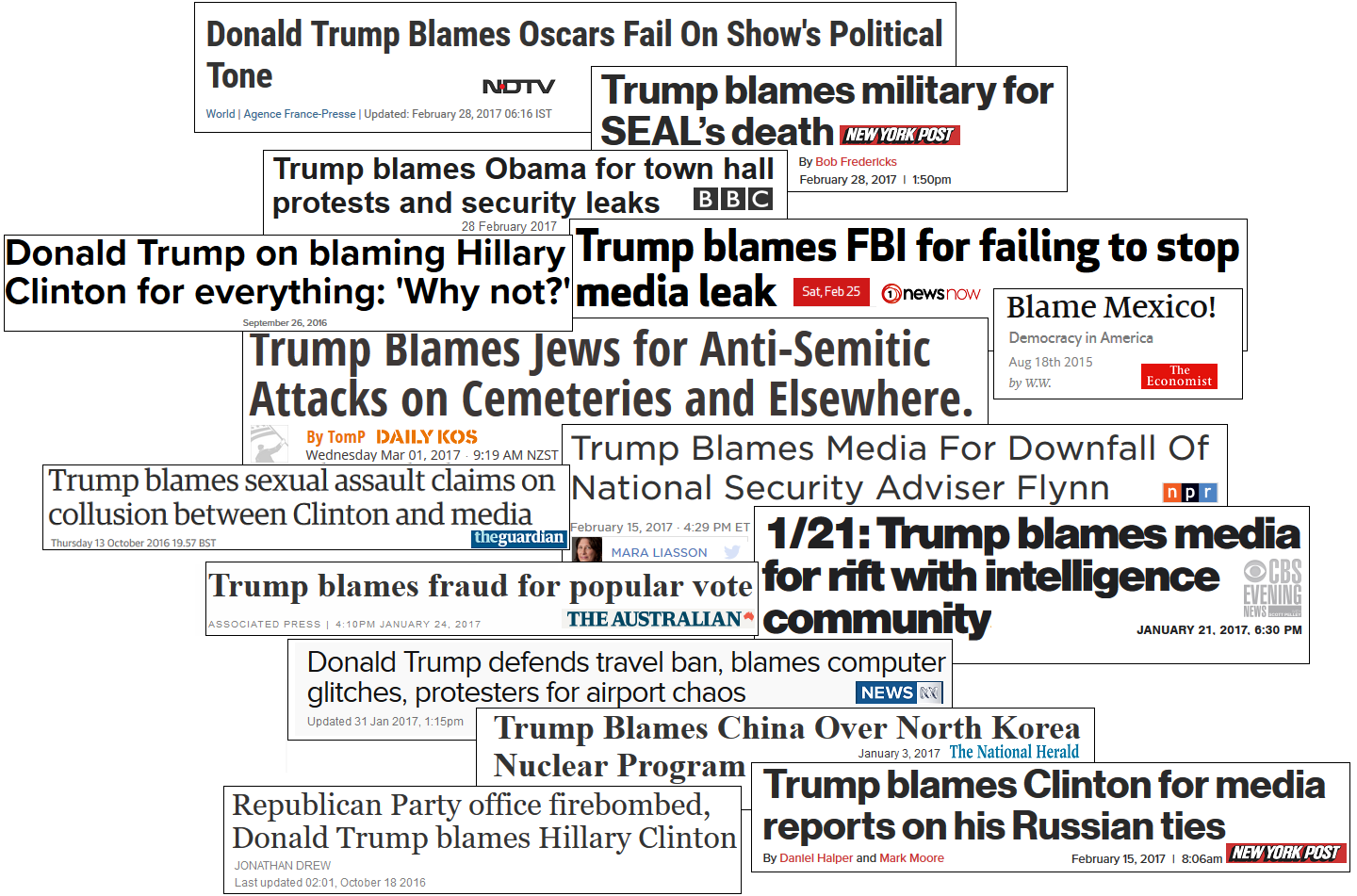
.
Trump’s three default positions appears to be;
#1 Blame the media
#2 Blame Obama/Clinton/government departments
#3 Blame the rest of the world
Blaming Hillary Clinton also appears to be a personal favourite of some Trump’s supporters. Faced with their hero – an unstable, thin-skinned narcissist in the White House busily tweeting bizarre comments in the early hours of the morning – pointing to Clinton as a “worse alternative” is the only possible strategy remaining to mitigate Trump’s increasingly irrational behaviour.
Without the bogey(wo)man of a “worse alternative”, one is ultimately left with assessing Trump’s actions and utterances on it’s own merits of what is, or isn’t, acceptable behaviour.
After all, for most left-wingers and liberals in New Zealand, it can be generally agreed that our former Dear Leader, John Key, is nowhere as bad as odious characters throughout history such as Franco, Mussolini, Pol Pot, Pinochet, et al…
But, would you still vote for him?
As with National, the Republican Party is also big on personal responsibility;
.
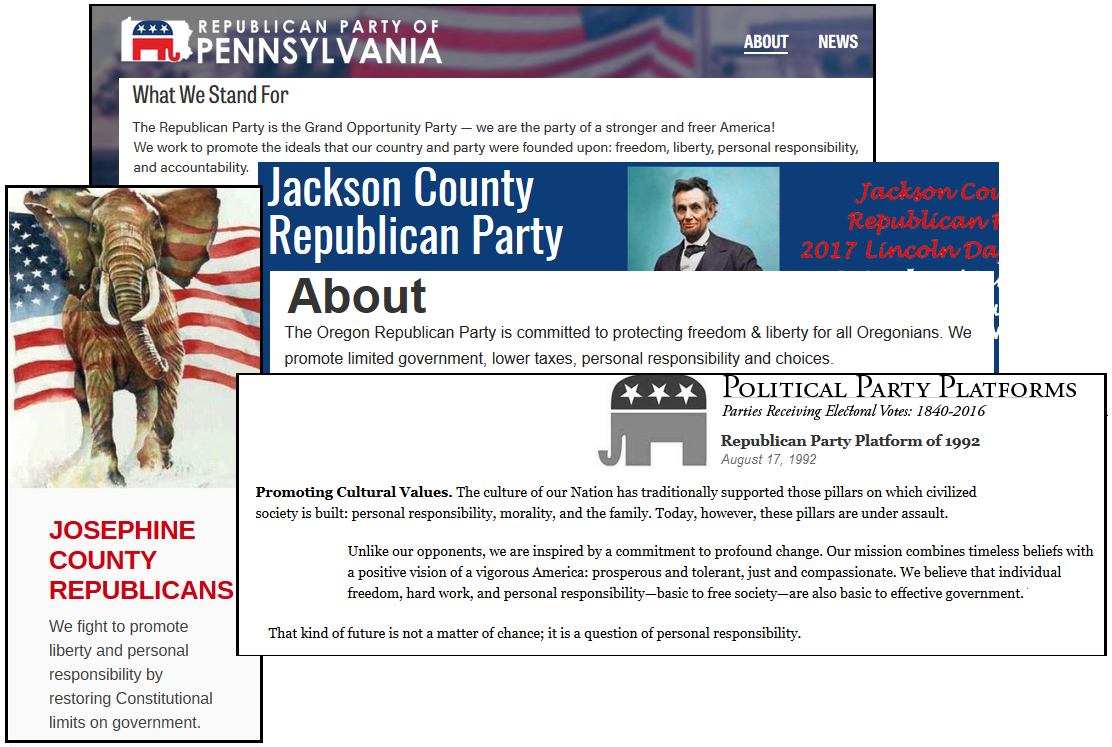
.
Taking personal responsibility – the Right-wing way.
Time for a beer…
.
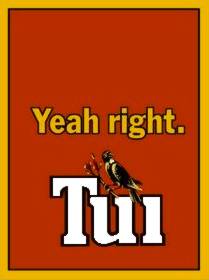
.
References
National Party: Our values
National Party: Speech to National Party Central North Island regional conference – John Key
NZ Herald: Transcript – John Key’s speech at the National Party conference
New York Post: Trump blames military for SEAL’s death
NDTV: Donald Trump Blames Oscars Fail On Show’s Political Tone
BBC: Trump blames Obama for town hall protests and security leaks
TVNZ News: Trump blames FBI for failing to stop media leak
Daily KOS: Trump Blames Jews for Anti-Semitic Attacks on Cemeteries and Elsewhere
NPR: Trump Blames Media For Downfall Of National Security Adviser Flynn
CBS News: Trump blames media for rift with intelligence community
ABC News: Donald Trump defends travel ban, blames computer glitches, protesters for airport chaos
The Australian: Trump blames fraud for popular vote
The National Herald: Trump Blames China Over North Korea Nuclear Program
The Economist: Blame Mexico!
New York Post: Trump blames Clinton for media reports on his Russian ties
Fairfax media: Republican Party office firebombed, Donald Trump blames Hillary Clinton
The Week: Donald Trump on blaming Hillary Clinton for everything: ‘Why not?’
The Guardian: Trump blames sexual assault claims on collusion between Clinton and media
Previous related blogposts
Trumpwatch: The Drum(pf)s of War
Trumpwatch: “… then they came for the LGBT”
.
.
.

.
This blogpost was first published on The Daily Blog on 14 March 2017.
.
.
= fs =
National – Party 4 Sale?
.

.
Niue
Recent revelations that the National Party may have benefitted from a deal involving a resort hotel in Niue, by receiving a $101,000 donation has been in the headlines since 18 April, when Radio NZ’s political reporter, Benedict Collins, broke the story;
.
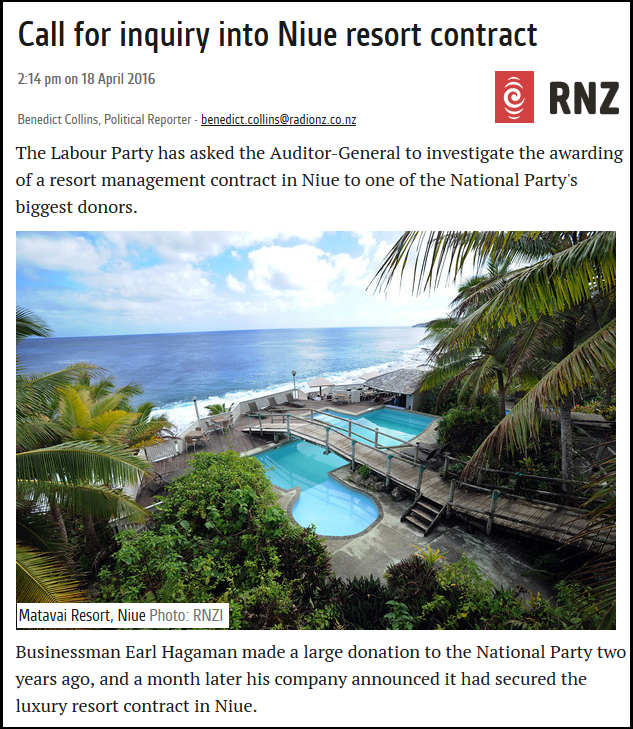
.
In October 2014, New Zealand’s Scenic Hotel Group announced it had “secured” the Matavai Resort in Niue.
The Niue Tourism Property Trust, whose trustees are appointed by Mr McCully, carried out what the minister said was a fully commercial process to find a company to run the resort.
The month before, Mr Hagaman, Scenic Hotel Group’s founder, had donated $101,000 to the National Party, making him National’s biggest living financial donor in 2014. Only a man who had died and left his estate to National gave more.
Foreign Affairs Minister Murray McCully Photo: RNZ
But Mr McCully said there was no link between the contract and the donation.
Radio NZ further reported;
Scenic Hotel managing director Brendan Taylor said Mr Hagaman didn’t know the company was in the running for the Matavai Resort contract.
“Earl wasn’t actually even aware that we were negotiating in Niue, because basically that was me and I had it all in-house until such time that we knew we had been awarded the contract.
I did get [Earl’s wife] Lani Hagaman to sign the contract because I wasn’t actually available to do it, but apart from that Earl really had no involvement in Niue whatsoever.
His donation is something he did purely from a personal situation, and basically the hotel company and what Earl does from a personal point of view we kind of keep separate.”
It simply defies credulity that the two events are not somehow connected – especially when, as Radio NZ discovered that “RNZ News could find no record of Mr Hagaman having ever made a large donation to the National Party before“.
It also beggars belief that Scenic Hotel managing director, Brendan Taylor, is asserting that “Earl wasn’t actually even aware that we were negotiating in Niue” when Brendan Taylor got “Lani Hagaman [Earl’s wife] to sign the contract”?!
As the story began to gain traction elsewhere in the msm, National Party president, Peter Goodfellow, said he “ would be making no further comment about the donation“.
Three days later, on 21 April, our esteemed Dear Leader, John Key, attempted to close down the growing scandal;
Mr Key, speaking in China, said today that, while he hasn’t followed the issue closely, he’s not at all concerned.
“People make political donations and that’s well and truly disclosed.
“But actually Scenic Hotels have been operators for a very long period of time, that’s a management contract from what I can see in Niue – there’s nothing untoward there.”
It is intriguing that even though Key says “he hasn’t followed the issue closely, he’s not at all concerned“.
How can he be “not at all concerned” if “he hasn’t followed the issue closely“?
This is not the first time that National has been revealed to have benefitted from donations made by businessmen who have been closely involved in commercial activites with this government.
BMWs
In early 2011, National was roundly criticised for spending millions on thirtyfour new BMW limousines at a time when the country was experiencing recession after the Global Financial Crisis.
At first, Key denied all knowledge of the purchase, claiming he had been “kept in the dark” over the multi-million dollar upgrade;
.

.
But our esteemed Dear Leader, John Key, did know, as was revealed four days later in late February, 2011;
.
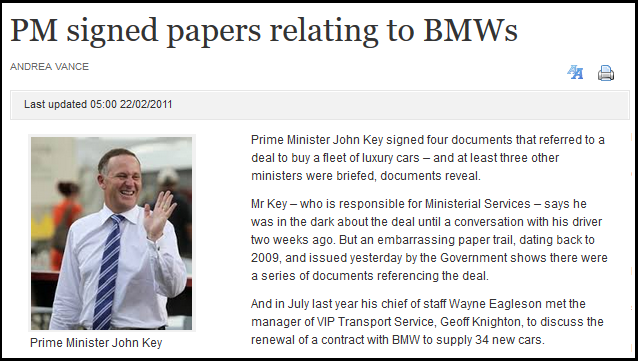
.
However, the BMW scandal becomes more serious than Key merely ducking responsibility and patently lying when he denied all prior knowledge of the limousine upgrade.
In May 2011, it was revealed that the suppliers of the BMWs had made a $50,000 donation to National prior to the vehicle-purchase. As reported in the NZ Herald at the time;
A private BMW dealer has rubbished the suggestion that a $50,000 donation from his company to the National Party had anything to do with the Government’s new fleet of BMW cars.
[…]
Labour’s internal affairs spokesman, Chris Hipkins, revealed that the BMW dealer’s donation came two days after a July 2010 meeting between Mr Key’s chief-of-staff, Wayne Eagleson, and the Department of Internal Affairs, which approved the BMW upgrade.
It was a month after a function that Mr Key attended at Auckland BMW dealership Team McMillan.
Radio NZ reported;
Prime Minister John Key says he has no responsibility for a $50,000 donation made to the National Party by a BMW dealership the day after the Government renewed its VIP transport contract.
[…]
Bob McMillan, the owner of BMW Team McMillan, says the claim he donated money to National the day after the party agreed to a contract for ministerial cars is ridiculous.
As senior Labour MP, Trevor Mallard said at the time;
“They sat down with Ministerial Services and agreed to a renewal of [the BMW] contract, and two days later $50,000 went to the National Party. If that was overseas, we would say it was corruption…”
Mr McMillan’s denial of any link between his donation of $50,000 to National, in return for the contract for the limousine up-grade sounds remarkably similar to Scenic Hotels managing director, Brendan Taylor, denying any link between Earl Hagaman’s $101,000 donation to the National Party and his company securing the contract with Matavai Resort.
To compound matters, the BMW dealership at the center of the donations scandal then expressed an interest in acquiring the soon-to-be-replaced government limousines (to re-sell, at a profit);
.
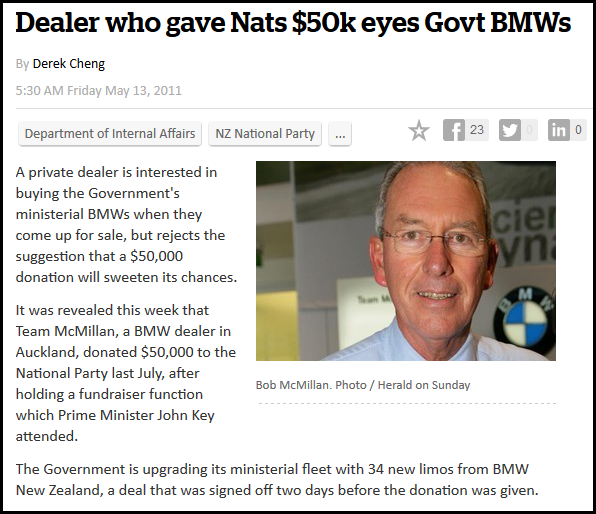
.
Whether or not the purchase went ahead is unclear.
Farms
In 2010 and late 2011, another apparent conflict of interest was reported when Shanghai Pengxin put in a bid for the Crafar dairy farms. Shanghai Pengxin, under various guises, gave hundreds of thousands of dollars to the National Party;
.
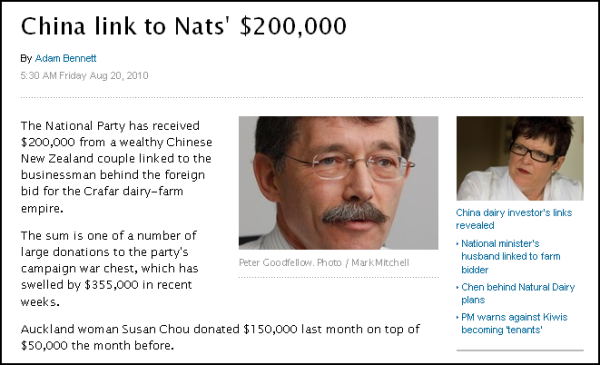
.
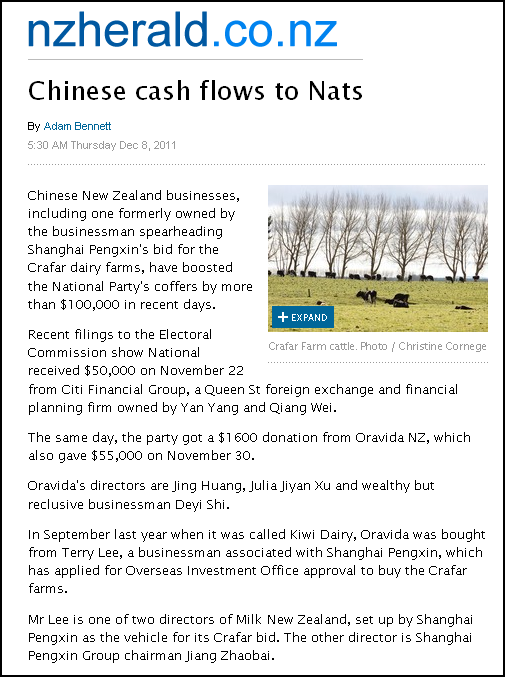
.
A full analysis of the links between Oravida, Crafar Farm purchase, and the National Party was reported in a previous blogpost here; Doing ‘the business’ with John Key – Here’s How (Part # Rua).
Conclusion
Whilst details are hard to confirm by the very nature of these highly secretive deals – many made informally – the questions arising from these (and other) murky ‘arrangements’ is sufficient to underscore a recent downgrading of our Transparency International Corruption Perception Index;
.
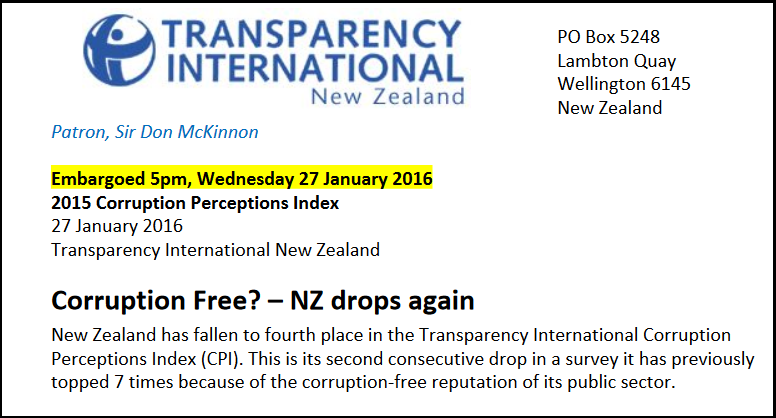
.
We have had sufficient number of glimpses into dubious activities that hint at corrupt practices. Even fourth place on the Transparency International Corruption Perception Index may be wildly optimistic.
As the Saudi farm-bribe and use of GCSB to spy on behalf of Tim Groser has shown, National is not averse to employing dodgy practices and dirty deals to enrich itself or what it perceives may “benefit” the country (and consequently it’s re-election chances).
There are simply too many coincidences to ignore the inescapable conclusion: it is my considered opinion that National has benefitted financially from several commercial/government transactions.
Our political system has been tainted with corruption.
.
.
.
Addendum1
As at 21 April, the so-called “Taxpayers Union” – a self-appointed group of “watchdogs” to protect public interest from political corruption and waste of taxpayers’ money, had made no comment on the Niue Scandal;
.
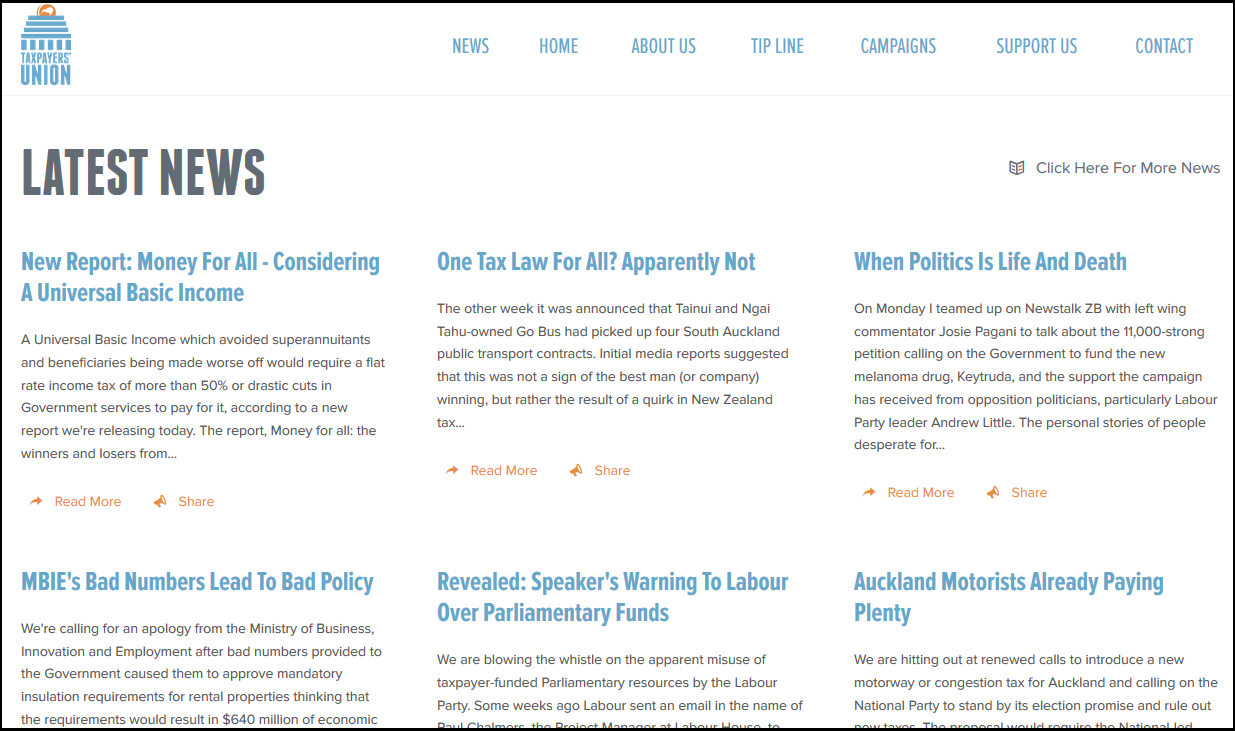
.
The “Taxpayers Union” had condemned the Universal Basic Income; had a ‘go’ at Maori Iwi; lambasted Labour; criticised MoBIE; and several other attacks on perceived “wrong-doing”.
But not a peep on the Niue scandal.
But considering that the “Taxpayers Union” is made up of National Party apparatchiks and supporters, that is hardly surprising.
.
.
.
References
Radio NZ: Call for inquiry into Niue resort contract
Radio NZ: Contract not linked to donation – Scenic Hotel
NZ Herald: Labour questions $101,000 National donation and Niue resort management contract links
Radio NZ: PM not worried about Niue resort deal
Fairfax media: Ministers knew of BMW buy-up last year
Fairfax media: PM signed papers relating to BMWs
NZ Herald: Dealer denies donation link
Radio NZ: PM rejects claim donation linked to BMW upgrade
Transparency International (NZ): Corruption Free? NZ drops again
Fairfax media: Auditor-General had doubts Saudi sheep deal was legal
NZ Herald: GCSB spies monitored diplomats in line for World Trade Organisation job
Additional
Scoop media: BSA decision – One News on Sale of BMWs
Newzealandinc: McMillan family sells half stake in Team McMillan to Tim Cook’s Collins Asset
Previous related blogposts
Know your Tory fellow travellers and ideologues: John Bishop, Taxpayers Union, and the NZ Herald
Doing ‘the business’ with John Key – Here’s How (Part # Toru)
Doing ‘the business’ with John Key – Here’s How (Part # Rua)
Farms, politicians, and emails
A Query to the Taxpayers Union – ***UP DATE ***
User Pays: the eventual conclusion
.
.
.
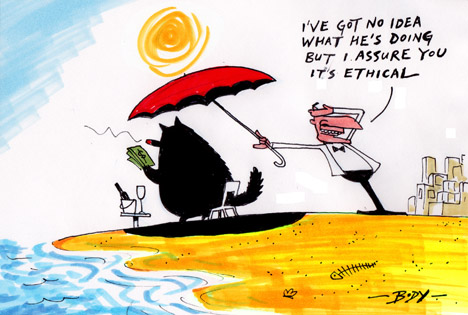
.
This blogpost was first published on The Daily Blog on 22 April 2016.
.
.
= fs =
Letter to the editor – In response to Orwellian National Supporters
.
.
I see that National Party apparatchiks are up to their usual disingenuous tricks, trying to suggest that Labour was a worse manager of the New Zealand economy than National;
.

.
As many are already aware, quite the opposite is true. I replied, presenting a few salient facts to the Tory fan-boi;
.
from: Frank Macskasy <fmacskasy@gmail.com>
to: Dominion Post <letters@dompost.co.nz>
date: Thu, Feb 11, 2016
subject: Letter to the editor.
The editor
Dominion Post.
I see that Roger Mitchell of Clive is parroting the right-wing myth that Helen Clark “must have wised up considerably since steering New Zealand on to the rocks, with Labour’s help, of course, and we have been going full astern ever since”. (Letters, 9 Feb)
In fact, during Labour’s administration, from 2000-08, their economic track record was enviable by today’s standards;
* paying down sovereign debt to around $15 billion, in the mid-2000s, to National’s debt-splurge of $54.7 billion as at June last year. (Much of it to pay for tax-cuts in 2009 and 2010)
* Government Debt-to-GDP was 14.5% in 2007, and is now at 38%,
* Labour’s Finance Minister Michael Cullen posted nine surpluses. Bill English has posted one, and even that was achieved by cutting state services.
* unemployment stood at 78,000 (3.5%) in 2007/08, compared to 133,000 (5.3%) today.
* GDP growth reached 5.5% in July 2004 – whilst reaching a temporary peak of 3.5% in January last year.
* According to Statistics NZ, home ownership fell from 54.5% in 2006, to 49.9% in 2013.
* Meanwhile, those renting increased from 33.1% in 2006 to 35.2% in 2013. Housing affordability has worsened in the last few years.
It may suit the agenda of National Party loyalists to indulge in fanciful Orwellian re-writing of recent history, but the facts speak for themselves; Labour was the more effective manager of this country’s economy.
.
-Frank Macskasy
[address and phone number supplied]
.
.
.
References
NZ Productivity Commission: Housing affordability
NZ Herald: Investment data shines spotlight on debt
Statistics NZ: 2013 Census QuickStats about national highlights – Home ownership
Trading Economics: Unemployment Rate
Trading Economics: Unemployed persons
Trading Economics: New Zealand Government Debt to GDP
Previous related blogposts
Labour: the Economic Record 2000 – 2008
A Tale of Two Track Records: Labour vs National #1: New Zealand GDP
.
This blogpost was first published on The Daily Blog on 11 February 2016.
.
.
= fs =
Public opposition grows against TPPA – Wellington
.
.
NZ, Wellington, 15 August – In an otherwise grey, gloomy sky, much-heralded rain made only a brief appearance with a few drops of moisture, as Wellingtonians and citizens from further afar congregated at Midland Park in the heart of the city. The first sign was held aloft on the footpath, just outside the park proper – an indication of what lay ahead;
.
.
Some artistry adorning poster roundels;
.
.
A damned good question posed on this placard;
.
.
A wide variety of other placards awaited bearers;
.
.
John Key has said that even if the medicines that Pharmac buys “cost a little bit more“, that government will pay for it and citizens will not have to pay a cent extra;
“If it did pay a little bit more, then the Government would fund that and New Zealanders would pay the same amount.”
Firstly – where does Key think the money comes from that Government would use to top up Pharmac’s drugs-bill in the event that the TPPA pushed up the costs of medication? From the bloody tax-payer, you Tory Twat!
Secondly, having to pay for increased costs of medicines would mean that other areas of healthcare would inevitably have their budgets cut.
And thirdly, Key is in no position to promise anything on keeping the cost of medicines down. His government has already increased the cost of Pharmac medicines in 2012 from $3 to $5.
Who on Earth would trust Key not to do it again?
.
.
The ‘Brass Razoo‘ band entertained the crowd, with “Uncle Scam” danced to the ominous sounding “Star Wars Imperial Theme“;
.
.
New Zealanders voicing their concerns over the secrecy over the TPPA;
.
.
If the deal is so good – why is the National Government keeping it secret from us? Negotiators from all participating counties know exactly what is in the texts. Only the public are not privy to the same information.
From a phrase that TPPA negotiator, Minister Tim Groser, has been known to use;
.
.
“Obama” being “arrested” by “pirates”, and charged with “treason”;
.
.
The media was well represented, and both TV channels gave good coverage of the protests up and down the country;
.
.
From younger to older generations;
.
.
The Park quickly filled. Numbers swelled well beyond previous anti-TPPA protests;
.
.
Marchers moved through Wellington’s CBD, growing in number along the way;
.
.
Traffic came to a standstill, as the procession wound along the length of Lambton Quay, toward Parliament;
.
.
Past the Cenotaph, where we commemorate fallen soldiers who made the ultimate sacrifice for our sovereignty;
.
.
Once again, as with past protest marches, the main gates to Parliament were firmly locked…
.
.
… forcing thousands of citizens to squeeze through two narrow side gates. The contempt shown by those in ‘Authority’, to the New Zealand people exercising their lawful right to protest, is unmistakeable.
.
.
With young citizens leading the way…
.
.
– the grounds rapidly filled with people;
.
.
Numbers ranged from Radio NZ’s 3,000 to Fairfax’s 5,000 in attendance. The northward view;
.
.
The southward view;
.
.
It was interesting (and refreshing) to see the large numbers of families and young people present. This was not simply a turn-out of the usual, committed, anti-TPPA activists – these were citizens expressing their disquiet (and outright opposition) over a deal being negotiated in secret, and which would have far-reaching ramifications for our society.
Tangata Whenua showed their concerns at the secret TPPA deal-making that was going on in our name, behind closed doors;
.
.
Secretary of the NZ Council of Trade Unions, Sam Huggard, explained why the TPPA would be bad for workers rights. He gave the example of trans-national corporations suing the Egyptian government for merely trying to implement a minimum wage;
.
.
“The big corporations, when they were cooking up this agreement in their high rises in Wall Street and Washington DC, and the politicians like John Key and Tim Groser who do their bidding, were hoping that the agreement would go through without this level of dissent. We weren’t meant to have a say, that wasn’t in their model.They weren’t counting on the health sector mobilising over access to medicines. They didn’t want Maori mobilising to question how Treaty of Waitangi protections were being affected by this secret agreement. They were hoping the tech sector wouldn’t get organised around the impact on copyright laws. And they didn’t want to see unions critiquing the anti-worker provisions in the TPPA, like the Investor State Dispute Settlement (ISDS) provisions, provisions that were recently used against the government of Egypt – sued by French multinational Veolia Group in response to Egypt increasing the minimum wage.None of this was part of the plan. They wanted the agreement to go through quietly. But we wont let that happen.”
Gay Keating, from Doctors for Healthy Trade, explaining why the TPPA will harm healthcare in New Zealand;
.
.
“Someone did the sums that its going to cost a billion over ten years if they stretch out the costs for the length of patents.
[…]
One of the things that’s pushed so many people in the health sector into being absolutely furious about this agreement is that is the wayit’s going to push people who are healthy, into sickness.
And it’s the processes which make it more difficult for countries to bring in controls on unhealthy products.
You’ve all heard about the $50 million pricetag that Australia’s facing in terms of Stage One of the fightback [by] the tobacco companies.
That’s what we’re signing up to in this agreement.
[…]
The biggest health threat of our century and our children’s century and our moko’s century is climate change.
We need to be able to control greenhouse gases and we need not be handcuffed.
Our government must not be handcuffed for health.”
Todd Rippon, from Actors Equity NZ, detailed how a previous “free trade” agreement had reduced the amount of locally produced drama on our television screens. He said the TPPA would be even worse;
.
.
“Performer’s lives are directly affected by trade policy. We have been hit hard with the blunt end of a big stick by that World Trade Organisation deal.
We know what it feels like to be cast aside to make way for extremely rich US corporations. I think you know what I’m talking about, yeah?
Signing the TPPA will not only make a bad situation worse for us performers, but it’ll make it worse for virtually every aspect our beautiful country.
Every aspect of our beautiful, tiny, vulnerable country.
Nothing will be untouched.
You name it; health, environment, education, Treaty obligations – no way. They will be wiped out in the name of international profiteering.
Don’t let that happen!”
Documentary producer, Bryan Bruce, was well-received by the crowd and spoke well about the nature and problems of the TPPA. He condemned the potential eight to ten year extension of patents for medicines, saying that this would inevitably lead to people dying needlessly for want of treatment;
.
.
“What’s on the table is human misery. The poor have as much right to health as the rich.
Bryan concluded with this warning for National if they went ahead and passed the TPPA;
“We will not forget and we will not forgive them.”
To listen to Bryan’s thought-provoking speech, go to Mick McCrohon’s video on Youtube.
Blues singer, Darren Watson and Delia Shanly on drums entertained the assembly with a rendition of ‘Planet Key’. The words were slightly amended to reflect on the issue-of-the-day. He also sang another of his original songs, ‘I Got Your Office Right Here‘, full of satire and good natured poking-fun-at-John Key.
.
.
One lone female protestor managed to evade the barriers and Parliamentary security. She made her way to the top of the steps and sat down, adopting a peaceful meditating-position;
.
.
Other protestors also jumped or skirted the barriers to dance on the Parliamentary forecourt, as Mick McCrohon’s video on Youtube shows.
It should be pointed out that though protestors “breached the security cordon”, they did not – as the Police and Mainstream Media have reported – try to “storm the steps of Parliament”. That never happened. (In fact, if any mainstream media were present when this occurred, I did not witness their presence.)
A video-recording in my possession clearly shows young people rushing to the steps, and then sitting down on the first half dozen steps – before police arrived to reinforce the half-dozen Parliamentary security guards standing over the protestors. The handful of protestors made no effort to “storm” the steps, as some have mistakenly claimed. They stopped and sat down before Police arrived (which my video also clearly shows).
See: Citizens face Police armed with tasers at Wellington TPPA protest march
Eventually, the protest ended and the good people of Wellington (and further afield) dispersed;
.
.
As they arrived, they departed; in peace.
Let us hope that this National government has received the message they left.
.
.
.
References
Parliament: Little, Andrew – Oral Questions — Questions to Ministers
Fairfax media: Prescription cost to rise to help pay for Budget
Parliament: 7. Trans-Pacific Partnership—Scope of Negotiations and Release of Information
Huffington Post: Corporate Courts – A Big Red Flag on ‘Trade’ Agreements
Youtube: TPPA PROTEST Wellington 15th.August 2015 Speaker Bryan Bruce
Youtube: TPPA Protest – Dancers Storm The Barricades At NZ Parliament Building
Acknowledgement
Appreciation to Mick McCrohon‘s Youtube video’s, to complete this report.
Main Stream Media
Fairfax media: Thousands march against TPP trade agreement
NZ Herald: Thousands rally against TPP across New Zealand
Otago Daily Times: Thousands turn up to rally against TPP
RadioLive: Thousands urge govt. to ditch TPPA
Radio NZ: Thousands turn out to protest TPP
TV3 News: Thousands march against TPPA deal
TVNZ News: TPP protesters push through barriers at Parliament
Previous related blogposts
Citizen A – 29 Nov 2012 – TPPA Special
TPPA: Business launches propaganda campaign
TPPA: Doomsday scenarios, Critics, and flights of fancy
Open message to the Middle Classes about the threat of the TPPA
Nationwide Rally Against the TPPA – Day of Action!
They marched against the TPPA and the threat to our sovereignty (part tahi)
They marched against the TPPA and the threat to our sovereignty (part rua)
The Mendacities of Mr Key #5: Has Tim Groser shown the P.M. to be a liar on the TPPA?
Nationwide Day of Protest Captures Public Attention on TPPA
Opposing the TPPA – the Heavens hold their deluge ’till the People speak
Citizens face Police armed with tasers at Wellington TPPA protest march
Other blogs
No Right Turn: Help end TPP secrecy
Theocracidal: Thousands Protest TPPA, Cthulhu’s office minions hide under desks
The Standard: Groser – an arrogant git with a tin ear
The Standard: TPPA Protest review
Support groups
Facebook: Oil Free Wellington
Facebook: It’s Our Future – Kiwis concerned about the TPPA
Website: It’s Our Future
Facebook: Aotearoa is Not for Sale
Action Stations: A Secret Trade Deal So Terrifying That Parliament Isn’t Even Allowed To Know What It Says
Facebook: TPPA Action Group – Wellington
OraTaiao New Zealand Climate and Health Council
Copyright (c) Notice
All images stamped ‘fmacskasy.wordpress.com’ are freely available to be used, with following provisos,
» Use must be for non-commercial purposes.
» Where purpose of use is commercial, a donation to Child Poverty Action Group is requested.
» At all times, images must be used only in context, and not to denigrate individuals or groups.
» Acknowledgement of source is requested.
.
.
.
.
This blogpost was first published on The Daily Blog on 17 August 2015.
.
.
= fs =
2014 Election – Post-mortem Up-date
.
.
Counting of Special Votes are completed and the Electoral Commission’s final election results have been announced;
National: 47.04 (60 seats – down 1)
Labour: 25.13 (32 seats – no change)
Green Party: 10.70 (14 seats – plus 1)
NZ First: 8.66 (11 seats – no change)
Maori Party: 1.32 (2 seats – 1 electorate, 1 List – no change)
ACT: 0.69 (1 electorate seat – no change)
United Future: 0.22 (1 electorate seat – no change)
Conservative: 3.97 (nil seats – no change)
Internet Mana: 1.42 (nil seats – no change)
It is interesting to compare the 2014 results with the 2011 Election figures;
.
.
Other results
2011: 93.7%
2014: 92.6%
2. Total Votes counted by Electoral Commission:
2011: 2,278,989
2014: 2,416,481
Increase: 137,492
3. Voter turnout (as a percentage of enrolled electors):
2011: 74.2%
2014: 77.9%
4. Advance votes cast:
2011: 334,558 (14.7% of voters)
2014: 717,579 (29.33% of voters)
Increase: 383,021
Observations
National
National lost it’s overall majority in the House, though with ACT’s single MP (and to a lesser degree, Peter Dunne), they will most likely still maintain a de facto majority regardless.
My belief is that National’s party strategists were acutely aware that once Special Votes were counted, they would lose their 61st MP, Maureen Pugh. This was a re-play of the 2008 and 2011 elections, where election night results were only temporary, and National’s numbers were pared back (usually by one seat) after the counting of special votes.
Little wonder that Key and National Party strategists have been very, very, very eager to form coalition deals with ACT, Peter Dunne, and the Maori Party. Despite Key’s noble-sounding public pronouncements,
“It’s more about, you know, the kind of inclusive government we want to have other parties working with us…[…]
But equally, we sort of know each other quite well now, after six years we got a bit of a sense of the areas of importance and significance to each other and in a perfect world we don’t want to pass legislation 61 [to] 60 votes the whole way through, we do want to work with other people.”
Yeah, right, whatever. Key wasn’t being “inclusive” or “magnanimous” – he was playing his cards right, knowing full well what the Electoral Commission was going to deal out to his Party two weeks after Election night results.
National’s coalition deals with three minor parties was their “insurance policy”.
For the next three years, Key will be praying nightly to the political gods for all his MPs to remain alive, loyal, and healthy (in that order). At 60 Members of Parliament out of 121, National cannot afford too many by-elections or defections.
ACT
Not just on political life-support by the good graces of the National Party, but more importantly, ACT’s 7,200 drop in their Party vote signifies New Zealanders’ lack of appetite for any further right-wing, neo-liberal “reforms”.
This is something Key and National Party strategist should take careful note of. National’s increase in support may reflect a current preference by voters for a “steady-as-you-go” regime – not further radical moves to the Right.
It is also something that Left-Wing parties should take note: New Zealanders have expressed a subtle distaste for neo-liberalism. We need to capitalise on that.
On a side-issue, if ACT’s Party Vote is destined to reside with a tiny hard-core element of incorrigible, fanatical, right-wing voters, then what is the value of gifting Epsom to ACT if no other candidate will coat-tail into Parliament on the success of someone like John Banks or David Seymour?
There can only be one possible benefit to National: ACT is the “trojan horse” whereby unpopular right-wing policies (eg; Charter Schools) can be introduced as part of sham “coalition negotiations”. As Cameron Slater’s malicious right-wing blog was used to conduct “second track” vicious attack politics on National’s enemies, ACT’s usefulness lies in enacting right wing policies Key may not wish to be closely associated with.
United Future/Peter Dunne
UF’s drop in it’s Party Vote – by well over a half – signifies that voters see Dunne fully as a one-man band. He may continue to win Ohariu on Electorate Votes, but his low Party Vote results preclude any other UF candidates “coat tailing” into Parliament on Dunne’s localised success.
A Party Vote for UF has therefore become a “wasted” vote, and eventually National will ask itself a question, “Why are we supporting Dunne when we might as well go hard out to win the seat ourself, with one of our own candidates?” When the Nats cannot even pin unpopular policies on Dunne – what is his purpose to the centre-right bloc?
As well; the day that Green Party voters wake up to the reality that supporting the Labour Candidate, instead of their Green candidate, with the Electorate Vote, is the day Dunne loses his seat. His presence in Parliament is based purely on some Ohariu Green voters voting shambolically rather than tactically.
Mana-Internet
Interestingly, the Mana-Internet alliance was the only electorate-based Party to actually increase their overall Party Vote: from 24,168 in 2011 to 34,095 on 20 September. ACT and United Future between them lost much of their support. And whilst the Maori Party lost only 132 Party Votes – they lost two electorates; Tamaki Makarau and Te Tai Hauauru to Labour.
As history shows, Hone Harawira only lost his seat – Te Tai Tokerau – after Labour’s candidate was endorsed by John Key and Winston Peters, along with some very shady back-room dealings by the Maori Party.
Subsequently, the mainstream media, indignant commentators, etc, all piled on to the battered and bruised body of Mana, the Internet Party, Kim Dotcom, and Hone Harawira. However, New Zealanders should never forget;
- Through Kim Dotcom’s refusal to buckle to State power, we discovered that the GCSB had been illegally spying on 88 New Zealand citizens.
- After Kim Dotcom’s efforts, we now know that mass surveillance is being undertaken in this country. This is the new reality which the media seems to have over-looked (as per usual) in their constant demands for sensationalistic news stories (as if living in a mass-surveilled society wasn’t sensational in it’s own right).
- Yes, Kim Dotcom did fund the Internet Party to the tune of around $3 million.
- Compare that to National spending $2,321,216 from wealthy benefactors for the 2011 general election.
- And contrast with the $60,082 Mana spent at the same time. When did the media ever question the David-VS-Goliath battle between National and Mana in 2011? The answer is blindingly obvious.
New Zealand has a fine tradition of giving people a fair go.
We like to think we help one another.
There is also a darker side to our nature. Some call it “The Tall Poppy Syndrome”.
I call it bullying.
Less words. Same meaning.
Something Patrick Gower might reflect on.
Conservative Party
Whilst I am no fan of Colin Craig and his ill-considered mish-mash of populist and right wing policies – I do recognise that National’s on-going refusal to carry out reforms to MMP – as recommended by the Electoral Commission in 2012 – is persistently creating bizarre and undemocratic results.
The Conservative Party polled 95,598 Party Votes – three times as high as the Maori Party, which was able to bring in a second MP on Te Ururoa’ Flavell’s “coat-tails”. Yet the Conservatives have no MPs, despite out-polling the Maori Party.
(Yes, I understand that the Conservatives achieved only 3.97% of the Party Vote. But who is say they would not have gained extra votes had the Party threshold been dropped to 4%, as the Commission recommended?)
Green Party
Of the left-wing parties, the Greens fared better than Labour or Mana-Internet. Clearly, their extra 9,986 Party Votes came from Labour’s drop of 10,402 votes. Their campaign was well-targetted; they stayed consistently on-message; and their Party was not under-mined by loose-cannon-candidates engaging in open sabotage. (ref)(ref)(ref)
At 257,356 Party Votes, the Greens increased their support from their 2011 result ( 247,370 Party Votes). Their overall percentage dropped only because the overall number of Party Votes cast increased this election by 137,492.
NZ First
NZ First benefitted from the increase in voting this year. The scandals exposed in “Dirty Secrets“, and the political fallout that affected Labour, escaped Winston Peters who has continually portrayed himself as “above petty politics”.
Peters, however, was not quite sufficiently “above petty politics” to under-mine Mana Leader, Hone Harawira, in his bid to retain Te Tai Tokerau. By endorsing Labour’s Kelvin Davis, Peters plotted with John Key and the Maori Party in an unholy, manipulative, venal triumvirate to destroy the Mana Movement.
Peters can get down and dirty with the worst of them, it seems.
Like Peters’ broken promises post-1996, the public will soon forget Peters’ quiet treachery. Unfortunately.
Labour
Ye gods, where does one start…?!
- The billboards which promoted electorate candidates – and mentioned the all-important Party Vote in barely-discernible small letters?!
- The constant attacks on a potential coalition support-partner by Labour candidates?!
- Allowing certain media political commentators to frame the narrative on coalition partners – thereby forcing Cunliffe to look too eager to “do the right thing” according to certain pundits?! (ref)(ref)(ref)
- Engaging in internecine warfare, whether pre or post-election – simply the most futile act that Labour could possibly engage in. Did they think no one would notice?
- Changing the leader, post-election. Does that mean Labour never had confidence in Cunliffe in the first place, and this his appointment was a mistake? Does that mean Cunliffe’s replacement may also be a mistake? Does it mean Labour has 100% confidence in their new Leader – until they don’t? So… why should the public have confidence in Labour’s new choice of a new Leader, when s/he may be temporary?
Perhaps Labour’s worst mistake of all the above was constantly deriding the Mana-Internet alliance. The constant attacks on Hone Harawira and his Party signalled to the public that Labour was weak; full of self-doubt and lacking in self-confidence. Labour’s desperation for votes was so dire that they were willing to attack and destroy a potential coalition ally, to cannibalise their electoral support.
That showed weakness.
And the public took note.
Contrast Labour’s treatment of Hone Harawira and Mana-Internet, with how John Key related to ACT, United Future, and the Maori Party: with confidence; courtesy; and collegiality.
When Key refused to make a deal with Colin Craig’s Conservative Party, he did so with professional courtesy. There was never any rancor involved, and despite refusing any Epsom-like deal, Key still left National’s options wide open to work with the Conservatives.
Key even flip-flopped on his previous hand-on-heart promise never to entertain any coalition deal-making with Winston Peters;
“I don’t see a place for a Winston Peters-led New Zealand First in a government that I lead,” – John Key, 2 February 2011
When the public looked at Key, they saw a politician who said categorically he would be prepared to work with anyone.
The public liked that. The public want politicians to work together for the good of the country. Key not only said as much – he demonstrated it by working with parties as disparate as ACT, the Maori Party, United Future, and the Greens (though the latter not in any formal coalition agreement).
When the public looked at Labour, they saw a left wing party willing to consume another left wing party, to further their own selfish agenda.
Key showed collegiality and co-operation.
Labour exuded desperation.
Whoever leads the Labour Party after 18 November – take note.
Media
The closet, political “party” in this election – the mainstream media. Acting much like a ‘spoiler’ for the Left, it did it’s damndest to engage in “gaffe” journalism; focus on trivia (scarves, holidays, etc); and failed to chase up real stories when they hit the public.
The nadir of junk ‘journalism’ came when Mike Hosking interviewed both Nicky Hager and National Minister, Steven Joyce, on 14 August, over revelations contained in the expose, “Dirty Secrets“.
As I wrote previously, when I reviewed this segment of “Seven Sharp”;
I encourage people to watch the opening segment, where Mike “interviews” Minister Steven Joyce, and then interogates and derides author, Nicky Hager.
Any pretence that Mike Hosking is an “unbiased journalist” has been firmly dispatched. The man is a mouthpiece for the National government and his behaviour and line of questioning proved it.
.
.
Nicky Hager’s investigations have uncovered practices that can only be described as an abuse of power by this government.
Did Hosking ask challenging questions to the Minister? Answer: no.
Did Hosking put specific examples requiring explanations to the Minister? Answer: no.
Was Hosking’s line of questioning relevant to the book and offer insights to the viewer? Answer: no.
Hosking then asked hard questions from Nicky Hager, who to his credit realised that he was being set up as the “fall guy” for the story.
This was not journalism. Not even close. It was superficial, Fox-style partisan politics masquerading as “informed debate”. Again, not even close.
The only television I have seen in my life that came close to Hosking’s slanted, pro-government performance was during my visits to Eastern European countries in my late teens/early twenties. In those times, Eastern Europe was ruled by well-policed, undemocratic, One Party “communist” regimes. Television “news” was little more than a mouthpiece for the government – no questions asked. There was never even an attempt at balance.
Hosking would have fitted in perfectly.
As far as I am concerned, Hosking’s “talent” lies elsewhere, but not in journalism. Perhaps a PR/spin-man for a cereal company or arms manufacturer or bordello run by the Chow Brothers (he’s already sold his soul, so the other bodily bits should be equally saleable).
On The Daily Blog, on 3 October, Keith Rankin made this pertinent observation
Note that the apparent conservatism of the mainstream media is due it being almost completely bound to the prevailing consensus; far more bound to it than even the politicians themselves.
“So once again the blue team gets one over the red team.Yes, it’s cringey, but it’s left Cunliffe looking whingey.”
References
Electoral Commission: 2014 General Election – Official Result
Wikipedia: New Zealand general election, 2011
Electoral Commission: Party Votes and Turnout by Electorate
NZ Herald: Final election results in – National loses majority
Dominion Post: National loses majority, Greens pick up one
NZ Herald: Special votes see Greens gain seat, Nats lose
NZ Parliament: The 2011 General Election
TVNZ ‘Breakfast’: Coalition deals signed – ACT and United Future
Radio NZ: Big change in Maori seats
Dominion Post: Lots left to be desired
Twitter: Patrick Gower
NZ Herald: Govt rejects recommendations to change MMP system
NZ Herald: MMP review recommends lower party threshold
Scoop Media: Māori Party’s first list MP Confirmed
TV3 News: Labour candidate makes more ‘Shylock’ comments
Fairfax media: Mallard’s mad Moa blurt
Fairfax media: Winston Peters backs Labour’s Kelvin Davis
NZ Herald: Election 2014 – Hone’s call to arms after Winston backs Kelvin
Fairfax media: Kelvin Davis blasts Mana Party (alt. link)
TV3 News: David Cunliffe owns up to getting it wrong
TVNZ: David Cunliffe stands by decision to take family holiday
Election Ads: James Dann – Labour Party – 2014 General Election
Frankly Speaking: The secret of National’s success – revealed
Scoop Media: Patrick Gower interviews Labour leader David Cunliffe
Radio NZ: Cunliffe says no to Internet-Mana
TV3 News: Cunliffe – Labour, NZF, Greens ‘will work’
NZ Herald: Cunliffe on Dotcom – ‘We have nothing to do with him’
TVNZ News: No deal – Key leaves Colin Craig out in the cold
Fairfax media: Possible coalition line-ups after election
TVNZ News: Winston Peters not grabbing John Key’s olive branch
NZ Herald: PM rules out any NZ First deal
TV3 News: Cunliffe apologises ‘for being a man’
The Daily Blog: When the media say they covered Dirty Politics – did they?
TVNZ: Seven Sharp 14 August
The Daily Blog: National Party Spice Boys
TV3 News Bulletin: Tuesday 30 September 2014
TV3 News: Key nestles in with the All Blacks
Previous related blogposts
Winston Peters recycles pledge to “buy back state assets” – where have we heard that before?
The secret of National’s success – revealed
Election 2014; A Post-mortem; a Wake; and one helluva hang-over
Patrick Gower – losing his rag and the plot
“Dirty Politics” and The Teflon Man
The Donghua Liu Affair – The Players Revealed
.
Above image acknowledgment: Francis Owen/Lurch Left Memes
This blogpost was first published on The Daily Blog on 6 October 2014
.
.
= fs =
National’s fund-raising at Antoine’s – was GST paid?
.
.
On TV3’s The Nation, Key steadfastly refused to make public the names of donors to various fund-raising events (or pay back) at Antoine’s restaurant in Parnell, Auckland.
Instead of using a Trust, where the names of donors are kept hidden, in this case Antoine’s Restaurant – whose owner is a well-known National Party supporter, Tony Astle – was the “bag man” who took the money; banked it; and then passed it on to the National Party as a donation. These donations were recorded with the Electoral Commission for 2010*and 2011*.
However – and here’s an interesting questing question that few (if any) have asked; was GST paid by Mr Astle on any of the monies ($60,000 and $105,000) received in payment for the meals?
A donation made directly to a political Party does not incur GST. But Inland Revenue (IRD) is quite clear of what constitutes a donation;
A donation is an unconditional gift only if the giver receives nothing in return.
But these monies were received from people attending the dinner and who paid for their meals accordingly. They received a ‘goods’ and ‘service’ in return for payment.
It is no longer an “unconditional gift”.
So those meals should have incurred GST.
(What Mr Astle then does with those monies, excluding GST, is his business, and he subsequently gifted it to the National Party as a donation.)
Accordingly, I have made an inquiry with Inland Revenue on this matter;
.
Information about a business
| Business or trade name: | Antoine’s Restaurant | |
| Business IRD/GST number: | Not provided | |
| Address – business: | Street: 333 Parnell Road | |
| Suburb, city or town: Parnell, Auckland | ||
| Phone number: | (09) 379 8756 | |
| Mobile number: | Not provided | |
| Description of the business: | restaurant | |
| Provide your detailed information: |
Kia ora Mr Taxman, It has recently been revealed in the media that Antoine’s Restaurant in Parnell, Auckland, hosted a series of fund-raising dinners on behalf of the National Party. One dinner event, in 2010, was attended by 21 people, where each person paid $5,000 to participate in the meal. The restaurant collected $105,000 from attendees. Another event, in 2010, a sum of $60,000 was paid to the restaurant for a similar event. Considering that the monies paid was for a meal; paid to Antoine’s directly; this appears to have been a good and service provided to paying members of the public. Was GST paid on these transactions? Regards, -Frank Macskasy |
|
.
You’ve successfully submitted your information.
Your information was received on Sunday, 9 March 2014 2:24:30 PM NZDT. This form is now completed.
Your reference number is: 208194.
It remains to be seen if Mr Astle paid GST on payments received for those meals. If 21 people paid $5,000 each, that comes to $105,000.
GST on that sum (in 2010), at 12.5%, would have amounted to $13,125.
Yet, the Donations Return for 2010 clearly shows that the full amount of $105,000 was transferred from Antoine’s/Astle to the National Party. No deduction has been made for GST.
.
*
.
* Interesting Note:
The 2011 Party Donations Return for National also includes two payment by Oravida;
.
.
This is the same Oravida that National Minister, Judith Collins, recently visited in China – and of which her husband is a Director. Other donors on this Return also have links to Oravida.
The 2010 National_Party_donations Return also included a donation by one, Susan Chou, who is also connected to Oravida,
.
.
When it comes to ‘tricky’ – National excels with undisputed mastery of Big Time Tricky.
.
*
.
References
TV3: Key not talking about fundraising dinner
NBR: Key under fire for Antoine’s donations
Electoral Commission: New Zealand National Party donations 2011.pdf
Electoral Commission: National_Party_donations_2010.pdf
IRD: Business income tax
TVNZ: Judith Collins defiant amid claims of conflict of interest
Previous related blogposts
Doing ‘the business’ with John Key – Here’s How (Part # Rua)
Other blogs
No Right Turn: “Out of the blue”
.
*
.
Above image acknowledgment: Francis Owen
This blogpost was first published on The Daily Blog on 10 March 2014.
.
.
= fs =
If this isn’t corrupt – what the f**k is?!
.
Source: Fairfax media – Peters slams National’s house buy
.
The National Government selling a state-owned property to itself?!
This is the kind of practice that is best synonymous with Third World or ex Soviet republics, where corruption is rampant.
Now we are witnessing corruption by National ministers, Party officials, and their equally culpable apparatchiks.
Who would have thought that we would see this kind of thing here in New Zealand? And how do National Party members and supporters justify this kind of corrupt behaviour?
Perhaps it is time for Transparency International – the global corruption monitoring organisation – to reconsider our rating.
A message to Mr Peters;
Post the 2014 election, if you hold the balance of power, will you align yourself with a self-serving, discredited Party that has no compunction to act corruptly?
Will you cosy up to a Party that has engaged in unpopular legislation; ignoring public opinion; attacked critics; extended State surveillance power; and is now stealing public property for their own purposes?
Do you want yourself and your Party associated with this kind of corruption?
You have some deep thinking to do after next year’s election. Choose wisely.
.
.
= fs =
Booze-ups, brain-fades, and bullying
.
Acknowledgment: Fairfax Media – Apology over MP’s flare-up in restaurant
.
Hmmm, another brain-fade from a National MP?
As if a bit of booze-fuelled bullying wasn’t enough, Mr Gilmore seems to have been afflicted with the Key Brainfade Syndrome. If I was the Diplomatic Protection Squad, I’d be checking the water-jugs in National’s caucus room. There must be something in their water-suppy.
I shared my views with Fairfax’s The Press, in Christchurch,
.
from: Frank M <fmacskasy@gmail.com>
to: The Press <letters@press.co.nz>
date: Thu, May 2, 2013 at 12:21 PM
subject: Letter to The Editor.
The EditorTHE PRESS.Aaron Gilmore’s booze-fueled bullying and subsequent brainfade at a Hanmer Springs hotel is typical National’s attitude toward working people.
It’s not surprising Gilmore acted so atrociously – National’s culture of anti-worker disdain has been evident since 2008.
Current plans to undermine collective agreements by allowing employers to negotiate in bad faith, then walk away, is pure National policy. Returning to youth rates (which only displaces older workers) is another example.
None of this will increase wages, or create new jobs, as John Key promised;
“We will also continue our work to increase the incomes New Zealanders earn. That is a fundamental objective of our plan to build a stronger economy.” – John Key, 8 February 2011
As Bill English admitted on TVNZ’s Q+A, National welcomes falling wages;
“Well, it is a good thing if we can attract the capital, and the fact is Australians- Australian companies should be looking at bringing activities to New Zealand because we are so much more competitive than most of the Australian economy.” – 10 April 2011
Gilmore may’ve apologised for his crude behaviour, but National continues to bully and abuse workers through it’s pro Big Business policies. Time for Key to apologise and abandon it’s rightwing agenda.
.
-Frank Macskasy
(phone number & address supplied)
Note to Mr Gilmore: don’t ever call yourself a “man of the people”.
.
*
.
Additional
Facebook: Helen Kelly – Discussion Thread
References
TVNZ: Q+A – Guyon Espiner interviews Bill English – transcript
.
.
= fs =
Doing ‘the business’ with John Key – Here’s How (Part # Rua)
.
.
Continued from: Doing ‘the business’ with John Key – Here’s How
Once upon a time, at the bottom of the world, there was a small country that prided itself on being a fair, open, and uncorrupted society.
I’m no longer sure about the last bit.
Last year, Transparency International ranked New Zealand as the #1 least corrupt nation on Earth. We ranked above Denmark (#2), Finland (#3), Sweden (#4), Singapore (#5), and Norway (#6).
I’m no longer certain we deserve that top ranking, either.
The further that the Sky City/Convention Centre and Crafar farm deals are scrutinised – the stronger the odour of something unpleasant fills our nostrils.
To recap, let’s start with the Crafar farms deal with Shanghai Pengxin.
.
Tahi: Crafar Farms/Shanghai Pengxin/National Government
.
The timetime of the Crafar deal runs something like this,
5 October 2009: Crafar Farms placed into receivership, owing $216 million to creditors.
22 December 2010: Government blocks bid by Natural Dairy to buy the 16 Crafar farms on ‘good character’ grounds.
27 January 2011: KordaMentha accepts offer from Shanghai Pengxin International Group Ltd to buy Crafar Farms.
13 April 2011: Shanghai Pengxin lodges application with the Overseas Investment Office (OIO) to buy the Crafar farms.
26 September 2011: Crafar farms receiver KordaMentha rejects a conditional NZ$171.5 million offer for 16 central North Island dairy farms from a group led by controversial former merchant banker Michael Fay.
27 January 2012: Government ministers approve Shanghai Pengxin’s application to purchase 16 Crafar farms.
15 February 2012: High Court delays sale of Crafar farms to Shanghai Pengxin.
20 April 2012: Government ministers , Land Information Minister Maurice Williamson and Associate Finance Minister Jonathan Coleman approve the Overseas’ Investment Office’s (OIO) new recommendation to allow the sale of the 16 Crafar farms to Shanghai Pengxin.
At least, that is the version for public consumption.
Recent revelations indicate that much more was taking place behind the scenes. If we take that timeline and add the revelations that have come out in the last few months, the picture takes on a murkiness and a hint on something decidedly shady,
5 October 2009: Crafar Farms placed into receivership, owing $216 million to creditors.
2 December 2009: KIWI DAIRY CORPORATION LIMITED registered. (Then changes to ORAVIE LIMITED, 20 December 2010. Then changes to ORAVIDA LTD, 20 January 2011. Then changes to ORAVIDA NZ LIMITED, 13 May 2011. ) Shareholders: Jing Huang, Julia Jiyan Xu, and Deyi Shi. (Source)
11 June 2010: National Party receives $50,000.00 donation from Susan Chou. (Source)
30 July 2010: National Party receives $150,000 donation from Susan Chou. (Source)
18 November 2010: MILK NEW ZEALAND CORPORATION LIMITED* registered. Directors: Terry Lee and Jiang Zhaobai. (Source)
22 December 2010: Government blocks bid by Natural Dairy to buy the 16 Crafar farms on ‘good character’ grounds.
27 January 2011: KordaMentha accepts offer from Shanghai Pengxin International Group Ltd to buy Crafar Farms.
31 May 2011: National Party receives $100,000 donation from Susan Chou. (Source)
22 July 2011: ORAVIDA LTD registered. Shareholders: Jing Huang, Julia Jiyan Xu, and Deyi Shi. (Source)
27 July 2011: ORAVIDA PROPERTY LTD changes name to KIWI DAIRY INDUSTRY LTD. Shareholder: Deyi Shi (Source)
13 April 2011: Shanghai Pengxin lodges application with the Overseas Investment Office (OIO) to buy the Crafar farms.
26 September 2011: Crafar farms receiver KordaMentha rejects a conditional NZ$171.5 million offer for 16 central North Island dairy farms from a group led by controversial former merchant banker Michael Fay.
22 November 2011: National Party receives $50,0000 donation from Citi Financial Group. Shareholders: Yan Yang and Qiang Wei. (Source) (Source)
22 November 2011: National Party receives $1,600 from Oravida NZ. (Source) (Source)
26 November 2011: NZ General Election
30 November 2011: National Party receives further $55,000 donation from Oravida NZ. (Source) (Source)
27 January 2012: Government ministers approve Shanghai Pengxin’s application to purchase 16 Crafar farms.
15 February 2012: High Court delays sale of Crafar farms to Shanghai Pengxin.
20 April 2012: Government ministers , Land Information Minister Maurice Williamson and Associate Finance Minister Jonathan Coleman approve the Overseas’ Investment Office’s (OIO) new recommendation to allow the sale of the 16 Crafar farms to Shanghai Pengxin.
* “Milk New Zealand Holding Limited” is the official applicant and purchaser of the 16 Crafar farms. It is supposedly a subsidiary of Shanghai Pengxin,
” Applicant
3. The Applicant is Milk New Zealand Holding Limited (“the Applicant”), a Hong Kong incorporated company which is an overseas person under the Act.
4. The Applicant will register as an overseas company under the New Zealand Companies Act 1993 prior to acquiring the Investment. The Applicant does not have any current interests in New Zealand as at the date of this Application.1
1 The 99% ultimate owner of the Applicant, Zhaobai Jiang, has a [redacted]% interest in a company ([redacted*])that has applied for consent to acquire development land at [redacted] . No decision has yet been made on this application.” – Source
(*Note: Despite OIO redacting the second company, this blogger has found that it is actually “NATURE PURE LIMITED“. Terry Lee and Zhaobai Jiang are both listed as Directors.)
Despite numerous company name changes; newly registered companies; and a lengthy trail of shareholders, the one link that does stand out between Shanghai Pengxin and financial donations to the National Party is Terry Lee.
Mr Lee, along with Deyi Shi and Xing Hong, registered KIWI DAIRY CORPORATION LIMITED on 2 December 2009, which, after several name changes, ended up as ORAVIDA NZ LIMITED on 13 May 2011. Xing Hong was also a one time Director of ORAVIDA NZ LIMITED and ORAVIDA PROPERTY LIMITED.
Deyi Shi is still a current Director of both ORAVIDA NZ LIMITED and ORAVIDA PROPERTY LIMITED.
On 22 and 30 November, 2011, the National Government received donations totalling $56,600 from Oravida NZ Ltd.
A further $300,000 was donated to National by Auckland businesswoman, Susan Chou, who, through her husband Zhaowu Shen, had a connection with Jack Chen and NZ Natural Dairy Ltd – the first unsuccessful attempt by Chinese investors to gain control of the Crafar farms.
Two months later, on 27 January 2012, National approved the sale of 16 Crafar farms to Shanghai Pengxin subsidiary, Milk New Zealand Holding Limited.
Readers are invited to draw their own conclusions from the facts presented.
Continued at: Doing ‘the business’ with John Key – Here’s How (Part # Toru)
.
*
.
Sources & References
OIO: Decision required under the Overseas Investment Act 2005: Milk New Zealand
Holding Limited
CAFCA: December 2010 decisions
Elections NZ: Returns of party donations exceeding $30,000
Elections NZ: Returns of party donations exceeding $20,000
Interest.co.nz: Govt Ministers rubber stamp Overseas Investment Office approval of Shanghai Pengxin’s Crafar farms bid
Acknowledgements
Adam Bennett, NZ Herald: Chinese cash flows to Nats
Adam Bennett, NZ Herald: China link to Nats’ $200,000
.
.
= fs =
First blogged 28 April 2012
When is ‘Nanny State’ not a ‘Nanny State’?
.
… when National does it.
From one day ago,
.
Acknowledgement: Dominion Post – Young people banned from sunbeds
.
But when the previous Labour government attempted to improve the health of our children, National condemned it as,
.
Acknowledgement: Dominion Post – ‘Nanny state’ fears on health bill
.
When the previous Labour government tried to conserve energy use, National condemned it as,
.
Acknowledgement: Scoop – Showers latest target of Labour’s nanny state
.
Evidently it’s ok for National to pass laws controlling a legal (if somewhat unhealthy and dangerous) activity. The Nats are attempting to ban a group of young people from engaging in activity that older New Zealanders are still allowed to do.
But not for the previous Labour government when they wanted to replace unhealthy food with healthy food in school cafetarias/tuck shops.
In fact, when National took office in November 2008, they reversed the healthy foods policy in schools,
.
Acknowledgement: Fairfax Media – Schools’ healthy food rule scrapped
.
According to Ms Tolley – National’s Education Minister at the time – it was “up to parents and students to make decisions about healthy food”.
The Nats couldn’t wait to allow fatty, sugary, salty, artery-clogging, diabetes-inducing, garbage back into schools for our young children to consume. And shorten their life-spans by several decades, no doubt.
That was ok. No “nanny state” here, folks – junk food was given the Big Tory Tick.
But not sun beds.
Apparently, Associate Health Minister Jo Goodhew and her National colleague, MP Paul Hutchison, don’t mind putting on a “Nanny” frock and instructing under-18s that cooking themselves with UV radiation has been banned by Big Government.
I wonder if when this Bill comes before the House for it’s three readings, that Labour and Green MPs sitting opposite Ms Goodhew and Mr Hutchison will be quieting chanting…
“Nanny state… nanny state… nanny state… nanny state… nanny state… nanny state… nanny state… nanny state… “
Gowan. Do it.
You know you want to.
.

.
.
= fs =
Two polls, two governments
.

.
Two polls out recently give completely different outcomes if an election had been held over the last week or so.
One, the Roy Morgan poll would result in a change of government – whilst the Herald Digi Poll would (without overhangs) allow National to almost govern on it’s own. The results,
.
|
Roy Morgan Poll |
Herald Digi-poll |
|
| National |
43.5% (-4%) |
48.5% (+1%) |
| Labour |
32.5% (+2%) |
36.4% (+4.4%) |
| Greens |
13.5% (+1%) |
9% (-1.7%) |
| NZ First |
5% (+2%) |
2.5% (-3%) |
| ACT |
0.5% (n/c) |
0.1% (-0.1%) |
| Mana |
0.0% (-0.5%) |
0.5% (+0.2%) |
| Maori Party |
2% (-0.5%) |
1.1% (-0.4%) |
| United Future |
0.5% (n/c) |
0.0% (-0.3%) |
| Conservative Party |
2% (n/c) |
1.3% (-0.1%) |
| Undecideds/Wouldn’t Say |
5% |
11% |
(n/c = No Change)
.
Two polls, two outcomes, two governments. So which is more accurate?
In a previous blogpost (see: Three recent polls), a comparison was made between Roy Morgan, Colmar Brunton, and Ipson Poll. Of the three, Roy Morgan was closest to actual election day results in 2011.
So let’s compare Roy Morgan; the DigiPoll, and Election Day results,
.
|
Roy Morgan 24 Nov 2011 |
Digi Poll 25 Nov 2011 |
2011 Election results |
Closest Polling result |
|
| Right bloc: | ||||
|
National |
49.5% |
50.9% |
47.31% |
Roy Morgan |
|
Maori Party |
1% |
0.4% |
1.43% |
Roy Morgan |
|
ACT NZ |
1.5% |
1.08% |
1.07% |
Digi Poll |
|
United Future |
0.5% |
0.0% |
0.6% |
Roy Morgan |
| Left bloc: | ||||
|
Labour |
23.5% |
28% |
27.48% |
Digi Poll |
|
Greens |
14.5% |
11.8% |
11.06% |
Digi Poll |
|
Mana Party |
0.5% |
0.3% |
1.08% |
Roy Morgan |
| Other: | ||||
|
NZ First |
6.5% |
5.2% |
6.59% |
Roy Morgan |
|
Conservative Party |
n/r |
1.3% |
2.65% |
Digi Poll |
.
Roy Morgan was slightly more accurate than the Heral Digi Poll.
Interestingly, Roy Morgan seems to be the most accurate pollster when it comes to National, beating Herald DigiPoll, Colmar Brunton, and Ipsos.
Equally important to Roy Morgan’s polling for preferred Party, is polling for Satisfaction/Dissatisfaction for the government of the day – in this case, National.
Roy Morgan asks respondants,
“Generally speaking, do you feel that things in New Zealand are heading in the right direction or would you say things are seriously heading in the wrong direction?”
The results seem to back up National’s fall in preferred Party stats,
.
| New Zealand Roy Morgan Government Confidence Rating (Government of John Key): Interviewing Dates |
|
Jan 30-Feb 12, 2012 (post election) |
Jan 2-13, 2013
|
Jan 14-27, 2013
|
Jan 28-Feb 10, 2013
|
Feb 11-24, 2013
|
Feb 25-Mar 10,
|
|
| Right direction |
57% |
53.5% |
57% |
55% |
54% |
51.5% |
| Wrong direction |
30 % |
33.5% |
30.5% |
30.5% |
32.5% |
37.5% |
|
Roy Morgan GCR# |
127 |
120 |
126.5 |
124.5 |
121.5 |
114 |
| Can’t say |
13% |
13% |
12.5% |
14.5% |
13.5% |
11% |
| TOTAL |
100% |
100% |
100% |
100% |
100% |
100% |
#Roy Morgan GCR = Roy Morgan Government Confidence Rating (The Roy Morgan GCR is 100 plus the difference between the percentage of New Zealanders who say the country is “heading in the right direction” and the percentage who say the country is “seriously heading in the wrong direction”).
.
Acknowledgement: Roy Morgan Poll
Soon after the 2011 election, National rated highly with respondants, with 57% approval. Since then, except for a ‘blip’ at the beginning of the year, National’s approval rating has dropped from 57% to 51.5%.
Conversely, those expressing a view that National was headed in the wrong direction, rose from 30% soon after the 2011 election to 37.5%.
Those who Couldn’t/Wouldn’t say have dropped from 13% to 11% – meaning that people’s views on National are firming up – and becoming more pissed off.
Once Mighty River Power is part-privatised, expect to see National’s support plummet even further.
As this blogger has been predicting consistently; we will see a change of government in 2014 (if not earlier).
.
*
.
Previous related blogpost
Census, Surveys, and Cellphones
References
Final poll: Nats win looks certain, Winston over 5% (25 Nov 2011)
Roy Morgan Poll (18 March 2013)
Labour rises at expense of allies (21 March 2013)
.
.
= fs =
How to sabotage the asset sales…
.
Something I blogged on 25 June 2012, and now more appropriate than ever…
.
.
On last weekends’ (23/24 June 2012) “The Nation“, the issue of asset sales was discussed with NZ First leader, Winston Peters; Green Party MP, Gareth Hughes; and Labour MP, Clayton Cosgrove,
.
.
Whilst all three parties are staunchly opposed to state asset sales, NZ First leader, Winston Peters went one step further, promising that his Party would buy back the assets.
Gareth Hughes and Clayton Cosgrove were luke-warm on the idea, quite rightly stating that there were simply too many variables involved in committing to a buy-back two and a half years out from the next election. (And Peters never followed through on his election pledge in 1996 to buy back NZ Forestry – “to hand back the envelope”, as he put it – after National had privatised it.) There was simply no way of knowing what state National would leave the economy.
Considering National’s tragically incompetant economic mismanagement thus far, the outlook for New Zealand is not good. We can look forward to more of the usual,
- More migration to Australia
- More low growth
- More high unemployment
- More deficits
- More skewed taxation/investment policies
- Still more deficits
- More cuts to state services
- And did I mention more deficits?
By 2014, National will have frittered away most (if not all) of the proceeds from the sale of Meridian, Genesis, Mighty River Power, Solid Energy, and Air New Zealand.
In such an environment, it is difficult to sound plausible when promising to buy back multi-billion dollar corporations.
Not to be thwarted, Peters replied to a question by Rachel Smalley, stating adamantly,
” The market needs to know that Winston Peters and a future government is going to take back those assets. By that I mean pay no greater price than their first offering price. This is, if they transfer to seven or eight people, it doesn’t matter, we’ll pay the first price or less. “
Bold words.
It remains to be seen if Peters will carry out that threat – especially if a number of his shareholders are retired Kiwi superannuitants?
When further questioned by Rachel Smalley, Peters offered specific ideas how a buy-back might be funded,
” Why can’t we borrow from the super fund, for example? And pay that back over time? And why can’t we borrow from Kiwisaver for example, and pay that back over time…”
The answer is that governments are sovereign and can make whatever laws they deem fit. That includes buying back assets at market value; at original sale price; or simple expropriation without compensation. (The latter would probably be unacceptable to 99% of New Zealanders and would play havoc with our economy.)
Peters is correct; funding per se is not an issue. In fact, money could be borrowed from any number of sources, including overseas lenders. The gains from all five SOEs – especially the power companies – would outweigh the cost of any borrowings.
Eg,
- Cost of borrowing from overseas: 2% interest
- Returns from SOEs: 17%
- Profit to NZ: 15%
We make on the deal.
The question is, can an incoming Labour-Green-NZ First-Mana government accomplish such a plan?
Should such a radical policy be presented to the public at an election, the National Party would go into Warp Drive with a mass panic-attack.
But it’s not National that would be panicked.
It would be National going hard-out to panic the public.
National’s scare-campaign would promise the voters economic collapse; investors deserting the country; a crashed share-market; cows drying up; a plague of locusts; the Waikato River turning to blood; hordes of zombie-dead rising up…
And as we all know, most low-information voters are highly susceptible to such fear-campaigns. The result would be predictable:
.
.
But let’s try that again…
A more plausible scenario would have the leadership of Labour, NZ First, the Greens, and Mana, meeting at a secluded retreat for a high-level, cross-party strategy conference.
At the conclusion of said conference, the Leaders emerge, with an “understanding”, of recognising each others’ differing policies,
- Winston Peters presents a plan to the public, promoting NZF policy to buy-back the five SOEs. As per his original proposals, all shares will be repurchased at original offer-price.
- The Mana Party buy-in to NZ First’s plan and pledge their support.
- Labour and the Greens release the joint-Party declaration stating that whilst they do not pledge support to NZ First/Mana’s proposal – neither do they discount it. At this point, say Labour and the Greens, all options are on the table.
That scenario creates considerable uncertainty and anxiety in the minds of potential share-purchasers. Whilst they know that they will be recompensed in any buy-back scheme – they are effectively stymied in on-selling the shares for gain. Because no new investor in their right mind would want to buy shares that (a) probably no one else will want to buy and (b) once the buy-back begins, they would lose out.
Eg; Peter buys 1,000 shares at original offer price of $2 per share. Cost to Peter: $2,000.
Peter then on-sells shares to Paul at $2.50 per share. Cost to Paul: $2,500. Profit to Peter: $500.
Paul then cannot on-sell his shares – no one else is buying. Once elected, a new centre-left government implements a buy back of shares at original offer-price @ $2 per share. Price paid to Paul: $2,000. Loss to Paul: $500.
Such a strategy is high-stakes politics at it’s riskiest. Even if Labour and the Greens do not commit to a specific buy-back plan, and “left their options open” – would the public wear it?
The certainty in any such grand strategy is that the asset sale would be effectively sabotaged. No individual or corporate buyer would want to become involved in this kind of uncertainty.
Of less certainty is how the public would perceive a situation (even if Labour and the Greens remained staunchly adamant that they were not committed to any buy-back plan) of political Parties engaging in such a deliberate scheme of de-stabilisation of a current government’s policies.
The asset sales programme would most likely fail, for sure.
But at what cost? Labour and the centre-left losing the next election?
We may well end up winning the war to save our SOEs – but end up a casualty of the battle.
.
.
.
*
.
Related Blog posts
Additional
Asset sales remain unpopular for NZers
.
.
= fs =
Wellingtonians rally to send a message to the Beehive! (part toru)
.
.
Continued from:
Wellingtonians rally to send a message to the Beehive! (part rua)
NZ, Wellington, 13 February 2013 – At this point, there was some light entertainment – firstly from this chap,
.
.
“John Key” – first tried to convince the crowd that he’s really a “nice guy”. The response from the crowd was anything but ‘understanding’.
“John Key” then sang his now-famous version of the New Zealand anthem, which he said was now “partially privatised” – so minus every third or fourth word. Thwe song made bugger-all sense – much like asset sales themselves.
The anthem was missing the last line, which he said, had been “sold in it’s entirety, including the word ‘New Zealand’.
After “John Key” was ‘helped’ off the stage with accompanying boos and cat-calls, Energy campaigner, Molly Melhuish took the microphone.
Ms Melhuish spoke for Greypower. Like Geoff Bertram, she is also deeply knowledgeable about all facets of the energy industry, including pricing systems used for residential, commercial, and industrial sectors.
As always, listeners leave a talk by Ms Melhuish with a greater knowledge and insights into the electricity industry in our country,
.
.
Ms Melhuish first explained a bit of the background of the “Keep our Assets” campaign,
“… Greypower was essentially asked to front this campaign, and we said at the first strategic meeting of the ‘Keep our Assets’ campaign that we wanted to co-front it with the youth, so we found a youth group, it was the University Students Association.
Because we believe this campaign is about those older people. Surprisingly many of our members were involved in building those assets. We said they’re ours, we want to keep them.
But we speak to our grand-children and our grand-children recognise… they just don’t want them sold. So the Greypower group board as a group, supported this ‘Keep our Assets’ campaign, all seven zones.
There are a small number of individuals in our meetings who really believed John Key when he said ‘we have to sell the assets so we can re-pay the debts’. Geoff [Bertram] told you how wrong that is, but people are conservative, want to be safe, and many, or most of the people who still say ‘we have to sell the asssets’ do so because they believed [John Key]. John Key is a show pony, he’s… telling the story told to him by others. He’s a used car salesman. Would you buy a used car off that guy? I wouldn’t.”
“…Just yesterday afternoon, I spoke to Mana Tawa… The very very first question I asked was ‘Why can’t we have solar power on our houses? Our family in the U.K., you know, they got money to put photo-voltaics [on our roofs] and they were able to pay it off on our power bills. She said, ‘Why can’t we have that?”
We could, but we have to vote for it.
We won’t under this administration.
Another one said, when I bought my place in a retuirement village in Porirua, we were promised lower bills. We are now paying more for our little retirement village than I paid for a four bedroom house.
So you get a captive consumer and they can hike power bills not twice, but four times!
Greypower now has a policy that says energy leglislation must say [that] all household energy and especially electricity must be provided in a manner that’s fair, sustainable, efficient, and reliable. That was the law in 2001- Labour changed the law to make that. [But] National government took away “fair and sustainable” [from legislation]. That is wrong.
What to do about it? Change the government!
The only way you will get a change is to change the government! Vote for it! Peter Love told you that in the first speech; vote for change. Greypower sez vote for change. That’s your job – We Greypower can support it but it is your job to vote for change.”
And she’s right. The only way we can effect change is by the ballot in the Voting Booth. Deciding not to vote because of some half-arsed cliche about “all politicians being the same” is defeatist garbage. It is craven surrender to forces who welcome people giving away their vote because vested interests have persuaded you that “change is not possible”.
Change is possible. But not when cynicism guides your decisions.
Molly Melhuish was followed by Aotearoa Not For Sale activist, Frances, who spoke of her own ‘journey’ to set aside her apathy and become active. Despite English being a second language from Frances, her words were truly inspiring. A million New Zealanders like her, and no government would dare risk selling our treasures,
.
.
Frances first described the desperate conditions that afflict the poor or unemployed in other countries, where social welfare services barely exist, or not at all. She referred to the shame of someone loosing their job, and killing themselves and their entire family by mass-suicide – because the provisions that we often take for granted (or that right-wingers complain about), do not exist in their society.
“…I saw this country as a country so beautiful and with a humanity and the government with a heart [?] to looking after the poor and the under-privileged and the vulnerable groups. But throught the years I don’t know what has happened, I was too busy looking after kids, young children, and being someone who didn’t speak very good english. I sort of stayed low and keeped quiet and don’t want to say much about nothing against government. Although I do complain a lot at home if I say something, I see the government doesn’t do something nice to people.
But then I accidently walked through a public meeting … beginning of last year and then that was about state asset sale. And I was so shocked about what ‘s going to happen. And I thought, well, for the last 15 years my shower time from … ten minutes down to three minutes, because we need to have a budget for our power because the power bill kept going up.And then I cut my hair short so I don’t have to spend so much time [in the shower]. So all these things, and I decided maybe this year I will not harass my kids to have a showers if they don’t want to because it’s just getting more and more expensive.
There might be more stinky people around the city.
And hey, we are from middle income family, and during the winter time we fight often … argue with my husband about whether we should have the heater on. And I just never thought will come to this day!
And now they’re going to privatise these companies and sell to all those rich, only going to benefit the very rich few. Especially some foreign companies. And I was like, that’s not right, I can’t afford to pay even higher bills.”
And I thought, what happened? … From me not paying attention to politics. I actually don’t like politics. I want to just appreciate art and literature, but then from me not doing anything for so many years, what has this country become? Because a lot of people are like like me, they don’t like politics. They don’t want to take action; “I often give them moral support, I’ll give you some dollars, but you do the work. You go against the government.”
But then this time I realised what example I was setting for my children…
… But I feel great because I work with so many dedicated people and so many beautiful people, and selfless. And they are wonderful. We are all trying to make this country a better place for us, for others, for our children.
And for middle income like us, we struggle, and I just hate to think how the low income, how the beneficiary actually survive. And this government keep taking things away from the general public, from the weaker and from the vulnerable group. …
… Being a housewife, what can I do? I go out to collect signatures because that’s easy thing for me to do. It takes a lot and time and a lot of effort, but I’m glad I can make contribution. And I feel everybody here can make contribution…
… And being at home I can teach my kids, say, well don’t believe everything you heard from the media. And don’t just listen to what people say, you watch what they do. Especially our Prime Minister.
Frances finished with these thoughts,
“We can all make a difference… I saw so many people on the street. Some are angry but most of them are so depressed because they think government will never listen, and they think what we are doing going to be in vain, just not going to change anything. And I say to them, I say, if you don’t make any noise for this, what do you think government are going do to us next?
I want to set example to my children to say, if you really believe, and you have to believe, you can make a difference, you can change something. You just take actions and do whatever you can….
… But we have to still have to pressure the government, we want our referendum now, not later!
… One day when my kids ask me ‘mum have you done anything to protect us from being attacked by our government’ then I can say, I have done something. And I hope we can all say that, say we have done something to protect you from bad government policies.”
Amen to that, Frances.
Frances struggled at times with the English language – but the message she gave was as clear and meaningful as words could possibly convey.
This blogger found her to be truly inspirational.
As clouds darkened the evening sky, and the southerly ‘breeze’ gave a ‘bite’ to the assembled crowd, there was final entertainment from Steve and John,
.
.
And finally, a rousing applause given to Richard, who shouldered much of the responsibility in organising the event,
.
.
Meanwhile, further down the waterfront, others were more comfortable with their boutique beers and frothy lattes,
.
.
*
.
Want to help?
Make a donation (any size) to: BNZ, 02-0560-0158770-00
Volunteer by contacting: saynotoassetsales@gmail.com
Go to: any of the Relevant orgs listed below.
Additional
TV3: Asset sales referendum likely (6 Feb 2013)
TV3: Govt under fire over Contact redundancies (14 Feb 2013)
NBR: Supreme Court to ignore govt deadline on water rights decision (15 Feb 2013)
Youtube: Say No to Asset sales in Aotearoa NZ.mov
Copyright (c) Notice
All images are freely available to be used, with following provisos,
- Use must be for non-commercial purposes.
- Where purpose of use is commercial, a donation to Child Poverty Action Group is requested.
- At all times, images must be used only in context, and not to denigrate individuals.
- Acknowledgement of source is requested.
Relevant orgs
Aotearoa is Not for Sale | Facebook
.
.
= fs =
Wellingtonians rally to send a message to the Beehive! (part rua)
.
.
Continued from:
Wellingtonians rally to send a message to the Beehive! (part tahi)
NZ, Wellington, 13 February 2013 – The first speaker was Peter Love; Te Atiawa, and Board Member of the Wellington Tenths Trust,
.
.
Peter Love spoke of having to buy a bottle of water from the dairy – and yet Maori were castigated for trying to assert their own water rights. Holding up a plastic bottle of water, he said it’s not about “Maori owning the water”,
“We have to make sure you don’t have to go into a dairy to buy this!“
He spoke of countries such as China sending their workers into Pacific Island nations to build infra-structure and buildings for the locals, but for a price. Peter Love spoke of powerful interests seeking valuable resources such as the fish in Cook Islands territorial waters.
He said asset sales would be a magnet for overseas investors,
“They’re after our assets!”
“Which is why“, he said, “we’re all here this evening challenging the government.”
Peter Love finished with a humorous touch,
“My wife said, ‘hullo – don’t get arrested Peter...”
He encouraged the crowd,
“…Don’t forget, keep it up. Sign the petition against it. And we may have to call you again to go to Parliament.”
The next speaker was Peter Love’s mokopuna (grandchild), Kaira Ranginui-Love, of Te Atiawa, who spoke directly to the many young people in the crowd,
.
.
Ms Ranginui-Love spoke with deep passion about her feelings for this country, and how others wanted a piece of our paradise,
“I love Aotearoa! I don’t know about you but I absolutely love this country. I believe Aotearoa is Heaven on Earth…
… For many of you, Aotearoa has been a home for you and your families since the time of the settlers, and for others.”
“… But regardless of how we all got here and what we’re all doing here, I think we can all agree what connects us is our love for Aotearoa.”“We are very lucky to live here. We have the oceans, the rivers, the forests, the lands, and all that dwell therein. So we must look after our country, and be the caretakers, for now and for the future generations to come. We need to be wary that we don’t allow our country to be exploited by those in a position of power. The National government, the National Party, they have an immoral agenda based on monetary gain only…”
“…Is this government listening to our views?”
“I think this govermnment blatantly ignores it’s people and what they want. What we all want. No thought has gone into the rippling effect that this will have on our futures.”
“…We’ll have no say, and we’ll have no rights. This referendum will help to stop the government from making a terrible mistake. Remember, everybody wants a slice of our country, our paradise. So it is time to stand up. It is time to fight for this generation and the generations to come….”
“…The time to act is now, before it’s too late.”
Next, the Mayor of Wellington, Celia Wade-Brown – a veteran campaigner against the privatisation of Wellington’s former “Capital Power” company in the 1990s – spoke of her thoughts on selling strategic assets that belong to the people,
.
.
Mayor Wade-Brown welcomed people to the rally and acknowledged the hard work by organisors to set up the rally,
“Let’s give the organisors a big round of applause!”
“This week there’ve been a number of really important issues raised that resonate with all of us; leadership; jobs; a fair go; and a clean environment; public ownership of strategic assets. Those aren’t alternatives to each other, they go hand in hand.”
The Mayor spoke of Deborah Littman visiting Wellington and talking to Council (see: Mayor pushes to give hundreds a pay increase ) about how a living wage has in helped many aspects of society in Vancouver and London, by raising incomes,
“Low pay doesn’t help the local economy; low pay doesn’t educational failure, and low pay doesn’t help poor health. So the living wage is an idea to inspire us, it’s a journey, not an overnight transformation… … a living wage is good for the local economy.”
Mr Wade Brown referred to a Greenpeace economic report which outlined ambitious ideas for new jobs, new prosperity, and a clean economy. She outlined Greenpeace’s ideas for how huge wealth could be created for New Zealand by building an economy based on 100% renewable energy, energy efficiency, and sustainable transport.
The mayor went on to describe one of her earliest actions soon after being elected to the City Council in 1994,
“I voted in one of the earliest political decisions when I was elected on Council against the sale of Capital Power. And now the energy retail and lines businesses have been split up and sold and sold again and it’s really impossible to assess what they would be worth now.
But it could’ve been a huge help to the capital city as a basis for a smart grid, for electricity demand management, and for more manageble bills for people on low incomes. So I understand your concerns about selling of power generation companies.
More successfully, Wellington City Council voted against the sale of our Airport shares. Although one third does not give us control. But it does keep us in the loop and it gives us a considerable dividend that keeps your rates down.
And in the ’90s there were really truly mutterings – I saw Cr Stephanie Cook here earlier and she’ll back this up – there were muttering about selling of our council social housing. It never did get to a vote, thank goodness... “
Social housing for vulnerable tenants was a social partnership, she said.
Mayor Wade-Brown then described Wellington’s water supply and categorically stated,
“The basic public infrastructure should remain in public ownership and the charging policies and the conservation policies should be set democratically.”
She took a good natured ‘dig’ at Peter Love with the remark,
“And I would like to add that you don’t need to buy in bottles because there are free water fountains along the waterfront.“
Ms Wade-Brown told the audience that Council, in partnership with local Iwi, was bringing back alienated land to return to the Town Belt.
The Mayor added,
“So local government faces the same financial pressures as households do, as you do, as business does, and as central government does. But we’re not going to face those pressures by selling of our strategic assets. We won’t sell social housing, we won’t sell water infrastructure, we won’t sell the reserves that make this capital city so special.”
The mayor implored people to sign the petition – but not ten times,
“It doesn’t help to sign it ten times, ok guys? If you’ve signed it, you’ve signed it…
… And tonight people are tweeting, blogging, using Youtube, and everything else to have your say. And that’s my main message; stand up and have your say, in the capital city!Kia kaha.”
Next up – perhaps the country’s sanest, most common-sense economist – Ganesh Nana, rose to tell it from an economist’s perspective.
Perhaps surprisingly, he wasn’t tied up and thrown into the harbour. Economists in the last thirty years have had a bad rep – perhaps only second to certain policians.
But Ganesh Nana is a rare breed of economist. He sees through the neo-liberal fantasy world of ideology and tells us that the dogma of the New Right simply does not work as ‘the label on the can’ promised,
.
.
Ganesh Nana started by saying,
“I’m an economist, ok, so I promise not to say anything about ‘The Phoenix’ or anything about cats…”
That elicited a laugh from the crowd and then he launched straight into the issue of asset sales and started by asking,
“You might ask why would you at all be interested in hearing from an economist, and I ask the same thing; “why is anybody interested in hearing from an economist given whate total mess we’ve made of the economy to date, but never mind… You guys should really be asking for an apology from the economists given the mess we’ve made...”
“… But I will apologise on my own behalf for not not actually shouting out a lot louder evertime we’ve made a wrong turn. So today here I am shouting out just a bit louder for making a wrong turn yet again.”
The audience warmed quickly to Ganesh Nana’s self-deprecating comments and clapped at his remarks. Only a lone heckler, yelling out comments he must’ve thought were very hilariously witty (mistakenly), stood apart from the crowd.
Ganesh Nana continued,
“From a business perspective; a business person’s perspective; this is a very, very, very, simple problem facing us, or a simple question; why would you sell an asset?
I ask you that question and from my own academic perspective or background, when faced with that question I go to a dictionary and look up the definition of an asset.
It’s really quite simple… … you’ll find some words around something that is valuable and of use. And then I started to think as a business person or as an ordinary person why would I get rid of something that is valuable and of use?”
He then asked,
“…These assets that the Crown have, [that] the government on our behalf, [as] taxpayers, are holding. Do they continue to be valuable and useful?
And if so why are we getting rid of them?”
… From a business perspective the only reason I’d get of an asset is if it suddenly became a liability.
That is, it required a lot of upkeep and it wasn’t paying it’s way, so it wasn’t really an asset. And then, yes, you get rid of it fast.
But is anybody seriously trying to tell me that those electricity generation stations, and all the infra-structure around it, is something that we, as a nation, ‘ain’t gonna’ need for the next 20, 30, 40, 50 years?
Because if the answer to that is ‘yes’, then let’s get rid of it, because we don’t need it. But if we do need them, we need to hold onto them. It’s really quite that simple.”
Ganesh Nana was also adamant that not all economists follow the neo-liberal, monetarist line,
“…People who think that businesses or economists totally agree with getting rid of assets or following the market path, and there are lots of other reasons we could go into which are far too technical to go into tonight, about following the market and about how government shouldn’t be involved in assets; and shouldn’t be involved in the economy – those are smokescreens.
There are quite surprisingly some economists, myself included, who don’t follow that [ideology], and actually go back to the textbook… If it’s an asset, and it’s going to earn something over the future, you hold onto it for dear life. Because that’s what your future relies on!”
Ganesh Nana’s speech was well-received by the crowd. One could sense that it was a relief for many who were listening, that not all economists were wide-eyed free-marketeers demanding the dismantling of the State.
Ganesh Nana was followed by Geoff Bertram, Senior Economics lecturer at Wellington’s Victoria University, and one who had been closely studying the energy sector. Mr Bertram understands the mechanisms by which our energy companies are valued and re-valued – and his simple explanations quickly reveal these valuations as clever, malevolent, rorts.
The same rorts used to drive up power prices on an almost annual basis,
.
.
“Now, the government’s aiming to sell off nearly half of some state-owned companies worth about ten billion [dollars], so it’s hoping to get a bit about under half… perhaps $4.5 billion from the sales from anybody prepared to buy the shares that they’re going to issue.
I’m going to talk tonight really about the motivation that might lie behind those sales, and I personally think it boils down to two things.
The first is the desire of the Treasury to get the money and run before certain things become very apparent about the way that electricity prices have been set over the last two decades.
And the second reason I think is to close off policy options that might remain open to future governments if the assets remain in full public ownership. Because while the assets are in full public ownership, it is possible to change the way they are managed and change the way that electricity is supplied…”
Geoff Bertram then made an explosive accusation against the government which, if true, revealed a shocking reason why National is so hell-bent on privatisation of certain state assets,
“… It’s my view that probably the most important political consequence of the part-privatisation of SOEs is to place private investors in those enterprises and thereby immunise them against possible future policy that might reduce their value.
And since I think an important part of an improved government policy would indeed reduce their value, I am opposed to the asset sales…
…The companies have a very high valuation. The reason why they have a very high valuation is that they have successfully participated in a long-running rort to extract cash from residential electricity consumers by the inexorable driving up of prices of electricity.
That rort, has been possible, because government policy has allowed and has indeed supported the emergeance of a cartel of five, large, vertically-integrated, generator-retailers – three of whom are SOEs – which have been able to operate without any effective regulation, at the expense of consumers who were too vulnerable to protect their interests against price hikes.
And if you looked at the tracks of electricity prices over the last 20, 30 years you will have noticed that large industry has protected itself very successfully; commercial electricity buyers have done fine; residential who are the dis-organised, unrepresented, undefended, captive group of customers have seen their prices go up in real terms 100% since 1986.
And the main consequence of the electricity reforms has indeed been that doubling of the cost of electricity to ordinary households.
That’s a major cause of energy poverty; it’s been an important part in the growing inequality of income and wealth in this country; and it’s something that a socially responsible government would, in my view, be taking serious action to reverse.”
The audience broke into heavy applause as the implications of Geoff Bertram’s comments sank in.
It is simply extraordinary that none of the media present at the rally that day has reported Geoff Bertram’s amazing – and disturbing – analysis of the energy sector and electricity pricing in New Zealand. Is what he’s saying boring?! Too complicated?! Risking opening a can of worms?!
This should be a prime-time story on TV3’s “Campbell Live” and Radio New Zealand.
Geoff Bertram continued,
“Just to put that doubling of the residential price in context. New Zealand’s pretty much on it’s own in the OECD and if you look at the figures for other countries around the OECD, from 1986 to the present, the price of electricity to residential consumers in OECD Europe, in Australia, and in the United Kingdom, is still the same as it was in 1986. In the United States, Japan, and France, prices are down 25% , compared to where they were in 1986, in real terms. In South Korea they’re down 50%, compared to where they were in 1986.
New Zealand is the only only OECD country that has gone out there and driven up electricity prices 50%. We’re also pretty much the only country that doesn’t have a regulator in place, and where government doesn’t have any particular social policy relating to the pricing of essential services to the public.”
Geoff Bertram then explained what he called “the re-valuation game”, as it applied to electricity pricing in New Zealand,
“And here’s how it works.
You take a bunch of assets with a given value, and you look at the existing price, to consumers of the product, and you say “well look, we can get the price up”; so you project that higher price; you capitalise that; and then if you can get the price up the asset will be worth more; so then you re-value the asset; and then you go and use the higher value of the asset to justify raising the prices, and then you repeat.
And this is the circular process which has been going on in New Zealand now, in electricity, for more than a decade. It is completely legal under New Zealand law.
It is not illegal to profiteer or to gauge captive customers in this country. [In] very few countries is that true.
And it’s consistant with New Zealand’s generally accepted accounting practice which basically tells you that there’s a rotteness at the core of accounting practices in this country.”
Geoff Betram further described how the ECNZ had sold power stations to the newly formed Mighty River Power, in 1999, at a considerable mark-up. In effect government sold these power stations to itself and in the process pocketed a huge profit. To pay for those power stations, prices were raised, forcing captive residential consumers to pay more and more for their electricity. He added that we have been,
“…living under a government which for two decades has become effectively a corporate predator, in this sector, where once it used to be a social provider.“
The applause that followed that statement was louder than before. People were ‘getting’ what Geoff Bertram was telling them. He continued,
“Here’s the problem. Electricity was once an essential service provided to households at the lowest price, consistent with covering the industry’s costs.
Since 1986 the sector has been corporatised and part-privatised, and it’s pricing has been driven by the quest for profit by giant companies that have the market power to gouge their consumers.
As the owner of three of those companies, the New Zealand government has therefore become a predator. And now the Treasury wants to cash in on that rort by selling out half the government’s stake.
What that means in terms of the options for the future for government to turn around and come back from the predator model and return to a social service approach for energy supply, is being closed off.”
Geoff Bertram suggested that every household in New Zealand could be allocated 300kwh [kilowatt hours] of free power every month, and pay market rates for anything over and over used. He added,
“But if you want to deal with energy poverty and get kids out of hospitals with asthma and other respiratory diseases and so on, one of the really good things that you can do is get cheap energy into New Zealand households and that would be sustainable on the basis of the current government owned assets.
About 300 kwh free. [But if] you sell Mighty River and what’s feasible comes down to 200 [kwh]. You sell Genesis and what’s feasible comes down to 100 [kwh]. You sell Meridian and it’s gone…
What I’m saying is the contract that supplies the Rio Tinto smelter down at Bluff, the old Comalco contract, is the contract New Zealand households should have had from the start.
And it still could be done.”
Imagine, every household in the country, receiving a dividend of 300 kwh, each month. The positive benefits for low-income families, in damp, drafty houses, would be incalculable. Coupled with providing free meals in schools for children, it would be a major blow against child poverty in New Zealand.
But not if National get’s it’s way.
A new Labour-Green-NZ First-Mana coalition government must listen to people like Geoff Bertram, Ganesh Nana, et al, if we are to progress forward.
After Geoff Bertram, the crowd was entertained by Maarama Te Kira and Lucky Ngatuere,
.
.
Following on from the entertainment, Jane Kelsey, Law Professor from Auckland University, addressed the Rally. Professor Kelsey is also one of the country’s acknowledged experts on globalisation, and a staunch critic of the TPPA (Trans Pacific Partnership Agreement), which is being negotiated in secrecy and condemned worldwide.
Professor Kelsey has also been the target of some fairly vindictive statements from the NZ Herald (see: Gordon Campbell on the NZ Herald’s attack on Jane Kelsey).
Professor Kelsey started by welcoming old friends to the rally,
.
.
“…It was great to see lots of familiar faces from battles of the past, but it was also great to see so many young people here, because these battles are your battles for the future…
… I congratulate not only the organisor here, but those who have been running the campaign in Wellington gainst the asset sales, because it’s been a real inspiration across the country, and I know it’s being watched by people outside the country as well.
Some of those who are here will remember those battles we had in the mid 1980s when we were told that state-owned enterprises were simply a way of creating more efficient ways of keeping assets in our hands. And we said at the time that it was a lie. And we knew it was a lie and they knew it was a lie. And we proved it was a lie and then they sold them off and then we had to buy them back.
Because as we predicted would happen, when you have private owners, especially private foreign owners, who have no stakes in our future, they will strip the assets. And thats what Bell-Atlantic and Ameritech did with Telecom and that’s what Wisconson Railways did with the railways, and that’s what the [foreign ]banks that still own our banks, did with the Post Office Savings Bank and the BNZ and the Rural Bank, and so on, and we’ve been there and done that and we know what it means.”
At this point, Professor Kelsey held up a metre-square white board with heavy black lettering on it; ‘SAY NO’. It was a take on Winston Peter’s ‘NO’ sign from the Owen Glenn Donations affair in 2008. (see: Peters denies latest Owen Glenn allegations) The placard provoked laughter from the crowd who obviously recalled the significance of it.
” They also know that the problem [for the neo-liberals] was that we were able to reverse some of those failed privatisations, and other things that failed. Like when they tried to privatise ACC. Like when they tried to de-regulate the electricity market. … So what they have is a new strategy designed to lock-in and make potentially irreversible the kinds of policies that they want to see rule in the interests of their cronies for the indefinite future.
These particularly toxic legal products are known as Free Trade and Investment Agreements but they have nothing to do with trade, they’re actually investment protection agreements that make it almost almost impossible for us to be able to do the kinds of reversals of failed privatisations we’ve done in the past. We have a number of those agreements already.And they are potentially causing some problems.
Some of you will have followed what’s happening with the tobacco companies, and their threats to sue over the introduction of plain-packaging tobacco. What we have now now is a particularly virulent strand of this this toxic disease. It’s known as the Trans Pacific Partnership Agreement, or the TPPA. We have other ways of describing the TPPA – Taking People’s Power Away. Toxic Profiteers Plundering Aotearoa.
What it’s designed to do, in particular in relation to investment, is to say ‘You have to open your doors without restrictions to the rights of foreign investors to be able to buy any of the assets within Aotearoa’.
Now, we already have an open door, and they’ve already signed away the ability to reverse some of that.But now they want to raise the thresholds even further, so that our ability to vet foreign owners is effectively taken out of our hands. But worse than that, once the foreign investors own the assets, these agreements give special guarantees to those foreign companies. They give guarantees that we will not alter our future laws and policies in ways that significantly affect the value or the profitability of their investments.
So once we have – or they have – given away our assets, our ability to do anything to recover them is not only constrained by the kinds of threats that we’ve seen in the past and concerns about ‘crisis’ and ‘investor confidence’ and all of that other bullshit – we have threats from foreign investors under an agreement like the Trans Pacific Partnership Agreement, that they will sue our government not only for the loss of the value of their assets but the for the loss of future profits from those assets.
…It will not be a case that will be brought in our domestic Court. It is a case that will be brought in a secret, off-shore tribunal, where there will be three Arbitrators who would sit on the Hearing who last week were acting for an investor, and this week are acting as a judge in the cases brought before them by an investor. There is no system of precedent, there is no openess so we can see the documents, or even sit in on the Hearings. There may not even be a publication of their judgement at the end of it!
These kinds of secret offshore tribunals are so discredited now that many governments are saying they won’t agree to deals that allow foreign investors to have those powers. And the Australians have said in the Trans Pacific Partnership Agreement that they won’t agree to foreign investors having those powers.Our government – when John Key was first asked about this – said, “Oh, well if the Australians don’t think it’s a good thing, it sounds a little bit off-beam to me, so I suppose we’d go where Australia goes”.
Then his officials officials briefed him and said, “Well, actually Prime Miniter, no, we’re going to agree to foreign investors having these powers”.
So this Trans Pacific Partnership Agreement is currently being negotiated. They want to try to close off the negotiations in October this year. The negotiations are all taking place in secret. We don’t get to see the final agreement until it’s signed off by the eleven countries negotiating it, which includes the US where the big foreign investors are based.
So, effectively the government is negotiating a Bill of Rights for foreign investors not only to enter and buy up this country, but to be able to threaten us in the future if we try to take back control of what is ours.”
Professor Kelsey invited the crowd to join in the campaign to oppose the TPPA, and pointed out information that was freely available on nearby tables. She warned the crowd,
“Join us in the campaign against the Trans Pacific Partnership Agreement, because so many of the things that we care about – We will not be able to effectively regulate in the future; we will not be be able to take back control of our future; if this agreement is passed. Parliament doesn’t get an effective say on it. This is an agreement negotiated by the Cabinet, it can be ratified by the Cabinet; and we have no say until it is a done deal.
We know that the Prime Minister is very good at secret done deals. We know that the Prime Minister is happy to do deals on behalf of his cronies. We know that the Prime Minister is prepared to sell out democracy, sovereignty, and tino rangatiratanga. And if we’re going to take back control of our futures then this agreement is a priority to stop this year, along with the asset sales.”
Professor Keley thanked the audience, who in turn cheered and clapped for her.
Meanwhile, Shane and Ariana (?) held aloft the anti-TPPA banner,
.
.
Next up, Bishop Justin Duckworth – the Anglican Bishop of Wellington. He had some very personal but salient anecdotes to share with us,
.
.
Bishop Duckworth greeted the crowd and started with this story from his own family,
” I was sitting out before and listening to the speakers, who were awesome, and I was suddenly talking to a new friend, I met a new friend, and he was telling me he was a father like I was a father, and we were discussing our children, and I suddenly remember a story that happened between my wife and my teenage boy. Classic conversation went down about domestic chores. And my beautiful wife, Jenny was saying to my boy, “it’s your turn to do the dishes”.
And he sort of said, “No, I did the dishes last night”.
And then she said, “I vacuumed the floor.”
And then he said, “Well, I watered the garden.”
And then she said, “Well, I dropped you to school.”
And it was escalating. Until my wife finally busted what I thought was the argument to end all arguments. And she said this; “I gave birth to you.”
I thought; that’s it. Argument stopped. How could you argue with that?
My teenage boy had this comeback, “And your generation destroyed the environment for us.”
Good line, eh?
And it’s true isn’t? It’s true that our generation not only did we destroy the global environment, but we have also instigated the global recession as well. And I think that the issues that we are talking about today about asset sales; the reason why that this issue in particular hits our public so strongly, and we have such a good turnout to this rally, is that because I think it’s at the core of a whole lot of other issues.
And so, as a man of faith, as a follower of Jesus, I just want to tell you what concerns me. And these are questions I have, I haven’t got the answers, but these are just questions.
Around asset sales I have questions around the lack of regulation already in place in the assets that we own…
… I heard Geoff speak, and I also read his articles, the reports about his papers a couple of weeks ago. I am concerned that that it is simply not fair, and not just …”
“If we were to sell our assets how less a control do we have? If we already have such limited control at the moment on the regulation of them, how much more limited will it be in the future?”
My second question I would have is this. Recognising… that the Kai Tiaki of New Zealand is Tangata Whenua’s Maori people, and the wairua of this country, the spirit of this country is held by that Kai Tiaki, by the Maori people. I would have questions around what happens if we start selling our assets overseas, what does that mean for the Kai Tiaki here?
“… Third question would follow on from the Greenpeace speaker [Bunny McDiarmid – no recording of her speech made; blogger’s stuff-up], and that woud be this; What happens to the environment longer term if we lose responsibility and control of our power companies? What guarantees do we have whether actually our environment and our global climate change issues will actually be positively addressed by our country? I think there are huge issues there if we choose to sell our assets.”
Bishop Duckworth then concluded with this sobering anecdote – something personal, yet with global implications in how we treat each other,
“…Those of you who don’t know, my father was born in Burma – in Myanmar. A few years ago I went back with him; never visited before, me and my brother went back to Burma. Took my dad, visited a whole lot of wider family.
Once we were on a temple tour, as you do on these sort of trips. We were touring around these temples, and me and my brother, having a lot of sibling rivalry, we’d constantly compete to see who could get the best bargain for the little knick-knacks. You know that I mean? Those little things you buy constantly. So me and my brother were constantly competing for who could get the best deal on knick-knacks.
One night we were just finishing another temple tour and this guy sidled up to me and was selling me hand-painted pictures of Burmese countryside. Now I’ve been around long enought to know what you can normally get these pictures for.
Normally you pick these pictures up for about three US dollars.
But I was militant that night. And I thought I’m going to prove once and for all that I can run the biggest, best bargain in the world. So I drilled that fellow down to get the best bargain I could. And in the end I managed to get four pictures for five US dollars!…We were getting a lift home, and I was showing the pictures to my brother and saying, “Look, I’ve got the best bargain ever!”
And the driver of our horse and cart leant over and asked, “Hey, um, what’d you pay for those?”
I said, “I paid five US dollars for the four of them”.
He sez, “Ohhh, it must’ve been a bad day.”
I go, “What do you mean?”
“The man musn’t have been able to sell anything that day, so he had to sell his goods at cost price, at least at cost-price, just to buy rice for his family.”
And suddenly I realised what was just some crazy game, ideological game, for me, was actually life and death for other people.
And my big questions I have around this issue is this; is this some crazy ideological issue that we’ve been driven here, or is it actually about everyday people who are struggling, who need jobs, who need security, who need a future, and who need decent power.
And that’s my question.”
Ariana then troduced Maanu Paul, Chairman of the Maori Council, and who was currently taking the Government to the Supreme Court over water rights. Maanu Paul had some interesting observations, and made a call to action,
.
.
Maanu Paul offered a greeting to the people at the rally, and then began with,
“When I was asked to come and speak, at this, I asked, “who makes money out of this lot [asset sales] ‘?
And the answer was, we need to raise the consciousness of our nation in respect of our opposition to the sale of assets. The New Zealand Maori Council has had a long history of opposing the sale of our assets, beginning in 1986, when we established Section 9 of the State Owned Enterprises Act, which we said, “nothing in this Act shall be contrary to the Treaty of Waitangi”.
And then we had the lands case in 1987 when we stopped the sale of state owned land. And then we had a negotiation with the Crown over the sale of the biggest man-made forest in the southern hemisphere – the Kaingaroa Forest. And then they sold the spectra. And we had an argument with the Crown over who owned the spectra. It’s about the same argumwent as who owns the water.
And the government of the day said, ‘Maori did not know anything about the spectra’. And I shot back to them, ‘Neither did they. An Italian fellow named Marconi knew about it, and the Poms didn’t know anything about it at all’.
The upshot is that they allocated us a portion of the spectra and now we’re a part of Two Degrees.
Finally we come to the sale of the dams and the capacity to generate power. The whakapapa so far tells us that the constant that is present in all this is that the Maori Council has ensured that state owned assets stay in this country.”
There was strong applause at this point, and with a smile, Maanu Paul continued,
“Thank you. Because I’m going to ask you to put your hands in your pockets, because you owe us.”
More good natured laughter, and Maanu Paul’s smile widened, as the audience understood the nature of his remarks. He explained,
“You owe us because if we didn’t take this government to the Tribunal, to the High Court, and the Supreme Court, our assets would’ve been gone, would’ve been sold by now.
That is the reality of what we’re facing. And so the Council is dedicated to ensuring that we leave the world a better place for our mokopunas. We leave the world a better place that wehen we were born to it. And the world we were born to was, as far as I was concerned, I had the right to go and fish in my foreshore in my foreshore and seabed… heh heh heh…
I had the right to swim in my rivers and my lakes and call them my own. I had the right to do what I wanted with my land without having it confiscated.
And all of these tell me right now, that those rights have been eroded. Those rights have been eroded because this government, and previous governments, have failed to properly honour the Treaty of Waitangi.”
At this point, Maanu Paul called for direct action of a sort that up until now had not been considered. His comments have been reported in the media, and this is what he said, verbatim,
“And so my message today, to us, is quite simply, is that we need to do more than sign a petition. We need to do more than gather in Frank Kitts Park, and what we need to do is to sit outside of Parliament and demand that we maintain the control of our assets.
What I’m suggesting – and I don’t know whether my Council’s going to agree with me about this – but what I’m suggesting is that we have a Noho Kainga [sitting] on Parliament grounds!
And we sit there until a fellow called Winston Peters might have put a Bill in Parliament that says ‘we are wishing to maintain ownership of the assets that we paid for in the taxes that’ve been levied upon us in the name of the public good’.
The audience resoponded enthusiastically to this suggestion, and the feeling was strong that many would’ve upped and left for Parliament’s ground at that very moment.
Maanu Paul continued,
“And the reason I’m saying this to you is that simply because there is no protection of your assets paid for by your taxes, which were levied upon you in the first place, in the name of the public good.
And we are the public and we should have a Nono Kainga to protect to protect our public good.”
Maanu Paul then sang a new “public anthem” to the crowd. This blogger can report that his singing is something to behold – Maanu Paul has an awesome singing voice. Firstly his song was rendered in Maori, and then for the benefit of those who don’t yet know the language (including this blogger), in English,
‘I am the water, the water is me,
Cascading down,
from Ranginui,
Enveloping all,
The environment,
I am the water,
the water is me.’
Ariana asked the crowd, “Yes, yes, yes! A sit down at Parliament – who’s up for it?“
The response was shouted from the crowd loud and in affirmation.
A new people’s action may be in the offing… Stay tuned, folks. This ain’t over – not by a long shot. Or by John Key’s lamentable imagination.
A new chapter is unfolding.
Continued and concluded at:
Wellingtonians rally to send a message to the Beehive! (part toru)
.
*
.
Additional
TV3: Asset sales referendum likely (6 Feb 2013)
TV3: Govt under fire over Contact redundancies (14 Feb 2013)
NBR: Supreme Court to ignore govt deadline on water rights decision (15 Feb 2013)
Youtube: Say No to Asset sales in Aotearoa NZ.mov
Copyright (c) Notice
All images are freely available to be used, with following provisos,
- Use must be for non-commercial purposes.
- Where purpose of use is commercial, a donation to Child Poverty Action Group is requested.
- At all times, images must be used only in context, and not to denigrate individuals.
- Acknowledgement of source is requested.
Relevant orgs
Aotearoa is Not for Sale | Facebook
.
.
= fs =
Wellingtonians rally to send a message to the Beehive! (part tahi)
.
.
NZ, Wellington, 13 February 2013 – Set against an overcast early evening sky, and a chilly southerly, several hundred Wellingtonians of all ages, races, political affiliations, and backgrounds came together at Frank Kitts Park, on Wellington’s waterfront,
.
.
Their common unity of purpose was to oppose the partial sale of state-owned assets,
.
.
Electricity-dustry expert, Molly Melhuish, with others from DEUN (Domestic Electricity Users Network). Ms Melhuish (center, holding white clipboard) is intimately familiar with the working of the electricity industry in this country and was a key member in campaigns to oppose electricity privatisation in the 1990s – including Wellington’s Capital Power.
.
.
The messages were simple, and to the point. From Labour,
.
.
.
… to the Mana Party,
.
.
The message for National was clear – what’s ours is ours,
.
.
This Wellingtonian understood the folly and false-economy of selling state assets which are money-making cash-cows. Right wing politicians know this – but their zealous obedience to neo-liberal dogma seems to over-ride any semblance of common-sense,
.
.
Many in the crowd were of an age to recall the sale of Telecom – something that was resisted by 93% of New Zealanders,
.
.
Interestingly, at least one right-wing politician has belatedly realised that selling state assets was a mistake – see: Bolger: Telecom sale a mistake
Dedicated ANFS activist, Frances, had a very simple question for Dear Leader,
.
.
ANFS activist, Athena, handing out leaflets to people in the crowd and discussing issues with them,
.
.
With media filming the event, ANFS co-convenor, Ariana, opened the Rally with a welcome to the crowd and an introduction of the speakers who had been invited to address the rally, with their thoughts on the sale of state assets,
.
.
The speakers came from a variety of backgrounds, and each gave their perspective on the issue of selling the people’s assets.
To be continued:
Wellingtonians rally to send a message to the Beehive! (part rua)
.
*
.
Additional
TV3: Asset sales referendum likely (6 Feb 2013)
TV3: Govt under fire over Contact redundancies (14 Feb 2013)
NBR: Supreme Court to ignore govt deadline on water rights decision (15 Feb 2013)
Youtube: Say No to Asset sales in Aotearoa NZ.mov
Copyright (c) Notice
All images are freely available to be used, with following provisos,
- Use must be for non-commercial purposes.
- Where purpose of use is commercial, a donation to Child Poverty Action Group is requested.
- At all times, images must be used only in context, and not to denigrate individuals.
- Acknowledgement of source is requested.
Relevant orgs
Aotearoa is Not for Sale | Facebook
.
.
= fs =
Johnny’s Report Card – National Standards Assessment y/e 2012: employment/unemployment
To Whom It May Concern; the following Report Card detail’s Johnny’s achievements over the last four years.
The following contrasts compare four years, ranging from the end of 2008 to the end of this year, 2012.
Whilst it is acknowledged that the Global Financial Crisis impacted harshly on our society and economy, it is also fair to say that National has had the benefits of starting out with a sound economy (surpluses, low unemployment, etc) in 2008 and four years in office to make good on it’s election promises.
.
Employment/Unemployment
.
The rhetoric:
“We agree with you, it’s the government’s responsibility to do everything within it’s powers to try to get people jobs.” – John Key, 17 November 2011
“The driving goal of my Government is to build a more competitive and internationally-focused economy with less debt, more jobs and higher incomes.” – John Key, 21 December 2011
“It’s true, ultimately if every one was to get off welfare we’d need to create even more jobs, but that’s the Government’s whole agenda is to have a vibrant economy that does produce jobs. I certainly accept there’s not a job for every single person, but I don’t accept there aren’t some jobs out there.” – John Key, 28 February 2012
The reality:
.

Source: Tradingeconomics – Unemployment rate
.

Source: Tradingeconomics – Unemployed persons
.
The response:
Unemployment has increased by 70,000 people since National took office in 2008.
The Global Financial Crisis, as a rationale, has worn thin and should be dismissed for what it is; a shoddy excuse that should no longer be accepted.
The lowest unemployment, as any National politician will happily confirm is in Christchurch,
In Canterbury, in the year to September 2012, the unemployment rate decreased 0.3 percentage points to 5.2 percent. For women the decrease was 0.8 percentage points, down to 5.9 percent. There was a slight increase in the unemployment rate for men (0.1 percentage points), up to 4.6 percent.
The number of people employed rose 8,800 over the year in Canterbury, with 11,600 more people employed in part-time work (up 17.9 percent). There was a 2,800 decrease in the number of people working full time (down 1.2 percent).
The total increase in employment reflected a statistically significant 9,000 rise in the professional scientific, technical services, administrative, and support services industry group. Most of this rise was from the professional, scientific, and technical services industries.
The number of men and women employed in Canterbury both increased. For women the rise in employment was mostly in the professional, scientific, technical services, administrative, and support services industry group. For men the rise in employment was in that industry group, but also in the construction industry.
Which poses the question: if the reconstruction of Christchurch is creating jobs – why has National not engaged in a similar house-building programme throughout the country?
If the reconstruction programme has resulted in increased employment in Christchurch – why not implement the very same solution nationwide, to generate jobs?
The answer, unfortunately, lies in ideological pig-headedness; National does not accept that the State has a role in job creation,
“Nothing creates jobs and boosts incomes better than business growth. For New Zealand to build a more productive and competitive economy, we need more innovative companies out there selling their products on the world stage.” – John Key, 24 August 2012
Unfortunately (for us, as a nation and society), this laissez faire, market-based approach, has failed to deliver the jobs we desperately need. In fact, the “free market” has simply opted for the cheaper, easy-option,
.
.
Not exactly a stunning result for National’s promise last year to create 170,000 new jobs.
Addendum:
Will Statistics NZ include the 719 foreign workers as part of any job growth stats for the next Quarter?
.
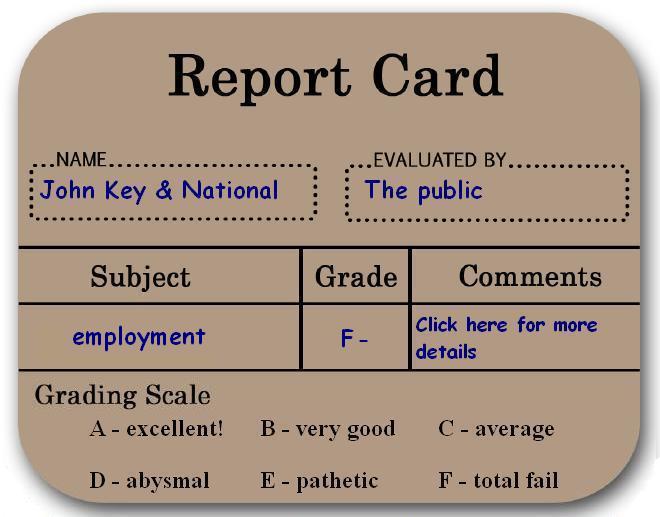
.
.
.
= fs =
Johnny’s Report Card – National Standards Assessment y/e 2012: crime
To Whom It May Concern; the following Report Card detail’s Johnny’s achievements over the last four years.
The following contrasts compare four years, ranging from the end of 2008 to the end of this year, 2012.
Whilst it is acknowledged that the Global Financial Crisis impacted harshly on our society and economy, it is also fair to say that National has had the benefits of starting out with a sound economy (surpluses, low unemployment, etc) in 2008 and four years in office to make good on it’s election promises.
.
Crime
.

.
The rhetoric
” We also need to ensure there is effective policing in all parts of our cities and in all areas of the country. We will not tolerate violence and antisocial behaviour. Under a National government, gangs will not be controlling neighbourhoods so posties can’t even deliver the daily mail.
The tragic events surrounding the parole of Graeme Burton show that Labour’s law and order policies seem to be based on the rights of criminals.
Let me say that under National, the parole system will be focused on protecting innocent Kiwis from hardened, unrepentant and dangerous criminals. Under any government I lead there will be no parole for repeat violent offenders.
We will do more than that to improve our criminal justice system, but for today let me send the clearest of messages. Those who break the laws of our society destroy the fabric of The Kiwi Way. No government I lead will put up with that. ” – John Key, 30 January 2007
See: The Kiwi Way: A Fair Go For All
Law and order is to National what environmentalism is to the Greens; it’s ‘raw meat’ for their conservative constituents – many of whom have little understanding nor interest in the root causes of crime. Poverty, unemployment; a growing wealth gap; hopelessness; alienation – these are inconceivable to many National supporters.
So Key and his National cronies, spin doctors, and Party strategists are on solid ground when it comes to this issue. Throw in a bit of beneficiary bashing…
“We also have a serious and growing problem with long-term welfare dependency.”
See: IBID
And a bit of brown bashing…
“I don’t think that’s necessary and I think my view is widely held by a lot of New Zealanders. If it was holding New Zealand back, sure we could arguably go and do that but that’s not where I see these things going. He can make any claims he likes. The Maori King entitled to a different view to mine, it doesn’t mean I’m culturally ignorant.
I don’t think it’s right. If someone wants to take that land grab, they can give it a go.“
See: Government could nationalise water – Key
… and the Nats are practically guaranteed the government. Never underestimate the casual racism of a significant sector of our society.
This racism plays into the hands of National who regularly tap such latent conservative streaks in our society for their own political agenda.
More rhetoric
“The Government is committed to keeping New Zealanders safe – on our streets and in our communities. We’ve delivered the lowest crime rate in 30 years, but we want to continue to keep driving the crime rate down.” – John Key, 3 July 2012
See: Prime Minister welcomes first action plan
Key has taken credit for a “drop” in crime on several occassions this year. But is he telling the truth? Telling lies? Or bending the truth and misrepresenting the facts to suit his Party’s agenda?
Let’s check the stats from NZ Police, shall we?
Crime trends for the year ending June 2008,
.

.
And crime trends up to 2012,
.

.
And guess what…?
The trends clearly show a gradual reduction of reported crime since 1996/97.
For Key to claim this as a “success” for his administration reminds us, yet again, that the man will bend the truth to suit his demands. Quite simply, the drop in crime has been ongoing for the last sixteen years and has little to do with Dear Leader and his Party’s policies.
Reported crime was also dropping druring the 2000-08 Labour-led government.
Will John Key take credit for that “success” as well?
Addendum
If, as data shows, and as Key has been crowing, crime has been steadily reducing since 1996, why is National committing to spending $300 million for a new prison at Wiri, South Auckland, and a further $540 million to operate and maintain? That is $840 million of our taxes that could be better invested in upgrading delapidated state houses and raising this country’s children out of poverty.
See: Fletcher signs $300m Wiri prison contract
Could it be that the motivation lies with providing a profitable Public-Private Partnerships (PPP) with Fletcher Building, Serco, Spotless Facility Services, John Laing, InfraRed, Accident Compensation Corporation, and Macquarie Capital? That’s nearly $1 billion going to private corporations for a prison we seem not to need.
Who sez crime doesn’t pay?
.
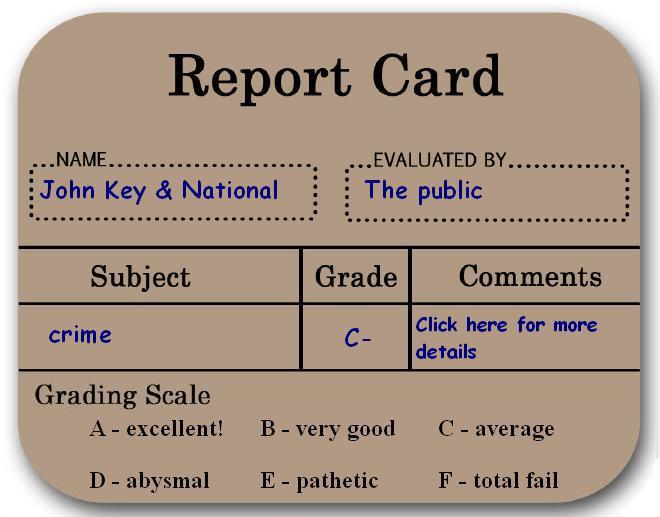
.
.
= fs =
National bleeding poll support…
.
.
The latest Roy Morgan poll has National continuing to fall in the polls.
The “dead cat bounce” previous rise – due mostly to redneck kneejerk reaction to Maori water claims – appears to have been only a temporary respite for this lame-duck administration.
The poll results,
National Party to 41.5% (down 2%) – 50 seats
Maori Party 1.5% (down 1%) – 3 seats?
ACT NZ 0.5% (unchanged) – 1 seat?
United Future 0.5% (up 0.5%) – 1 seat?
Total National-led coalition-bloc: 55 seats (?)
Support for Labour is 33.5% (up 0.5%) – 41 seats
Greens are 13.5% (up 2%) – 17 seats
New Zealand First 6.5% (up 1.5%) – 8 seats
Mana Party 0% – 1 seat
Total Labour-led coalition-bloc: 67 seats (?)
.
Without much doubt, National is on it’s way out – a two-term “government”.
The question is – how much damage will this inept, unfocused, “government” cause before they are thrown out at the next election?
At this point, the only thing we can look forward to is a by-election or a defection from the National-led coalition.
.
*
.
Sources
National Lead Labour, But Support Falls Lowest Since 2008
.
.
= fs =
“Spin me a conspiracy”, said Dear Leader!
.
.
In politics, there are several ways to discredit your opponant or critic;
- Humour
David Lange was the past-master of the one-liner riposte. His classic, “I can smell the uranium on your breath”, is now firmly ingrained in our culture.
- Attack Reputations
A favourite of Robert Muldoon, who had little reservation in undermining, or even destroying, a person’s reputation if they crossed him.
- Buy them off
Our best and most experienced journalists gave up their professions to join the Dark Side of politics, and become Press Secretaries and spin doctors for politicians, government departments, SOEs, and corporations.
Some of the most well-known media names from the ’80s, ’90s, and ’00s now work for employers who do not want the public truthfully informed on certain matters.
- Deride & Dismiss
If you can successfully paint your critic or political opponant as a “loony”, incompetant, naive, or possessing some other faulty character-trait, then you may persuade the public not to listen to them.
The Right deride the Greens as “tree hugging socialists” – and other epithets – when attacking their policies. Even when said policies are clearly delineated and sheer common sense – the derision and dismissive retorts are by now an automatic kneejerk from the Right. No thought required.
- Off to the Gulag!
Very popular with the old USSR, and still in heavy usage in the last remaining Stalinist regime in North Korea. The Chinese have their own Labour Camps (prisons) for their political prisoners. And even the United States – the Land of the Free – has their own dirty little ‘secret’ at Guantanamo Bay in Cuba.
Probably not feasible for dear little New Zealand… yet.
.
*
.
National’s tax-payer funded spin doctors have been working overtime this year on new angles for their Ministerial Masters to use to dismiss the growing clamour of criticism against their policies, and more increasingly, criticism of John Key’s style of leadership.
With National dropping in the polls and Key’s popularity not what it once was, it is fairly obvious that critics are starting to hit home – and the Tory hierarchy is worried.
One response has been the Deride & Dismiss tactic.
Increasingly, Dear Leader and his ministers have taken to referring to critics and political opponants as “conspiracy theorists” – a jibe designed to make someone appear to be on the fringe of politics; slightly unstable; not thinking rationally; and espousing ideas unsupported by facts.
It’s like suggesting that your opponant or critics believes in fairy tales. And it’s becoming more and more common,
.
“Mr Key is rejecting all their allegations.
“It went through the normal tendering process, Sky City was the only bidder prepared to look at a deal that didn’t involve government resources. They can run around as much as they like looking for conspiracies but they’re never going to find one”. ” – John Key, MSN News, 19 April, 2012
.
“ But despite the paper, he denied there was any connection between him calling off the business case and SkyCity indicating it was considering extending its centre. “Not despite your wildest conspiracies, no,” he said. ” – Dominion Post, 24 April 2012
.
“But I would say it’s a really positive thing to do. You can make a difference. And it’s like the convention centre. People want to chase their tails in conspiracies. There is no conspiracy. The conspiracy is we haven’t had a convention centre for decades. We will get 160,000 visitor-nights. They will spend roughly twice as much as everybody else. The Government has got no money to pour into it.” – John Key, The Listener, 23 June 2012
.
“There is no conspiracy here. There’s a failure by an individual, there’s a cock-up, but there’s not a conspiracy.” [re, GCSB] – John Key, TV3, 29 September 2012
.
“Yeah the conspiracy theorists won’t like it they’ll be on TV tonight saying ‘yeah you know Dotcom’ and all this sort of carry on but they live in fantasy land.” – John Key, TV3, 1 October 2012
“There’ll always be conspiracy theorists out there but I’m interested in jobs, not people who live in Fantasyland and want to make things up.” – John Key, Fairfax media, 2 October 2012
” Meanwhile Mr Key is writing off the concerns around Dotcom as “conspiracy theories”.
“I’d caution New Zealanders not to buy into conspiracy theories too much,” he says. ” – John Key, TV3, 4 October 2012
Even Fran O’Sullivan, NZ Herald columnist and bearer of the Honorary Captain Key De-Coder Ring, joined in to support National’s spin-dictoring.
“The conspiracy allegations against Key are over-egged.” – Fran O’Sullivan, NZ Herald, 3 October 2011
As these quotes show, Key has been using the “conspiracy” pejorative as often as he can get away with it.
Without indulging in conspiracy theories, one could almost come to the conclusion that “Conspiracy” and “conspiracy theorists” are the magic words in 2012 – as determined by National’s back-room spin doctors. These guys have been racking up serious over-time to create the right things for Key and other National ministers to say.
Anyone criticising Dear Leader is engaging in “conspiracies” and accusations against National are “conspiracy theories”.
Got that?
Good.
Otherwise it’s off to the Gulag for you!
Meanwhile, here is one example of pre-scripted spin being delivered incompetantly, by an incompetant Minister. Listen and weep, for our taxes are paying for this woman’s salary,
.
[click on image to link to TV3 video]
.
.
= fs =
Polls, Rogue Polls, and Damned Rogue Polls!
.
.
Two previous polls this month showed a slight increase for National, and a small corresponding drop for Labour,
National – 47.9% (+0.45)
Labour – 32% (-2%)
Greens – 10.7% (+1.6%)
NZ First – 5.5% (+1.1%)
ACT – Dog tucker
Source: Herad Digipoll 11 September 2012
National – 46.5% (+2%)
Labour – 31% (-1%)
Greens – 12.5% (-2%)
NZ First – 4.5% (-0.5%)
ACT – still dog tucker – with biscuits thrown in
Source: Roy Morgan 13 September 2012
Which makes a recent TVNZ/Colmar Brunton Poll somewhat odd, as it appears to break the trends shown in the above two polls,
National – 45% (-3%)
Labour – 34% (+2%)
Greens – 12.0% (n/c)
NZ First – 2.0% (-1%)
ACT – dessert, leftover humble pie
Source: Labour makes gains on National – poll 23 September 2012
So two polls show National tracking up – and one shows the same Party dropping. Which is correct? Which is the ‘rogue poll’?
This blogger opts for the latter, the TVNZ/Colmar Brunton Poll.
With National’s recent strategy to paint Maori water claims as “greedy” and maintaining that “no one owns the water” (as opposed to coal, oil, and gas being sold to power thermal electricity generation) ; and Bennett’s relentless beneficiary-bashing proceeding at Warp Factor 9 – it is hardly surprising that the Nats are rising in the polls.
This is the same dog-whistle politics which Don Brash used during his stint as leader of Labour Greens ACT Mickey Mouse Party the National Party (finally got the right one – hard to keep track of The Don, these days) in January 2004 during his infamous “Orewa Speech”.
The racists and low information voters loved it. Whether bashing the “lazy druggie benes” or bashing the “lazy greedy Mow-ries” – National and ACT know they can always rely on exploiting this country’s latent prejudices to secure some increased electoral support.
The Nats enjoyed a stunning 17% meteoric rise in the polls in 2004, thanks to Brash’s odious speech, that would’ve made a certain German Corporal proud.
The TVNZ/Colmar Brunton Poll is definitely rogue.
It is too early for the punters to cotton on to the fact that National Party strategists, beavering away in their little dens on the Beehive’s Ninth Floor (or basement dungeon, or where ever Key keeps his Orc-ish minions) are conning them Big Time. Diversion and distraction – the oldest game in the political book to keep the Middle Classes from realising that National is failing to rev up the economy and unemployment is on the rise.
I am reminded of playing with kitty cat with a bit of string…
It works similar with the Middle Classes. But instead of string, use bene-baiting or “standing up to dem Mow-ries“. Guaranteed to work.
This blogger still believes that we are in line for a change in government come 2014 (or earlier). Eventually, the Middle Classes tire of hearing the unemployed, solo-mums (but never solo-dads), Maori, etc, demonised and begin to realise that National has nothing positive to offer.
That is when people realise that the Emporer has no clothes. *ick*
.
*
.
Addendum
As a side issue…
Colmar Brunton brags on its website that it ” is delighted that the One News Colmar Brunton Poll is noted as the poll that most closely predicted the 2011 election “.
According to their own data, they are nothing of the sort. In fact, Roy Morgan achieved closer Party polling than Colmar did. The closest polling figures to actual Election Night voting results are marked in red,
.
.
Colmar Brunton got four results closer to Election Night with scores for the Conservative Party, Labour, Greens, and Mana.
Roy Morgan got five scores closer to Election Night; National, ACT, United Future, Maori, and NZ First.
If you’re going to brag that you do a better job than your competitors, it might be a good idea to back it up with real evidence. (At least 50% of respondents agree with that assertion… )
Interestingly, Colmar Brunton generally got it right with the opposition parties (except for Conservatives) whilst Roy Morgan generally got it right with the government coalition parties (except for NZ First).
.
*
.
Previous related blogposts
As predictable as the rising sun (11 Sept)
Poll shows gain for National’s ‘dog whistle’ politics (18 Sept)
.
.
= fs =
National – the Party of free speech?! Yeah, right.
.
.
Around 8pm on 13 September, this blogger posted on National’s Facebook page – see: NZNATS. I left a message leaving links to two of my recent blogposts,
- National ramps up attack on unemployed and solo-mums
- National ramps up attack on unemployed and solo-mums (part rua)
They must not’ve like the message nor my questions. The post I made vanished within minutes. No explanation offered by the operators of that FB page.
I left a comment querying the disappearance of my posting,
.
.
That was gone under sixty seconds,
.
.
One more try.
This post referred to National party policies regarding unemployed, solo-mums, and other beneficiaries. A pertinent topic worthy of debate, I thought?
.
.
The result? Another disappearance,
.
.
It seems that National is not a Party that brooks dissent or welcomes questioning of it’s policies. This is symptomatic of a Party that has lost trust in the public and fears people.
The term for this state of affairs, I believe, is a seige mentality.
.
.
= fs =
John Key’s “Bright New Future”…
.
.
.
.
.
Not going too well is it, Dear Leader?
Feel free to abandon your neo-liberal policies on Market-driven job creation.
Now’s good.
.
*
.
Addendum
This blogger wonders how National’s welfare “reforms” are going to create new jobs for redundant workers?
Wouldn’t it make more sense to focus on job creation – rather than tinkering with a welfare system that is not the root cause of the problem?
Will Bennett insist that redundant workers from Tiwai Pt aluminium smelter, Spring Creek mine, and elsewhere, be drug-tested?
And is this the best that National can offer us?!
.
.
= fs =
The more things change…
.
From 1999, the final year of the Shipley-led National government…
.
Source: Otago Daily Times
.
To 2012 – some thirteen years later – and now led by a smiling, waving shark from the commercial sector that kindly gave us the Global Financial Crisis and fifteen million unemployed, worldwide,
.
.
Some things that we can always rely on, when National is elected into power; poverty will worsen; unemployment remains high; taxes will be cut for the rich, and welfare beneficiaries – the victims of National’s policies – will cop the blame.
Eventually, the realities of National’s mis-management filters through to the television-distracted middle classes and a mixture of guilt and fear prompts them to switch their votes from the Tories to Labour/Greens/NZ First.
Thus it was in the 1990s – and thus it will be in 2014 (if not earlier).
In the meantime, while it takes umpteen bad news-stories to awaken the TV-addled brains of baby-boomers, we continue to waste lives and the locked-in potential of people trapped in poverty, unemployment, and a stagnant economy. Child poverty remains New Zealand’s dirty little secret, to the rest of the world.
For National and their rabid ACT supporters, the fault lies elsewhere,
See: Poor better off than before: Kerr
See: Where is welfare policy heading : Muriel Newman
The Right is very ‘big’ on personal responsibility. Except when it comes to failed Right Wing policies. Then it’s someone elses’ fault.
Meanwhile, the real bludgers in our society continue to live their lives, enjoying the fruits of a developed nation, but not paying their fair share of taxes,
.
.
One of the constant refrains of the neo-liberal establishment and sycophants for the rich & powerful is that New Zealand society cannot afford things like decent housing and school meals for our children.
Of course not.
When the rich are not paying their fair share, they are denying society of the means to address poverty-related issues. At the same time, they enjoy living in a society built up with the taxes paid by others.
That’s bludging.
See previous blogpost: Greed is good?
In the meantime, our society income/wealth gap widens and we move further and further away from any notion of egalitariansism we once had.
If that’s the sort of society New Zealanders want, then let’s be 100% up-front and honest about it. Let’s prepare ourselves for outbreaks of disease; increased crime; drugs; beggars in the streets; and eventual outbreaks of mass violence.
See: England riots: was poverty a factor?
I doubt, though, that Middle New Zealand could stomach an overtly class/wealth-stratified society – especially if poverty becomes so entrenched that it becomes more visible and inescapable. We prefer our poor to be out-of-sight and out-of-mind, so we can focus on who is going to win “The Block” or “The Voice” or “The Whateverthefucktelevisionisdishinguptoustotakeourmindsofreality“.
As long as Middle New Zealand is prepared to accept such a bleak future, then the rest of us can plan and prepare accordingly.
.
.
Or, we can turn our backs on that vision, and instead look elsewhere for inspiration.
The Scandinavians and French may be a good start.
Or are we, as a nation, so gullible and thick that we keep going around in circles, decade after decade?
.
*
.
Additional
Baby boomers clogging the job market
.
.
= fs =

